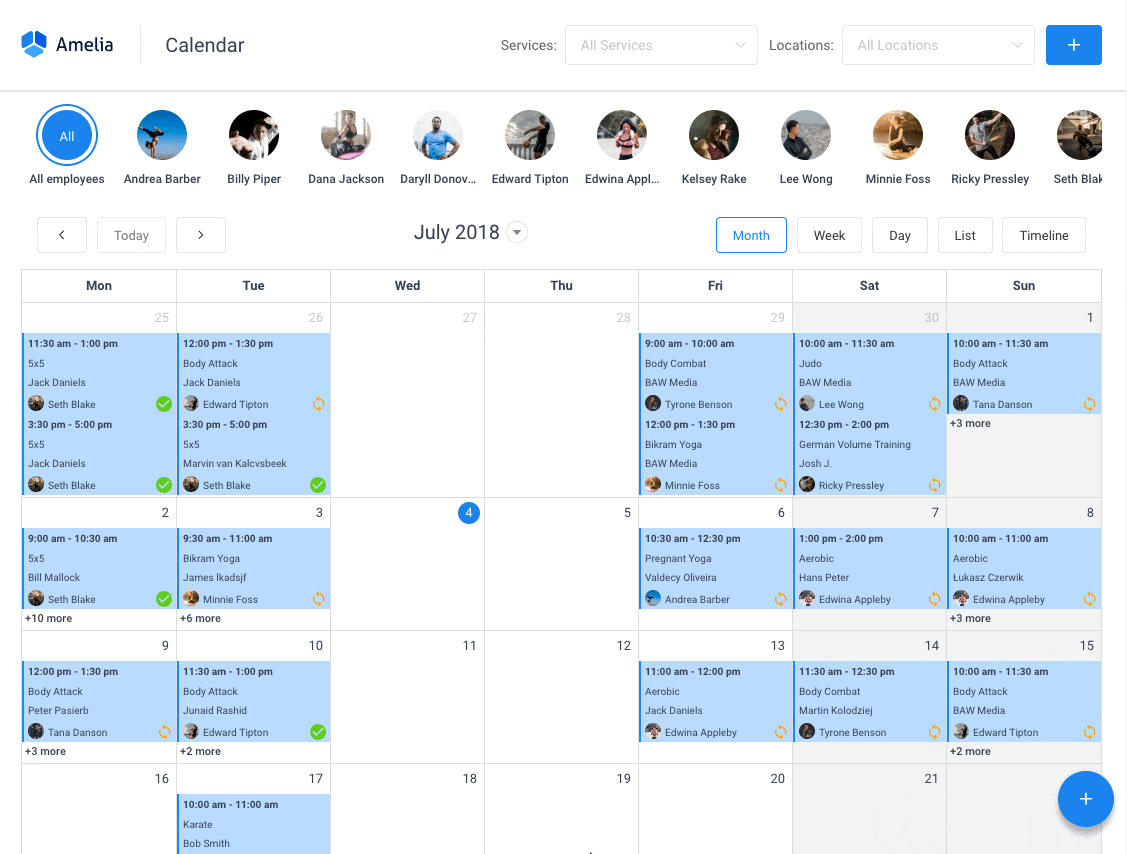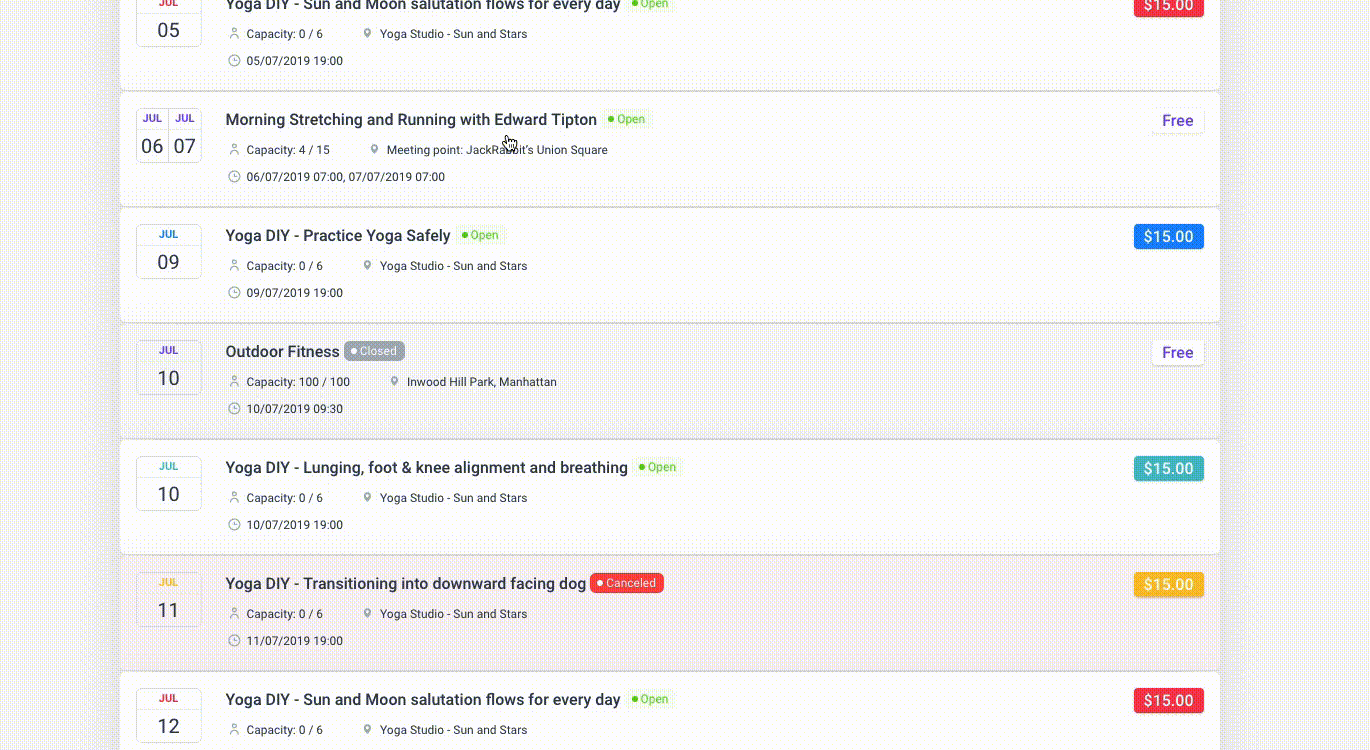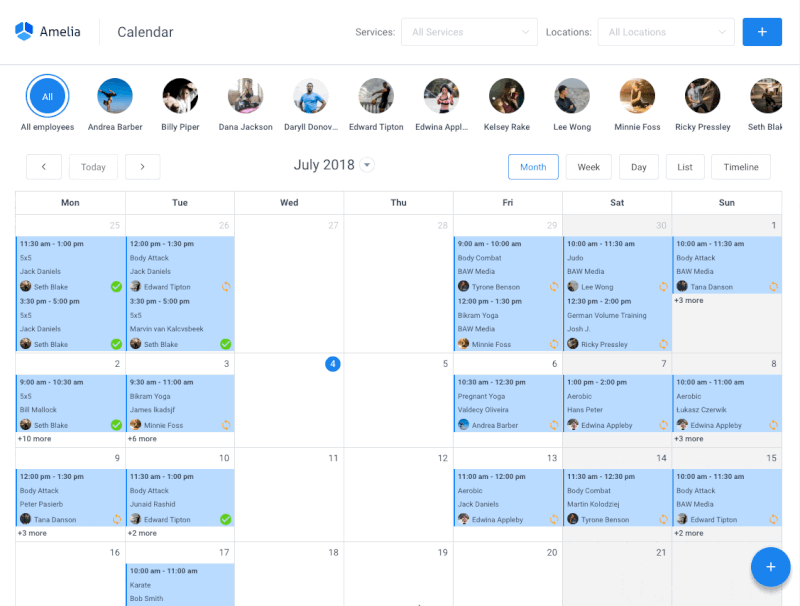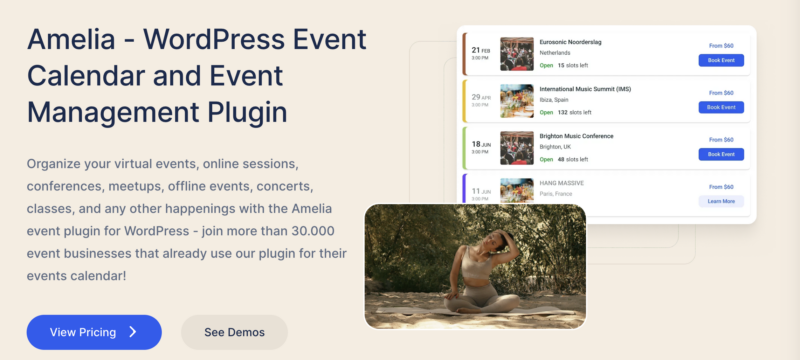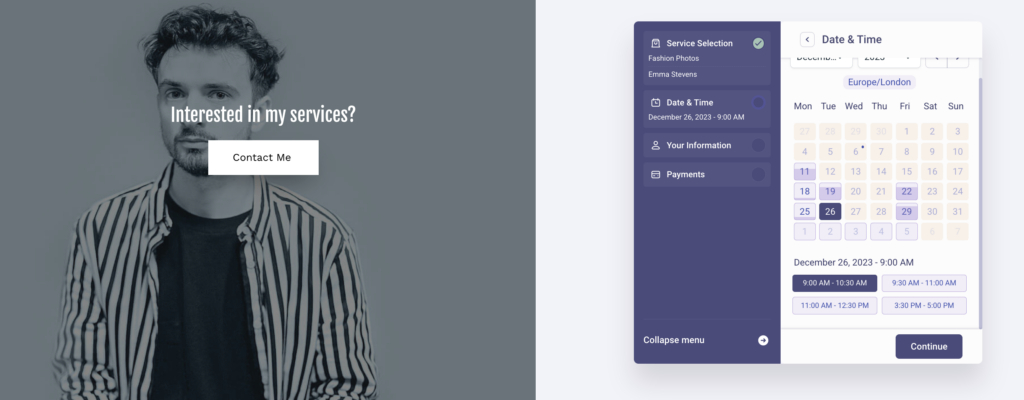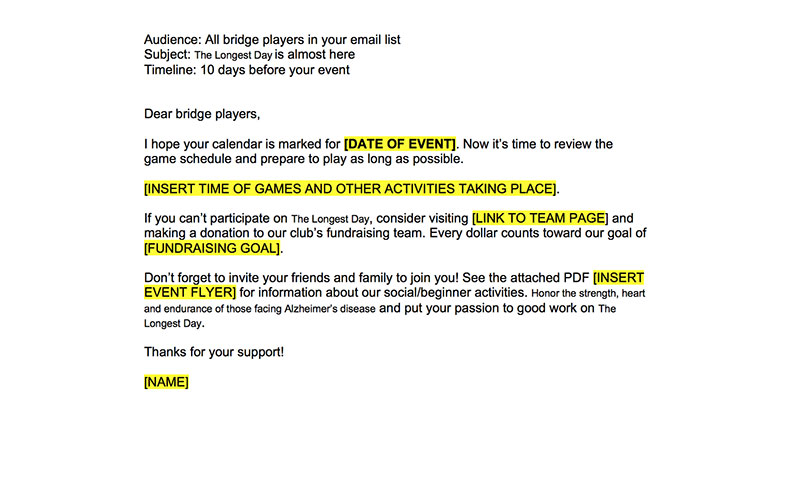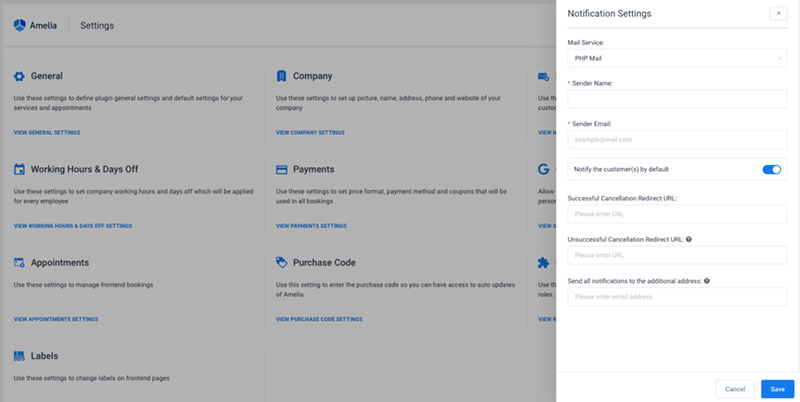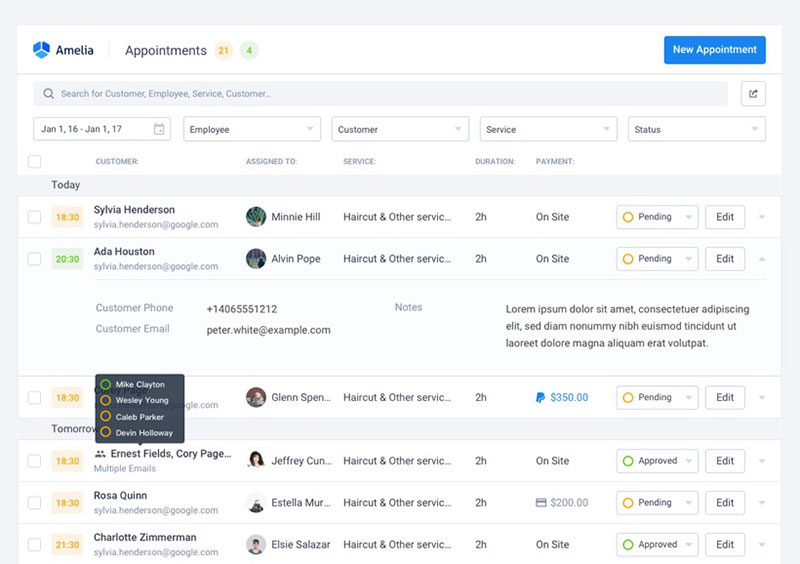The post 5 Stages of Event Planning: A Roadmap to Succesful Event appeared first on Amelia WordPress Booking Plugin.
]]>
Let’s explore how to make the most out of each event planning stage, starting with the foundational step – defining the purpose and scope of the event.
#1 Stage of Event Planning – Purpose and Scope of the Event
At the outset, the event’s purpose and scope lay the groundwork for the entire planning process.
This initial event planning stage involves ideation sessions to clarify objectives, identify target audiences, and outline the event’s overarching goals. Whether it’s a corporate conference, wedding celebration, or community gathering, defining these fundamental aspects shapes the subsequent stages of event planning.
Here’s a guide on how to define the purpose and scope of an event:
Clarify organizational goals
Begin by understanding the broader goals and objectives of the organization or stakeholders hosting the event. Align the event’s purpose with these overarching goals to ensure cohesion.
Questions you should ask yourself at this stage of event planning are:
What are the primary goals and objectives of the event?
What specific outcomes do we want to achieve?
You should also identify and engage with key stakeholders, including sponsors, partners, and decision-makers. It’s important to understand their expectations and desired outcomes for the event.
Determine the type of event
Clearly define the type of event you are planning. Is it a conference, seminar, product launch, fundraiser, or social gathering? The nature of the event will influence its purpose and scope. Here are some questions that will guide you through this stage of event planning:
What type of event are we planning (e.g., conference, workshop, networking event)?
Should the event have a specific theme or format?
Once you’re done, it’s time to define the primary goal or objective of the event. This could be to launch a new product, educate attendees, raise funds for a cause, or foster networking among participants.
Identify target audience
It’s crucial to determine the target audience for the event. We also advise you to create a whole target avatar because understanding the demographics, interests, and needs of the attendees will help shape the purpose and content of the event.
One of the most important questions you should ask yourself is:
Who is the target audience for the event?
What are the demographics, interests, and needs of the attendees?
Focus on attendee experience
Envision the experience you want attendees to have. Whether it’s an educational, entertaining, or networking-focused event, understanding the desired experience helps define the event’s purpose.
What kind of experience do we want attendees to have?
How can we make the event memorable for participants?
How can we encourage attendee engagement and participation?
What interactive elements can be incorporated into the event?
Set measurable objectives
Establish measurable objectives that align with the event’s purpose. These objectives should be specific, measurable, achievable, relevant, and time-bound (SMART).
For example, target a certain number of attendees or achieve a specific fundraising goal.
Define event theme and message
To strengthen your goals and attendee experience, it’s important to develop a central theme or message that encapsulates the purpose of the event. This theme will guide the overall branding, content, and communication strategies.
Should the event have a specific theme or branding?
How can the theme align with the event’s purpose and resonate with the audience?
Document purpose and scope
Compile all the information gathered into a comprehensive document that clearly outlines the purpose, goals, objectives, and scope of the event. Share this document with the planning team and stakeholders for alignment.
#2 Stage of Event Planning – Logistics
Once you establish the purpose and scope, the focus shifts to meticulous planning and logistics.
This event planning stage involves creating a comprehensive event plan, detailing timelines, budgets, and resource requirements. Navigating through the details of securing permits, choosing vendors, and coordinating logistics lays a solid foundation for the upcoming event.
Here are some strategies to ensure smooth planning and logistics execution:
Develop a detailed event plan
- Create a comprehensive event plan that outlines all tasks and responsibilities.
- Include timelines, deadlines, and dependencies to provide a clear roadmap for the planning process.
Budgeting and resource allocation
Develop a realistic budget that covers all aspects of the event, including venue, catering, technology, marketing, and miscellaneous expenses. If you don’t have all the resources at your disposal, allocate resources based on priority and importance to the event’s overall success.
Remember, the available budget will influence the scale, features, and logistics of the event, helping to define its scope. You need answers to these questions to make this event planning stage successful:
What is the budget for the event?
How can we maximize value within budget constraints?
Coordinating vendors and suppliers
At this point, you should identify and secure reliable vendors and suppliers for catering, audio-visual equipment, decorations, etc.
It’s important to clearly communicate expectations, deadlines, and specifications to vendors.
Obtain necessary permits and permissions
- Research and obtain all required permits and permissions for the event.
- Ensure compliance with local regulations and laws related to events.
Develop a contingency plan
With all these things in place, you can already anticipate potential challenges and develop a contingency plan to address unforeseen issues.
The most important things to consider are backup options for critical elements like venues, speakers, and equipment.
What potential challenges could arise, and how can we address them?
What should be included in our contingency plan?
Technology integration for registrations
Why would you do it yourself when there are perfectly capable software solutions that can help you?
Leverage technology for efficient planning and execution, including event management solutions, registration systems, and communication tools.
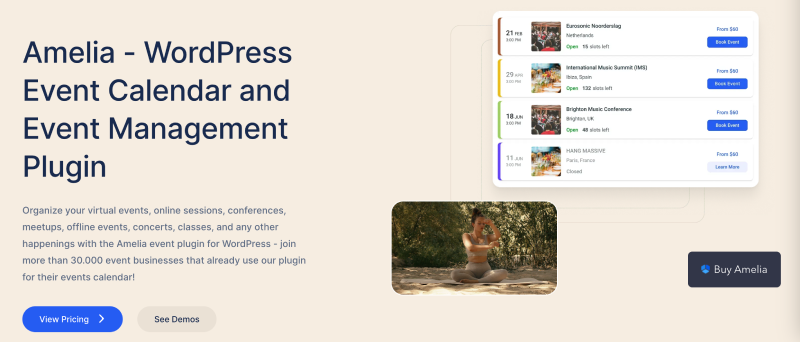
Organizing a successful event requires a reliable and efficient event management solution, and Amelia stands out as the go-to plugin for WordPress. With over 30,000 event businesses already benefiting from its features, Amelia is a top-tier event calendar and management plugin. It simplifies the organization of virtual and offline events, conferences, meetups, concerts, and more. What sets Amelia apart is its responsive and customizable design, catering to various event types such as conferences, yoga sessions, training, and even dog shows.
Why choose Amelia?
Amelia’s flexibility shines through its diverse features, including:
- The ability to set up recurring events,
- Create customizable booking forms, and
- Facilitate deposit payments for on-site events.
The plugin supports multilingual events, enabling organizers to offer a booking experience in different languages. Event planners can easily implement dynamic ticketing, setting different prices based on attendee profiles or purchase dates.
The plugin also provides convenient filtering and sorting options, making navigation straightforward for both organizers and attendees.
One of Amelia’s standout features is its seamless integration with Google Calendar and Outlook, ensuring hosts and attendees stay informed about upcoming events.
Amelia’s commitment to user-friendly interfaces, automated customer notifications, custom fields, and a simple admin panel makes it a valuable asset for event organizers. The plugin’s efficiency is evident in its ability to streamline the event management process, from creating and tracking tickets to managing cancellations and reminders.
Amelia not only modernizes the event booking experience but also enhances interactions between customers and organizers.
It reduces administrative burdens, allowing event managers to focus on organizing memorable events. With its constant updates, integration capabilities, and support for virtual sessions, Amelia is the comprehensive solution for event agencies and hosts looking to take their events to the next level.
It’s important to test all technology solutions in advance to identify and address any issues.
That’s why we’re providing you with Demos you can test out and see whether Amelia satisfies your event planning needs!
And once you realize it does, choose the plan that suits your needs best!
Create a timeline and task list
Here is everything you need to do at this stage of the event planning process:
- Develop a detailed timeline that includes all planning and logistics tasks.
- Break down tasks into manageable components and assign responsibilities to specific team members.
- Assign on-site coordinators to oversee different areas of the event, such as registration, catering, and technical support.
- Establish a central command or communication center for real-time updates.
- Visit the event venue before the actual date to familiarize yourself with the layout.
- Identify potential logistical challenges and plan accordingly.
- Train staff and volunteers on their roles and responsibilities.
- Ensure that everyone is familiar with the event plan, emergency procedures, and customer service expectations.
#3 Stage of Event Planning – Marketing and Promotion
With the roadmap in place, attention turns to marketing and promotion. Crafting a strategic marketing plan involves leveraging various channels to build anticipation and engage the target audience. Compelling content, social media campaigns, and effective ticketing systems play a vital role in creating buzz and ensuring maximum attendance.
We’ve prepared a comprehensive marketing plan for an event. You can adjust and customize the plan based on your specific event details, goals, and target audience.
Develop a Unique Selling Proposition (USP)
Based on the target audience and goals you’ve created in the previous stages of event planning, you should develop a unique selling proposition. Your USP should:
- Clearly articulate what makes your event unique and why attendees should participate.
- Highlight key features, speakers, or experiences that set your event apart.
Create a brand identity
- Design a compelling event logo and branding that reflects the theme and purpose.
- Ensure consistent branding across all marketing materials.
Build an event website
Create a dedicated event website with essential details: date, time, venue, agenda, speakers, and registration information. WordPress is one of the best solutions for event websites, and by installing Amelia as an event management plugin you’ll get 90% of the job done!
Develop a content marketing plan
There are two things you have to nail here:
- Create and share valuable content related to your event through blog posts, articles, videos, and social media.
- Establish a content calendar to maintain a consistent posting schedule.

Image by vectorjuice on Freepik
Utilize social media and influencer marketing
- Identify the most relevant social media platforms for your audience.
- Develop a social media calendar and share engaging content, including event teasers, behind-the-scenes footage, and speaker highlights.
- Identify influencers or thought leaders in your industry.
- Collaborate with influencers for endorsements, guest appearances, or social media takeovers.
Email marketing campaigns
- Segment your email list based on audience demographics and interests.
- Craft personalized and compelling email campaigns, including event invitations, updates, and reminders.
Paid advertising
- Invest in paid advertising on platforms like Google Ads and social media.
- Set up targeted campaigns based on demographics, interests, and behaviors.
Pro tip: Your customer avatar from the previous stage of event planning will immensely help you with paid advertising.
Other marketing ideas for events:
- Develop a press release and media kit.
- Reach out to relevant media outlets for event coverage.
- List your event on popular event listing platforms and online calendars.
- Implement a referral program to encourage attendees to refer friends and colleagues.
- Create a sense of urgency by offering early bird discounts and promotions for early registrations.
Reminder – with Amelia’s event management plugin you can utilize dynamic ticketing and easily offer early bird discounts.
Check out plans and seamlessly coordinate your whole event planning process.
#4 Stage of Event Planning – Execution
As the event day arrives, the focus shifts to flawless execution. On-site logistics and coordination become crucial, ensuring that everything runs smoothly. This stage of event planning involves handling unforeseen challenges, maintaining open communication among team members, and respecting the event schedule.
Create a detailed timeline
Develop a comprehensive timeline that outlines all tasks leading up to and during the event. This includes setup, registration, speaker sessions, breaks, and teardown. Distribute the timeline to all team members and stakeholders to ensure everyone is on the same page.
Establish clear roles and responsibilities
Clearly define roles and responsibilities for each team member. Designate specific individuals to oversee key areas such as logistics, registration, technology, and guest services. This helps streamline communication and ensures accountability.
Conduct pre-event rehearsals
Run through key aspects of the event with the team in a simulated environment. This includes testing equipment, practicing presentations, and rehearsing emergency procedures. Rehearsals help identify potential issues and ensure that everyone is familiar with their responsibilities.
Communication plan
Establish a robust communication plan to facilitate real-time updates and quick responses to any issues. Use communication tools like radios, messaging apps, or event management software to keep the team connected. Clearly define communication channels and protocols.
Monitor and manage crowd flow
Implement crowd management strategies to avoid congestion and ensure a smooth flow of attendees. Use signage, ushers, and designated pathways to guide participants throughout the venue. Proactively address any bottlenecks or crowded areas.
Provide excellent guest services
Prioritize guest satisfaction by offering excellent customer service. Train staff to be friendly, approachable, and responsive to attendee needs. Establish information booths or help desks to assist participants with queries or concerns.
Capture and analyze data in real-time
Use technology to capture and analyze data in real-time during the event. This includes attendance numbers, session engagement, and participant feedback. Real-time data allows for quick adjustments and insights that can be valuable for future events. And it will help you with the next and final stage of event planning.
#5 Stage of Event Planning – Post-Event Evaluation
Following the event, the final stage involves a thorough evaluation and analysis. Gathering feedback from attendees and stakeholders provides valuable insights into the event’s success.
Assessing achievements against predetermined objectives, identifying areas for improvement, and documenting lessons learned contribute to continuous improvement for future event planning endeavors.
- Actively seek feedback from event attendees through surveys or feedback forms. Ask specific questions about their overall experience, the relevance of content, satisfaction with logistics, and any suggestions for improvement. Provide both quantitative (rating scales) and qualitative (open-ended questions) options for a well-rounded understanding.
- Take another look at the event’s initial objectives and evaluate how well you’ve accomplished them. Identify areas of success and any deviations from the intended outcomes. This comparison helps in understanding the overall impact of the event.
- Define and analyze relevant KPIs based on the nature of the event. Metrics could include attendance numbers, engagement rates, social media interactions, and conversion rates. Evaluate these metrics against pre-established benchmarks or industry standards.
- Evaluate the effectiveness of event technology, registration processes, and communication channels. Identify any technological glitches that may have impacted the attendee experience. Explore ways to enhance these aspects for future events.
Ask yourself these questions:
How can we continue engagement with attendees after the event?
What post-event surveys or follow-up activities should we implement?
And you’ll be even better prepared for your next event! Plus, you’ll increase customer lifetime value by staying in touch with them and achieving the long-term goals of the event.
The post 5 Stages of Event Planning: A Roadmap to Succesful Event appeared first on Amelia WordPress Booking Plugin.
]]>The post Writing Event Planning Business Plan: Step-by-Step Guide appeared first on Amelia WordPress Booking Plugin.
]]>
And don’t worry – an event planning business plan isn’t just for those who’re just starting their event planning business. It’s also for those who want to avoid business risks, explore better opportunities, and build trust with their clients on a deeper level. If some of these things describe your event planning business, let’s discover the essentials of your business plan and how to develop one yourself.
Why Event Planning Business Plan Matters
A well-thought-out event planning business plan is crucial for several reasons, and it can empower entrepreneurs in the event planning industry such as yourself to achieve a variety of objectives. Here’s why it matters and what you as an event planning business owner will achieve with a solid business plan:
- A business plan serves as a roadmap for your event planning business. It outlines your goals, strategies, and the steps you need to take to achieve success.
- You’ll use the plan as a guiding document to stay focused on your objectives and navigate the complexities of the event planning industry.
- Investors and lenders often require a detailed business plan before considering any financial support.
- An event planning business plan showcases the viability and potential profitability of your business, attracting investors and securing funding.
- The process of creating an event planning business plan encourages you to thoroughly analyze their market, competitors, and target audience.
- Once you’ve gone through that process, you’ll make informed decisions based on this analysis, adapt strategies to changing market conditions, and maximize opportunities.
- A well-crafted event planning business plan allows you to clearly articulate your unique selling propositions (USPs) and competitive advantages.
- Use these differentiators to stand out in a crowded market, attract clients, and establish a strong brand presence.
- Financial projections included in the business plan provide a clear picture of revenue, expenses, and potential profits.
- Entrepreneurs can use this financial data to manage their resources effectively, make budgetary decisions, and ensure the financial health of their event planning business.
- The marketing and sales strategies outlined in the business plan help your event planning business to define its target audience and communicate its brand message.
- You’ll leverage the event planning business plan to implement effective marketing campaigns, build brand awareness, and attract clients.
- The business plan includes a risk analysis, identifying potential challenges, and outlining mitigation strategies.
- Instead of waiting, you can proactively address risks, enhancing the resilience of your event planning business and ensuring continuity in the face of unforeseen challenges.
- Sharing a comprehensive business plan with potential clients demonstrates professionalism and transparency.
- Entrepreneurs can use the plan to build trust with clients, assuring them of their capabilities and commitment to delivering successful events.
The Essential Elements of Successful Event Planning Business Plan
Before you get overwhelmed with all the different terms and instructions, let me assure you that writing an event planning business plan is easier than it seems. Let’s start with baby steps to go over the essential elements of a successful event planning business plan, and continue with learning how to write each of these sections for your business.
- Executive Summary
- Company Description
- Services You Offer
- Target Market
- Event Planning Market Analysis
- Marketing & Sales Strategy
- Operational Plan
- Team Structure
- Financial Projections
- SWOT Analysis
- Legal Structure
- Funding Request (if applicable)
- Appendix
How to Write an Event Planning Business Plan?
There are exactly 13 steps that separate you from your event management business plan.
Each of these steps is a separate section in the plan, and we’ve got you covered with actionable tips and examples on how to write each one. We recommend you start taking notes and working on your event planning business plan along with reading further.
1. Writing Executive Summary for Event Management Business Plan
Writing an effective executive summary for your event planning business plan is crucial, as it’s the first section potential investors or partners will read. But don’t get it twisted – the executive summary is actually the section you’ll finish at the end. The executive summary should provide a concise overview of your business and its key elements.
It’s basically a snapshot of your entire business plan, so make every word count.

Image by vectorjuice on Freepik
It should entice readers to explore the details while providing a clear understanding of the value your event planning business brings to the market.
And how do you write an executive summary for an event management business plan? We’ve prepared a step-by-step guide and an example!
-
Start with a strong opening
Begin with a compelling and concise introduction that grabs the reader’s attention. Clearly state the purpose of your business plan and briefly mention your mission or vision for the event planning business.
-
Provide a brief overview of your business
Offer a snapshot of your event planning business, including its name, location, and the types of events you specialize in. Highlight any unique aspects of your business that set you apart from competitors.
-
Articulate your unique selling proposition (USP)
Clearly define what makes your event planning business unique and why clients should choose your services. Emphasize any innovative approaches, special expertise, or exclusive services you offer.
-
Outline your key objectives
Concisely list the main objectives and goals of your event planning business. Keep these goals specific, measurable, and aligned with the overall vision of your business.
-
Describe your target market
Provide a brief overview of your target audience, including demographics and preferences. Highlight any niche markets or specific industries you plan to focus on.
-
Introduce your team
Briefly introduce key members of your event planning team, emphasizing their relevant skills and experience. Highlight any unique qualifications that make your team well-suited for event planning success.
-
Mention key achievements or milestones
If your event planning business has achieved notable milestones or garnered recognition, mention them briefly. This adds credibility and demonstrates your business’s track record.
-
Summarize your financial projections
Provide a high-level overview of your financial projections, including revenue expectations and growth forecasts. Highlight key financial metrics that showcase the profitability of your event planning business.
-
Include a call to action
End the executive summary with a call to action, indicating what you’re seeking from the reader (investment, partnership, etc.). Encourage further exploration of the full business plan.
Executive summary for event planning business plan example:
Executive Summary: XYZ Events
- Introduction:
XYZ Events is a dynamic and innovative event planning company located in [City, State]. With a passion for creating unforgettable experiences, we specialize in crafting seamless and unique events that leave a lasting impression. Our mission is to exceed client expectations by delivering exceptional events that reflect their vision and style.
- Key Business Information:
Founded in [Year], XYZ Events has quickly established itself as a leader in the event planning industry. We are proud to offer a comprehensive suite of services, including corporate events, weddings, and social gatherings. Our team of experienced event planners is committed to turning every client’s vision into a reality, providing meticulous attention to detail and unparalleled creativity.
- Unique Selling Proposition (USP):
What sets XYZ Events apart is our innovative approach to event planning. We leverage cutting-edge technology to enhance the planning process and create immersive experiences for our clients. Our team combines creativity with strategic thinking, ensuring that each event not only meets but exceeds expectations. Whether it’s a corporate conference, a dream wedding, or a milestone celebration, XYZ Events brings a fresh and personalized touch to every occasion.
- Objectives:
XYZ Events is poised for strategic growth over the next three years. Our primary objectives include expanding our client base, increasing revenue by 25%, and establishing key partnerships within the hospitality and entertainment industries. We are committed to maintaining our reputation for excellence while embracing new opportunities for innovation and growth.
- Target Market:
Our target market includes corporate clients seeking professional event management, couples looking for a stress-free wedding planning experience, and individuals hosting social events. We understand the unique needs of each segment and tailor our services to create memorable and impactful events.
- Team:
Led by [Founder/CEO], our team comprises seasoned event planners, designers, and coordinators with a proven track record of success. Our diverse skill set allows us to approach each event with creativity and expertise, ensuring a seamless and enjoyable experience for our clients.
- Financial Projections:
XYZ Events anticipates steady growth, with projected revenue of $[Amount] in the first year and a cumulative growth rate of 20% over the next three years. Our financial projections are based on a comprehensive market analysis and a strong understanding of industry trends.
- Call to Action:
We invite you to explore the detailed business plan to discover how XYZ Events plans to revolutionize the event planning landscape. Whether you’re an investor, potential client, or industry partner, we welcome the opportunity to collaborate and create exceptional experiences together.
XYZ Events is not just an event planning company; we are architects of unforgettable moments. Join us in shaping the future of event experiences.
2. Company Description
Company description exists in your event management business plan to provide an overview of your business, its history, and its structure. But how do you create a solid company description you’ll be proud to put into your business plan for everyone to read?
Begin with a concise and engaging introduction that captures the essence of your event planning business. Clearly state the name of your company and its primary purpose. Your event management business plan should include fundamental details such as the location of your business, the date it was founded, and any key milestones. You should also mention the legal structure of your company (e.g., LLC, sole proprietorship).
Company description should clearly articulate the mission and values that drive your event planning business. Express the purpose of your business and the principles that guide your operations. Another important aspect are also your services, and you should provide a brief but comprehensive overview of the event planning services your business offers. Highlight any specialties or unique aspects that set your services apart.
More tips for company description in business plan for event hosts:
-
Explain the problem you solve
Clearly articulate the problems or challenges your event planning business addresses. Describe how your services meet the needs of clients by providing solutions and creating memorable experiences.
-
Share your business story
Offer a brief narrative that tells the story of how your event planning business came into existence. Include any inspiration, challenges overcome, or unique experiences that shaped your business.
-
Highlight key achievements
Mention any notable achievements or milestones your event planning business has reached. This could include successful events, recognition, or significant client satisfaction.
-
Emphasize your team’s expertise
Introduce key members of your team, emphasizing their relevant skills and experience in event planning. Highlight any certifications, awards, or industry recognition your team has received.
-
Explain your competitive edge
Clearly define what makes your event planning business stand out from competitors. Emphasize unique features, innovative approaches, or exclusive services that give you a competitive advantage.
-
Discuss your growth strategy
Outline your plans for the future growth of your event planning business. Discuss any expansion plans, target markets, or strategic partnerships you’re considering.
Remember that the goal of company description is to become a solid foundation for readers to understand your company’s identity and value proposition.
3. Describing Services You Offer in Event Management Business Plan
Describing the services you offer in an event management business plan is a crucial component, as it helps potential investors, clients, and partners understand the scope and value of your offerings. It also helps you make money hosting events, so let’s see how to do it right:
- Begin by clearly defining each service you offer in your event management business. Use concise and specific language to articulate the scope and nature of each service.
- If your event management business provides a range of services, consider grouping them into categories or creating service packages. For example, you might have categories like corporate events, weddings, social gatherings, and conferences.
- Provide an overview of the planning process for each service. Outline the steps involved, from initial client consultation to post-event evaluation.
- Emphasize your ability to customize services to meet the unique needs and preferences of each client.Discuss how you tailor your approach to different types of events and client requirements.
- If you offer day-of coordination or event management services, explain the level of support clients can expect. Highlight your role in ensuring smooth event execution and addressing unforeseen challenges.
- If your event management business leverages technology tools or event management software, mention them. Explain how technology enhances efficiency, communication, and the overall event experience.
- If your services include event design and styling, describe your creative process. Showcase your expertise in creating visually appealing and thematic events.

Image by storyset on Freepik
- If you handle vendor relationships as part of your services, discuss how you source and manage vendors. Highlight your ability to negotiate contracts and secure competitive pricing.
- If your event management business assists with venue selection and logistics, explain your approach. Discuss criteria for venue selection and how you manage logistical aspects like transportation and accommodation.
- If your services involve budgeting and financial management, outline your approach. Explain how you help clients set realistic budgets and manage expenses throughout the planning process.
- If your event management business offers marketing and promotional services, detail your strategies. Discuss how you enhance the visibility of events and attract attendees.
- Include case studies or examples of past events you’ve successfully managed. Use real-world examples to illustrate the effectiveness of your services.
- Highlight your ability to adapt to different event sizes, themes, and cultural considerations. Showcase your flexibility in catering to diverse client needs.
4. Explaining Your Target Market
Explaining your target market in your event management business plan is essential for demonstrating a clear understanding of your potential clients and how your services meet their needs.
Because of that, you need to clearly define the demographic, geographic, and psychographic characteristics of your target audience. Identify the specific industries, groups, or individuals you aim to serve with your event management services.
If applicable, segment your target market based on different types of events (e.g., corporate events, weddings, social gatherings). Highlight any niche markets or specialized segments you plan to focus on. Don’t forget to include relevant demographic details such as age, income level, occupation, and education. Specify the size of the target market and any relevant trends within these demographics.
Psychographic factors are also important! Discuss the interests, lifestyles, and values of your target market. Explain how your event management services align with the preferences and attitudes of your audience.
More tips for explaining your target market in business plan:

Image by vectorjuice on Freepik
-
Consider geographic factors
Outline the geographic locations where your target market is concentrated. If your services are location-specific, explain why you’ve chosen those areas.
-
Identify pain points and needs
Clearly articulate the pain points, challenges, and needs of your target market. Explain how your event management services address and alleviate these issues.
-
Highlight trends and market growth
Showcase any relevant trends or growth opportunities within your target market. Discuss how your event management business is positioned to capitalize on these trends.
-
Competitor analysis
Conduct a competitor analysis within your target market. Identify existing event management companies catering to the same audience and explain how your approach differs or improves upon theirs.
-
Explain your unique value proposition (UVP)
Clearly define your unique value proposition and how it resonates with your target market. Emphasize what sets your event management services apart from competitors.
-
Provide testimonials or case studies
If available, include testimonials or case studies from past clients within your target market. Use real-world examples to demonstrate your successful track record.
-
Discuss decision-making factors
Explain the factors that influence your target market’s decision-making process when choosing an event management service. Highlight how your business addresses these factors and provides solutions.
5. Event Planning Market Analysis
It’s not enough to do market analysis.
Presenting your market analysis clearly and compellingly is crucial in an event management business plan. Here is how to do it:
- Begin the market analysis section with a brief executive summary. Summarize the key findings, such as market size, growth trends, and major opportunities or challenges.
- Provide a general overview of the event management industry. Highlight the significance of the industry and the role it plays for other businesses.
- Clearly define your target market, including demographics, psychographics, and geographic considerations. Present a detailed picture of the audience you aim to serve with your event management services.
- Present current industry trends and developments. Use charts or graphs to illustrate trends, making the information visually engaging.
- Provide estimates of the overall market size for event management services. Present historical growth data, future projections based on reliable sources and other insightful event statistics.
- Include a comprehensive analysis of your competitors. Create a chart or table that highlights key competitors, their market share, strengths, and weaknesses.
- Present the results of your SWOT analysis.
- Provide insights into the challenges and opportunities within the industry. Discuss how your business plans to navigate challenges and leverage opportunities. For example, how do your competitors effectively leverage event booking systems, and how efficient are they?
- Detail the pricing strategies and fee structures prevalent in the market. Explain your pricing strategy and how it aligns with the perceived value of your services.
- Present findings on consumer behavior when selecting event management services. Discuss factors influencing their decisions and preferences.
- Discuss the distribution channels commonly used in the event management industry. Explain how your business plans to reach and engage your target audience.
- Discuss the impact of technology on event management services. Highlight any technological advancements that your business plans to leverage such as event ticketing apps and tools.
- Explore relevant environmental and social trends influencing event planning preferences. Show how your business is aligned with or responds to these trends.
- Include selected customer feedback and testimonials. Use real-world examples to demonstrate client satisfaction and success stories.
- Incorporate visual aids such as charts, graphs, and tables to present data in an easily digestible format. Use visuals to enhance key points and make the information more engaging.
Remember to tailor the presentation of your market analysis to your specific audience—whether it’s potential investors, partners, or internal stakeholders. Clear and concise communication of your market insights will contribute to a strong and convincing event management business plan.
6. Marketing & Sales Strategy

Image by vectorjuice on Freepik
Next chapter of your event planning business plan is developing and presenting a robust marketing and sales strategy. It’s crucial for attracting clients and investors. Here’s a step-by-step guide on how to formulate and effectively present this section:
Marketing Strategy
Target market and positioning
- Clearly define your target market segments and demographics.
- Explain how your event management services meet the needs of these specific markets.
- Emphasize the unique value proposition that positions your business uniquely in the market.
Branding and identity
- Outline your brand identity, including logo, colors, and messaging.
- Describe how your brand reflects the values and positioning of your event management business.
Online presence
- Detail your online presence, including a professional website and social media profiles.
- Discuss the platforms you will use to connect with your audience and share updates.
Content marketing
- Explain your content marketing strategy to showcase expertise and engage your audience.
- Detail plans for blog posts, articles, case studies, or other content that demonstrates your event planning knowledge.
Search engine optimization (SEO)
- Discuss your SEO strategy to improve the visibility of your website in search engine results.
- Outline the keywords relevant to your business and how you plan to optimize your online content.
Email marketing
- Detail your email marketing strategy for reaching and nurturing potential clients.
- Discuss the types of emails you’ll send, the frequency, and the goals of your email campaigns.
Networking and partnerships
- Identify networking opportunities within the event planning industry.
- Discuss potential partnerships with vendors, venues, or other businesses that can enhance your service offerings.
Sales Strategy
Sales channels
- Identify the primary sales channels you will utilize (direct sales, online sales, partnerships, etc.).
- Explain how these channels align with your target market and marketing strategy.
Sales team structure
- If applicable, outline your sales team structure.
- Introduce key members and their roles in the sales process.
Sales tactics
- Provide a detailed explanation of your sales tactics and methodologies.
- Discuss how you plan to approach potential clients, conduct consultations, and close deals.
Pricing strategy
- Clearly outline your pricing strategy for event planning services.
- Explain how your pricing aligns with the value you provide and competitive market rates.
Sales forecast
- Present a sales forecast outlining expected revenue based on your sales projections.
- Break down the forecast by service categories or target markets.
Customer relationship management (CRM)
- Discuss your CRM system and how it will be used to manage client relationships.
- Highlight how you plan to retain clients for repeat business.
Sales promotions and incentives
- Outline any sales promotions, discounts, or incentives you plan to offer.
- Explain how these strategies align with your overall marketing and sales goals.
Presentation Tips
- Use visuals like charts, graphs, and images to enhance the presentation. Create a visual representation of your sales funnel, conversion rates, or growth projections.
- Be concise and use clear language to communicate your marketing and sales strategies. Avoid jargon or overly technical terms that may confuse your audience.
- Present realistic and data-backed projections. Show a clear understanding of your market, industry trends, and potential challenges.
7. Operational Plan
Writing an operational plan for your event management business plan involves detailing the day-to-day operations, logistics, and processes that ensure the successful execution of events. But how do you structure and write an effective operational plan? Let’s see:
- Describe the physical location of your event management business. Discuss any facilities, office space, or storage areas you use to support your operations.
- Outline the organizational structure of your event management team. Introduce key team members, their roles, and responsibilities. Emphasize the expertise and experience that each team member brings to the business.
- Provide detailed job descriptions for each team member. Clearly define the roles and responsibilities associated with event planning, coordination, design, marketing, and any other relevant functions.
- Discuss your staffing plan, including the number of full-time, part-time, and contract staff. Detail any plans for hiring additional team members based on business growth.
- Outline your approach to training and developing your event management team. Discuss ongoing education, certifications, or workshops that contribute to professional development.
- Detail the workflow and processes involved in event planning and execution. Provide a step-by-step guide, from initial client consultation to post-event evaluation.
- Discuss how you source, negotiate with, and manage vendors. Outline criteria for selecting vendors and maintaining strong relationships with them.
- Identify the technology tools and software you use to enhance operational efficiency. Discuss any event management plugin, project management software, communication tools, or CRM systems.
- Detail your approach to handling event logistics, including transportation, equipment, and supplies.
- Discuss how you ensure that all necessary equipment and materials are available for each event.
- Explain how you maintain high-quality standards in event planning and execution. Detail your quality control processes to ensure client satisfaction.
- Outline measures to ensure the well-being of attendees, staff, and vendors during events.
- Provide an emergency response plan that addresses potential risks during events. Outline procedures for handling unforeseen challenges and ensuring the safety of all involved parties.
- Create a timeline that outlines key milestones and deadlines for event planning and execution. Detail your approach to monitoring and evaluating the success of each event.
- Discuss feedback mechanisms, post-event surveys, and metrics used to assess performance.
8. Team Structure
Explaining the team structure in your event planning business plan provides the reader with a clear understanding of the roles and responsibilities within your organization. You should:
- Include an organizational chart that visually represents the hierarchy and relationships within your event planning team. Clearly show the positions and reporting lines.
- Identify and introduce key leadership positions within your team. This may include the founder/CEO, directors, or senior managers responsible for overall business strategy and decision-making.
- Detail the core event planning team members and their roles. Specify responsibilities such as event coordination, logistics, design, and client communication.
- Provide detailed descriptions of the roles and responsibilities for each team member. Clearly define what each position is accountable for within the event planning process.
- If applicable, detail the responsibilities and contributions of the founder/CEO. Highlight their vision, leadership, and strategic role in the company.
9. Financial Projections for Event Management Business Plan

Image by Freepik
Everybody loves money, but not many people love finances and the complications that come with it.
Creating financial projections for your event management business plan involves estimating future revenue, expenses, and profitability. If it seems complicated, it’s better to hire an expert. Here’s a step-by-step guide to help you navigate the process:
-
Sales forecast
Begin by estimating your sales revenue. Break down your services into categories (e.g., corporate events, weddings) and project the number of events you expect to handle.
Consider the pricing strategy for each service and calculate the total sales for each category.
-
Expense projections
Identify and estimate all the expenses associated with running your event management business. This includes:
-
- Variable Costs: Directly tied to the number of events (e.g., event materials, transportation).
- Fixed Costs: Remain constant regardless of the number of events (e.g., rent, salaries, insurance).
- One-time Costs: Initial expenses such as marketing campaigns or setting up a website.
-
Gross profit margin
Calculate the gross profit margin by subtracting the total cost of goods sold (COGS) from the total revenue. This provides a measure of profitability before accounting for fixed expenses.
-
Operating expenses
List and estimate all operating expenses, including rent, utilities, salaries, marketing, and any other ongoing costs. Break down these expenses into monthly or annual categories.
-
Net profit or loss
Calculate the net profit or loss by subtracting total operating expenses from the gross profit. A positive result indicates profitability, while a negative result signals a loss.
These are all the most important financial projections, let see some additional ones you can use to strengthen your event planning business plan.
Additional financial projections for event managers:
-
Cash flow projection
Create a cash flow projection to estimate the inflow and outflow of cash over a specified period.
Factor in the timing of payments from clients, vendor payments, and other financial transactions.
-
Break-even analysis
Perform a break-even analysis to determine the number of events or revenue needed to cover all costs. This helps identify when your business will become profitable.
-
Sensitivity analysis
Conduct a sensitivity analysis to evaluate the impact of changing variables on your financial projections. Identify key factors that could influence your projections and assess their potential impact.
-
Financial ratios
Calculate financial ratios such as return on investment (ROI), gross margin, and others relevant to your business. These ratios offer additional insights into your business’s financial health and performance.
-
Pro forma balance sheet
Create a pro forma balance sheet to summarize your assets, liabilities, and equity at a specific point in the future. This provides a snapshot of your business’s financial position.
-
Pro forma income statement
Develop a pro forma income statement that outlines expected revenues, costs, and profits over a specified period. This statement provides a comprehensive overview of your business’s financial performance.
-
Pro forma cash flow statement
Prepare a pro forma cash flow statement that shows the flow of cash in and out of your business. This statement helps ensure that your business has sufficient cash to meet its obligations.
-
Graphs and visuals
Use graphs and visuals to present key financial data in a clear and visually appealing manner. Visual aids can make it easier for stakeholders to understand your projections.
10. SWOT Analysis
A SWOT analysis is a strategic planning tool that helps businesses identify their internal Strengths and Weaknesses, as well as external Opportunities and Threats. Conducting a SWOT analysis for an event management business plan can provide valuable insights into its current state and potential future challenges and opportunities. Let’s see how to do it right:
Strengths
Example: Experienced and Creative Team
Your event management business may have a team with extensive experience and creativity, contributing to the successful planning and execution of events.
Example: Strong Vendor Relationships
If your business has established strong relationships with reliable vendors, it can leverage these connections for better deals, quality services, and smoother event logistics.
Weaknesses
Example: Limited Marketing Budget
If your business has a limited marketing budget, it may face challenges in reaching a broader audience and competing with businesses that invest more in promotional activities.
Example: Dependence on Key Personnel
If your business heavily relies on specific individuals, such as key event planners, their absence or departure could pose a risk.
Opportunities
Example: Growing Demand for Virtual Events
If there’s a growing demand for virtual events, your business can seize the opportunity to expand its services to meet this emerging trend.
Example: Collaboration with Local Businesses
Collaborating with local businesses or venues could open up opportunities for mutually beneficial partnerships and increased visibility.
Threats
Example: Economic Downturn
Economic downturns can lead to reduced corporate budgets for events, posing a threat to the demand for event planning services.
Example: Intense Competition
An increase in the number of event management businesses in your area could intensify competition, making it crucial to differentiate your services effectively.
SWOT Analysis Overview
Internal factors are within your control and are related to the organization itself. Strengths are positive attributes that contribute to success, while weaknesses are internal challenges that need addressing.
External factors are beyond your immediate control and involve the external environment. Opportunities are favorable external conditions that your business can leverage, while threats are external challenges that your business needs to navigate or mitigate.
11. Legal Structure
In the legal structure section of your event management business plan, you’ll outline the legal framework under which your business operates. This section is crucial for potential investors, partners, and stakeholders to understand the formal structure of your business. Let’s see the exact steps you should take to maximize the impact of this section:
#1 Clearly specify the legal structure of your event management business. Common structures include:
- Sole Proprietorship: Owned and operated by a single individual.
- Partnership: Owned and operated by two or more individuals.
- Limited Liability Company (LLC): Provides liability protection for owners.
- Corporation: Offers separate legal identity and limited liability for shareholders.
#2 Provide details about the ownership of the business. Include the names, roles, and ownership percentages of all owners or partners. Specify if there are any major investors or stakeholders.
#3 Mention the legal registration details of your business, including the business name, registration number, and the jurisdiction where you are registered. Include information about any trademarks or copyrights associated with your business.
#4 Outline how your event management business complies with local, state, and federal regulations. Specify any industry-specific regulations or licensing requirements.
#5 Detail the types of insurance coverage your business carries to mitigate risks. This may include liability insurance, property insurance, or event cancellation insurance.
#6 Highlight key contracts and agreements that govern your business operations. This might include client contracts, vendor agreements, and partnership contracts.
#7 Discuss the measures your business has taken to manage legal and operational risks.
#8 Briefly mention your exit strategy, especially if you plan to sell the business, go public, or transition ownership in the future.
12. Funding Request (if applicable)
If you want to ask for additional funds for your business, that makes your event management business plan even more important. Writing a funding request in your event planning business plan is a crucial section that communicates your financial needs, the purpose for seeking funding, and how the funds will be utilized to achieve business goals.
Key tips for influential funding requests for event managers:
- Provide a brief overview of your event planning business. Highlight key achievements, milestones, and aspects that make your business stand out.
- Clearly articulate why you are seeking funding. Specify the purpose of the funds, whether it’s for expansion, marketing, technology upgrades, working capital, or any other specific need.
- Outline the preferred funding structure, such as equity financing, debt financing, or a combination of both. Specify the terms and conditions you are seeking, including the desired interest rates, repayment periods, or equity shares.
- Break down how the funds will be utilized. Provide a detailed allocation of funds to different areas of your business, such as:
- Marketing and advertising.
- Technology upgrades.
- Staffing and training.
- Event logistics and equipment.
- Working capital for day-to-day operations.
- Present relevant financial projections to support your funding request. Show how the infusion of funds will contribute to revenue growth, profitability, and other key financial metrics.
- Discuss the anticipated return on investment for the potential investors. Highlight the expected financial benefits and how their investment will contribute to the business’s success.
- Provide a realistic assessment of potential challenges and how you plan to overcome them.
- If applicable, outline your exit strategy. Explain how investors will realize returns on their investment, whether through an IPO, acquisition, or other means.
- Emphasize your business’s competitive advantage and how the funding will strengthen that position. Highlight unique features, customer satisfaction, or proprietary methods that set your business apart.
- Set clear milestones and targets that will be achieved with the funding. This demonstrates a strategic plan and helps investors understand the trajectory of your business.
- Provide a timeline for when you anticipate securing the funding and when it will be utilized. This helps investors understand the urgency and planning behind your funding request.
13. Appendix
The appendix of an event management business plan is an additional section where you can include supplementary information to support and enhance the main body of the document. It’s a place to include detailed information, data, or documents that are important for understanding your business but may be too extensive or specific to include in the main sections. Here’s a list of items that you might consider including in the appendix of your event management business plan:
- Financial documents, including income statements, balance sheets, event proposal templates, cash flow statements, and break-even analysis.
- Market research and analysis with detailed surveys, insights, and key competitors.
- Marketing and promotional materials
- Client testimonials and case studies:
- Legal documents such as business licenses, permits, and contracts.
- Operational documents such as SOPs (standard operating procedures), event management resources, and sample checklists you use for event planning.
- Detailed information about any specialized event planning or project management software.
- Certificates and awards
- Articles and press clippings
Pro tip: Include a table of contents for the appendix to guide readers through the additional materials.
Impress Everyone with Amelia – Event Management Plugin
Meet Amelia, your new go-to solution for transforming event planning into an experience that WOWs everyone, from investors to attendees. As a WordPress event management plugin, Amelia stands out with its robust features designed to cater to the diverse needs of event agencies, conference hosts, and organizers.
Why Amelia?
- Amelia is more than just an event calendar; it’s a responsive and customizable plugin that adapts to various event types. Whether you’re organizing virtual meetups or grand offline galas, Amelia is tailored to your specific requirements.
- Experience the ease of setting up recurring events with various options. From weekly meetings to annual conferences, Amelia’s clear calendar view simplifies the management of recurring events.
- Effortlessly create visually appealing booking pages using shortcodes or popular page builders like Divi, Elementor, or Gutenberg blocks. With Amelia, your event booking page can be up and running in a matter of minutes.
- Offer your attendees flexibility with Amelia’s deposit payment feature. Let them pay a partial amount upfront and the rest upon arrival, especially beneficial for on-site events.
- Hosting events in multiple languages? Amelia’s translation option ensures a seamless booking experience for your international audience.
- Set different ticket prices based on attendees’ profiles or purchase date. From early bird specials to varying prices for adults and kids, Amelia gives you control over sales periods and pricing.
- Enhance navigation for both organizers and attendees by creating event tags and using different colors to distinguish event types.
Stay organized with Amelia’s seamless integration with Google Calendar and Outlook, allowing hosts to stay on top of their schedules while attendees can easily add events to their calendars.
Key Features Simplifying Event Hosting
- Virtual Sessions and Online Events
Adapt to the modern trend of hosting online events with native integrations with Zoom and Google Meet.
- SMS and Email Reminders
Boost attendance rates with SMS and email reminders, keeping both organizers and attendees informed and engaged.
- Customer and Employee Panels
Effortlessly manage all aspects of your event, from attendees to venues, with comprehensive customer and employee panels.
- Insightful Admin Dashboard
Gain real-time insights into key performance indicators with an admin dashboard that streamlines event management.
- Fully Customizable Design
Tailor Amelia to align seamlessly with your brand using fully customizable design options.
- Custom Fields for Booking Forms
Enhance the overall booking experience by collecting specific information with custom fields on your booking forms.
Ready to Impress Everyone with Your Event Planning Experience?
Join the community of over 30,000 event businesses that trust Amelia for their events calendar. Explore our pricing options and check out our demos to discover how Amelia can revolutionize your approach to event planning. Try Amelia today and experience a new era of event management!
The post Writing Event Planning Business Plan: Step-by-Step Guide appeared first on Amelia WordPress Booking Plugin.
]]>The post How to Plan an Event? Event Planning 101 appeared first on Amelia WordPress Booking Plugin.
]]>
Planning an event is exciting and challenging at the same time, as it requires careful attention to detail and consideration of different factors.
In this guide, we will explain the important steps and processes for successful event planning.
Understanding the Importance of Event Planning
Event planning is not a one-size-fits-all task. The type of event you’re organizing will significantly influence your approach. As a project manager and event organizer you must develop a customized plan tailored to the specific needs and goals of the event because each event requires a unique strategy to ensure its success.
Before diving into the nitty-gritty details of the event planning process, take the time to define the purpose and goals of your event. Is it a product launch aimed at showcasing a new offering to potential clients, an interactive virtual event, or perhaps a corporate retreat to foster team building? Understanding the type of event you’re organizing is crucial as it sets the foundation for the entire planning process.
More often than not, effective event planning involves collaboration with project managers who specialize in managing large events. These professionals bring a wealth of experience and expertise to the table, helping to plan and execute events seamlessly. Their involvement ensures that every detail is considered, from the initial stages of conceptualization to the post-event evaluation.
Let’s learn the exact steps successful event planners take to organize an effective and prosperous event.
The Step-by-Step Event Planning Process
Now that you have a clear understanding of the type of event you’re organizing and the importance of involving project managers, let’s explore the step-by-step event planning process. Following these event planning steps will not only help you stay organized but also contribute to the overall success of your event.
- Event Goals
- Event Planning Checklist
- Marketing Strategies to Promote Event
- Building Your Dream Team
- Financial Blueprint
- Select the Perfect Date
- Figure out How to Handle the Guest List and Registration Process
- Select Your Event Planning Solution
- Shape Your Event Identity
- Confirm Your VIP Lineup
- Forge Strategic Alliances with Partners and Sponsors
- Event Planning 101: Choosing the Perfect Event Venue
- Entertainment and Activities for a Memorable Experience
- On-site Coordination and Execution
- Post-Event Evaluation and Continuous Improvement
Event Planning 101: Setting Goals
Every successful event starts with a clear set of goals and objectives. The first step is to answer this question:
What do you hope to achieve with your event?
Whether it’s to launch a product, raise funds for a cause, or create an unforgettable experience for your guests, clearly defined goals will shape the rest of your planning efforts.
Event Planning 101: Create an Event Planning Checklist
As you navigate the process of event planning, having a comprehensive checklist is your guiding compass. This step-by-step event planning tool ensures that no detail is overlooked, helping you stay organized and on track.
Don’t forget to incorporate marketing and promotional tasks into your event planning checklist. This includes creating a timeline for promotional activities, scheduling social media posts, and monitoring the effectiveness of your marketing strategies. A well-executed marketing plan increases visibility and attendance. Plus, you’ll put your event planning business on the map by organizing successful and meticulously planned events.
Don’t underestimate the power of an event planning checklist: It helps you break down the planning process into manageable tasks, ensuring that no detail is overlooked. From securing a venue to promoting the event, a checklist keeps you on track and minimizes the risk of overlooking crucial elements.
Aurelija shared what’s their event planning checklist at Breezit, let’s see what she had to say:
Aurelija Gintaliene, Co-founder and COO at Breezit
“I am an experienced manager as well and I have to tell you that planning an event is really not much different to planning a project. The initial phase of event planning is conceptualization, where we define the event’s purpose, target audience, and desired outcomes.
This serves as the foundation for all subsequent planning basically.
Then we dive into logistics, so venue selection, budgeting, scheduling, and vendor coordination.
You know what’s fun? We’ve created a system and a database for finding that. Now we are actually merging it with AI. It’s a new idea we invested $2 million into last year. Anyways, this part is quite easy when you use Breezit.
All these elements should go well with the event’s objectives. As an event planning firm, it is our job to give good advice in this territory.
We pay special attention to the attendee experience, ensuring that every touchpoint, from registration to on-site interactions, is seamless and engaging.
Marketing the event is another vital step, involving strategies like social media campaigns, email marketing, and partnerships. This phase is all about creating buzz and ensuring maximum attendance.
During the event, our focus shifts to execution and management, ensuring everything runs as planned. We have a team dedicated to handling any unforeseen issues, maintaining a smooth flow of the event.
Post-event, we conduct debriefing sessions to analyze the event’s success against our initial objectives. Gathering feedback from attendees and stakeholders is a crucial part of this process. We also focus on post-event engagement, maintaining the momentum through follow-ups and sharing key takeaways or content from the event.
Overall, successful event planning at Breezit is allll about strategic planning, attention to detail, and a relentless focus on delivering a memorable experience to the attendees. I would hope that by now we manage to achieve an almost perfect balance of creativity, logistical precision, and effective communication.”
Rex also had some insights to share about event planning for SaaS business, let’s hear him out, too:
“In the SaaS world, event planning starts with a clear goal, often centered around product promotion or customer education. My approach involves a deep dive into understanding our target audience, tailoring the event’s theme and content to their needs and interests. This includes deciding whether the event will be in-person, virtual, or hybrid, considering current trends and audience preferences. Budget allocation is also crucial, balancing between high-impact elements and cost-effectiveness.
2. Prior to the event, meticulous planning is key. This includes securing speakers or presenters who are thought leaders in the SaaS space, arranging engaging and interactive sessions, and leveraging digital marketing channels for promotion. We use various tools for registrations, such as event management software, ensuring a smooth attendee experience. Collaborating with different teams within our company is essential to align on messaging and objectives.
3. Post-event, the focus shifts to measuring success and engagement. We analyze various metrics, from attendee numbers to session engagement rates, to gauge the event’s effectiveness. Feedback collection through surveys is an integral part of this process. The insights gained are used to refine future event strategies and to nurture leads through targeted follow-up campaigns.”
Event Planning 101: Effective Marketing Strategies to Promote Your Event
Marketing deserves the spot at the top of the steps you need to take to plan events successfully. Why? No matter how well you plan your event, its success hinges on effective promotion.
Marketing and promoting your event should be an ongoing process that starts well before the event date. You should utilize various channels to reach your target audience and build anticipation.
Utilizing social media and other promotional channels
Harness the power of social media platforms to create buzz around your event. Create engaging content, utilize event hashtags, and leverage influencers or industry leaders to promote your event. Additionally, explore traditional promotional channels such as email newsletters, press releases, and partnerships with relevant organizations.
Develop eye-catching event materials
Design visually appealing event materials, including flyers, banners, and digital assets. Consistent branding across all promotional materials helps create a cohesive and professional image for your event. Make sure to include key details such as date, venue, and registration information to encourage attendance.
To ensure a successful turnout, it’s essential to market and promote your event effectively, but don’t forget to tailor your promotional efforts based on the event type and your potential attendees’ interests.
Event Planning 101: Build Your Dream Team
The next step is to assemble a top-notch team by identifying individuals with diverse skills and assigning specific roles based on their expertise. Establish clear communication channels and define each team member’s responsibilities to ensure a cohesive and collaborative effort.
Why is it important to match team members with roles that align with their strengths and skills?
For example, someone with a background in marketing might excel at promoting the event, while someone with logistics experience could handle on-site coordination.
Event Planning 101: Craft and Adhere to Your Financial Blueprint
Creating a budget is important for managing finances in event planning. This involves thinking about all the costs related to the event, such as venue rental, food, advertising, entertainment, and logistics. It is also important to stick to the budget during the planning phase.
This means making financial decisions carefully and only spending money that fits within the budget. Following the budget helps prevent financial problems or unexpected issues during the event.
To ensure financial transparency and responsibility, it is important to regularly review and update the budget. This ongoing evaluation helps you as an event organizer to track expenses, identify areas that need adjustments, and ensure that money is allocated effectively. Keeping the budget up to date enables informed decision-making and helps avoid overspending.
By keeping the budget current, you can make knowledgeable choices, prevent excessive spending, make money hosting events, and preserve financial security.
Event Planning 101: Select the Perfect Date
Choosing an appropriate date is a critical decision impacting the success of your event. Consider factors such as:
- Participant availability,
- potential conflicts with other events,
- and seasonal considerations.
Opt for a date that maximizes attendance and aligns with your event’s goals.
Event Planning 101: Figure out How to Handle the Guest List and Registration Process
Efficiently managing your guest list and streamlining the registration process is a pivotal aspect of successful event planning. Utilizing a robust event management platform simplifies this task, ensuring a smooth and hassle-free experience for both organizers and attendees.
Whether you opt for a dedicated event management platform or a combination of tools, ensure that it aligns with your event’s unique requirements. Tailor the registration process to match the specific needs of your event.
It’s crucial to collect essential information from attendees, such as names, contact details, and any specific preferences. Additionally, offer different registration options, including early bird pricing or VIP packages, to incentivize early sign-ups.
Event Planning 101: Select Your Event Planning Solution
Choosing the right event management platform is one of the most important steps for ensuring smooth and efficient coordination.
You should evaluate various platforms based on their features, usability, and compatibility with your event’s unique requirements. A robust event management solution streamlines tasks such as guest registration, ticketing, and communication, providing a centralized hub for organizing and overseeing all aspects of your event.
Considerations for choosing an event management platform
- Opt for a platform with an intuitive and user-friendly interface, facilitating seamless navigation for both organizers and attendees.
- Ensure that the platform allows for customization to align with your event’s branding and specific needs, offering a tailored experience for participants.
- Look for features that simplify the registration process and ticketing management. This includes options for different ticket types, discount codes, and secure payment processing.
- Effective communication is vital. Choose a platform that offers built-in communication tools to send updates, reminders, and important information to attendees, volunteers, and team members.
- Prioritize event platforms that prioritize data security and privacy. Ensure that attendee information is protected, and the platform complies with relevant regulations.
- Consider whether the platform integrates seamlessly with other tools and applications, such as marketing software, CRM systems, or analytics platforms, to enhance overall efficiency.
- Choose a platform that can scale to accommodate the size and complexity of your event, whether it’s a small gathering or a large-scale conference.
- Access to comprehensive reporting and analytics tools is essential for evaluating the success of your event. Look for platforms that provide insights into attendee engagement, ticket sales, and other relevant metrics.
And who is better fit to tell us about the importance of implementing technology in event planning than Phil Strazzulla, Founder at SelectSoftware Reviews? Let’s see what he had to say:
Phil Strazzulla, Founder @ SelectSoftware Reviews
“Our core competency lies in comprehensively understanding software solutions, a skill set that naturally extends to planning and executing successful events. As someone who regularly coordinates software product launches and webinars, I’ve honed my skills in event management, ensuring each event is as informative as it is engaging, with a strong focus on technology integration.
Effective event planning begins with a clear vision and detailed strategy. This involves identifying the target audience, determining the event’s purpose, and outlining the key messages. Before the event, attention is given to logistical planning, marketing, and technology setup, ensuring everything runs smoothly. Post-event, the focus shifts to analyzing attendee feedback and engagement metrics to assess the event’s success and areas for future improvement. Consistent follow-up and content sharing with attendees help in maintaining engagement and building a lasting relationship.”
Amelia – The Event Management Plugin That Has It All
Meet Amelia, the WordPress Event Calendar and Event Management Plugin that’s transforming how over 30,000 event businesses organize and execute their events.
Why Choose Amelia?
Versatility at its Best: From virtual events and conferences to meetups, concerts, and beyond, Amelia caters to all event types. Join the ranks of satisfied users who trust Amelia for their events calendar needs.
Endorsements from Industry Leaders: Featured on prominent platforms like Sitepoint, 1st Web Designer, Smashing Magazine, HubSpot, and Speckyboy, Amelia stands out as a top-tier WordPress events plugin.
High Ratings and Rave Reviews: With a stellar 4.9/5 rating, Amelia has earned acclaim for its user-friendly interface and simplicity in the booking process.
Features Event Planners Love:
Recurring Event Options: Set up recurring events effortlessly, whether daily, weekly, monthly, or yearly. Customize your event calendar with various repeating options for unparalleled flexibility.
Booking Forms Made Easy: Use our plugin to create booking pages swiftly. Embed shortcodes or utilize popular page builders like Divi, Elementor, or Gutenberg blocks. Your event booking page will be up and running in no time.
Flexible Payment Options: Allow attendees to pay a deposit upfront, making it easy for both hosts and participants. Perfect for on-site events where full payments aren’t necessary in advance.
Multilingual Capabilities: Host events in different languages effortlessly. Amelia offers translation options for events, ensuring a seamless booking experience for your international audience.
Dynamic Ticketing: Set different ticket prices based on attendee profiles or purchase dates. Create events, sell tickets, set early bird prices – all managed directly from your WordPress website.
Efficient Filtering and Sorting: Create event tags with distinctive colors for straightforward navigation. Filter and sort events effortlessly, enhancing both backend and front-end user experiences.
Calendar Synchronization: Ensure seamless integration with Google Calendar and Outlook. Hosts can sync their calendars for better event management, and attendees can add events to their calendars with ease.
Ready to take control of your event planning? Explore Amelia’s Demos and Features.
Don’t miss out – grab Amelia now and make your events truly unforgettable!
Event Planning 101: Shape Your Event Identity
Creating a strong and cohesive event brand identity enhances recognition and leaves a lasting impression on attendees. Because of that, you should develop a consistent visual identity, including a logo, color scheme, and promotional materials.
Don’t forget to align the branding with the event’s theme and objectives for a unified and professional image.
Event Planning 101: Confirm Your VIP Lineup
For events featuring special guests, confirming their participation well in advance is a crucial step.
Establish clear communication regarding expectations, logistics, and any specific requirements. Timely confirmation ensures that your event’s lineup remains strong, contributing to its overall appeal to your target audience.
Event Planning 101: Forge Strategic Alliances with Partners and Sponsors
Building connections with partners and sponsors who align with your event’s goals is one of the most important event management skills. Develop mutually beneficial partnerships that enhance the event experience for attendees while providing exposure and value to sponsors. Clearly define the terms of the partnership, including promotional opportunities and any financial arrangements.
By approaching each unique step with precision, event planners can lay a solid foundation for a successful and well-executed event. Each distinctive title highlights the importance of these key elements in the event planning process.
Learn: How to get sponsors for events
Event Planning 101: Choosing the Perfect Event Venue

Image by upklyak on Freepik
The venue sets the tone for the entire event experience. Naturally, venue selection is one of the most important steps in the event planning process. You have to consider factors such as location, capacity, amenities, and ambiance when making your choice.
Large events, in particular, demand careful evaluation of space requirements and logistical considerations to ensure a smooth flow.
Types of event venues
Event venues come in various shapes and sizes, each catering to different needs. From conference centers and hotels to outdoor spaces and unique venues, understanding the nature of your event will guide you toward the most suitable choice. Make sure the venue aligns with your event’s theme and enhances the overall experience for your attendees.
Stay organized with a detailed floor plan
As part of your step-by-step event planning process, create a detailed floor plan for the chosen venue. Consider the placement of key elements such as the stage, seating arrangements, and booths. This not only helps in visualizing the event flow but also ensures that the venue is optimized for both functionality and aesthetics.
Entertainment and Activities for a Memorable Experience
Entertainment and engaging activities are key components that contribute to the success of any event. Depending on the event, you can choose from live performances, guest speakers, workshops, and team-building exercises.
When selecting entertainment, think about the nature of your event and what your audience would like. You have various options for entertainment depending on the event.
For a business event, a motivational speaker or industry expert would be suitable. On the other hand, a social celebration could feature live music or a DJ. By tailoring the entertainment to your event, you can make it more meaningful and enjoyable for everyone.
To keep people engaged, incorporate activities that encourage participation, such as Q&A sessions, panel discussions, or networking opportunities.
For team-building events, select activities that promote collaboration and create memorable moments.
Let’s see how Lisa, CEO and creator of the Candida Diet gets high engagement from their virtual events:
Lisa Richards, CEO and Creator of the Candida Diet
“Our events flourish because they reflect our deep insight into what our audience craves and how effortlessly we weave our products into their daily lives. Among my most prized discoveries is this: engagement is paramount. In our latest webinar series—attended by over 500 participants—we introduced interactive Q&A sessions; this innovation boosted audience retention by 25% compared to past events and led to a subsequent 15% surge in post-event sales of our anti-candida starter kits, underscoring the power of real-time engagement.”
Catering considerations for culinary delights
Food is important for events, so it’s important to choose the right catering service. They should be able to handle the size of your event and have a menu that suits your audience. Talk to them about any dietary restrictions or preferences to make sure there are options for everyone. Planning the catering well will make the event better and leave a good impression on the attendees.
Event Planning 101: On-site Coordination and Execution

Image by Freepik
On the day of the event, meticulous on-site coordination is extremely important. Project managers and event organizers must work closely with vendors, staff, and volunteers to ensure that every aspect of the plan is executed flawlessly.
Large events, in particular, may require a dedicated on-site team to manage the complexities that come with a higher number of attendees.
Handling unexpected issues
No matter how well you plan, unexpected issues often arise. Having contingency plans in place for potential challenges is essential. Whether it’s technical glitches, changes in weather for outdoor events, or unforeseen logistical issues, a well-prepared team can swiftly address problems, minimizing the impact on the overall event experience.
Risk management for smooth event execution
Effective risk management involves identifying potential issues and developing contingency plans to address them swiftly. From unforeseen weather changes for outdoor events to technical glitches, a proactive approach minimizes disruptions.
Conduct a thorough risk assessment by considering various factors such as weather conditions, technical requirements, and potential logistical challenges. Anticipating possible issues allows you to develop contingency plans that can be activated if needed.
Prepare for the unexpected by creating contingency plans for identified risks. This might involve having backup equipment, alternative event spaces in case of venue issues, or protocols for addressing health and safety concerns. A well-prepared team is more equipped to handle challenges on the day of the event.
Event Planning 101: Post-Event Evaluation and Continuous Improvement
Once the event has concluded, the journey doesn’t end.
Evaluating events after they happen is important to see what went well and what can be improved. Get feedback from attendees, analyze how the event went, and see if it met your goals.
Every event teaches us something.
Write down what you learned so you can use it for future planning and make your events even better. Ask attendees to share their thoughts and experiences through surveys, social media, or talking directly to you. Honest feedback helps you see what worked and what needs improvement.
Use this feedback to make your future events even better.
We asked Lisa Richards how they handle post-event evaluation and what results you can expect, let’s see what she had to say:
Lisa Richards, CEO and Creator of the Candida Diet
“Equally crucial for long-term success is post-event management: after each event, we analyze participation data, feedback scores and conversion rates; following our last virtual summit, for instance—40% of attendees were found more likely to purchase products immediately thereafter. Gleaning this insight, we optimized our post-event email sequences—providing time-sensitive discounts on top-selling supplements and recipe books—which elevated our conversion rates by an extra 10%; furthermore, we ensure a follow-up with personalized thank-you messages—a practice that has both nurtured community bonds and spurred a 30% rise in repeat business.”
Event Planning 101: Key Takeaways
Congratulations on reaching the culmination of our Event Planning 101 guide! We’ve explored every step to successful event planning in-depth, from understanding the importance of event planning to executing a flawless event experience.
Let’s recap some key takeaways and provide you with practical tips to excel in your future event planning tasks:
- Tailor your approach
- Involve project managers
- Create a comprehensive checklist
- Choose the right venue
- Engaging entertainment and activities
- Catering with care
- Effective marketing strategies
- Streamlined registration process
- Proactive risk management
- Post-event evaluation for continuous improvement
- Stay updated
- Build a network
- Adaptability is key
- Embrace technology
- Reflect and iterate
The post How to Plan an Event? Event Planning 101 appeared first on Amelia WordPress Booking Plugin.
]]>The post 16 Best WordPress Event Plugins in 2024 appeared first on Amelia WordPress Booking Plugin.
]]>
Not only do event plugins enable you to organize upcoming events effortlessly, but they also simplify the entire management process. They help streamline operations into a single event management portal. What’s more, a carefully chosen WordPress event plugin helps promote in-person, hybrid, and virtual events and foster consistent prospect conversions. In some cases, it can even enable event registration and ticket sales.
So, how to find the best option for you, when so many are currently available on the market?
This article will share the 16 best event plugins for WordPress and shed more light on their specifics, advantages, and disadvantages.
Keep reading to find out which one suits your business the best.
16 Best WordPress Event Plugins You’ll Love
Here are the very best WordPress event calendar plugins out there, each designed to fit your growing business needs:
- Amelia
- Calendarize it!
- WP Event Manager
- EventON
- Event Organiser
- Events Schedule
- Modern Events Calendar
- Sugar Calendar
- The Events Calendar
- WooCommerce Event Manager
- Tickera
- My Calendar
- Events Manager
- Timely All-in-One Events Calendar
- Stachethemes Event Calendar
- Timetable and Event Schedule by MotoPress
Amelia: The Best WordPress Event Plugin for Seamless Management
Amelia is an all-in-one WordPress booking and event calendar plugin designed to work flawlessly with every WordPress-powered website.
Its sophisticated interface hides a powerful set of features and integrations. They are all carefully selected to streamline the workflow, handle repetitive and time-consuming tasks, manage events, and facilitate the booking process both for you and your clients.
Key features
Amelia’s features allow you to take full control of the entire event management process – from creating, customizing, and organizing events to handling staffing, capacity, and pricing.
With Amelia, you can:
- Keep your schedule organized and your events displayed and easy to manage with Amelia’s fully responsive events calendar.
- Automate your event bookings and schedule single-day, multi-day, and recurring events in just a few clicks.
- Send automated notifications and reminders and keep in touch with both your employees and event attendees.
- Offer customers a clear overview of upcoming events by displaying the events calendar on your website.
- Set custom pricing for your tickets, based on the ticket type and event capacity.
- Manage multiple locations.
- Customize your event booking form to match the look and feel of your brand.
- Monitor KPIs in the WordPress dashboard and analyze other important data to keep a pulse on your business.
All of these and much more are under only one license, meaning that no add-ons are needed.
To test things for yourself, we’d suggest checking out Amelia’s demos and seeing how things look on the front end and the back end.
Free version: Available
Paid plans: Starting from $76
Calendarize it!
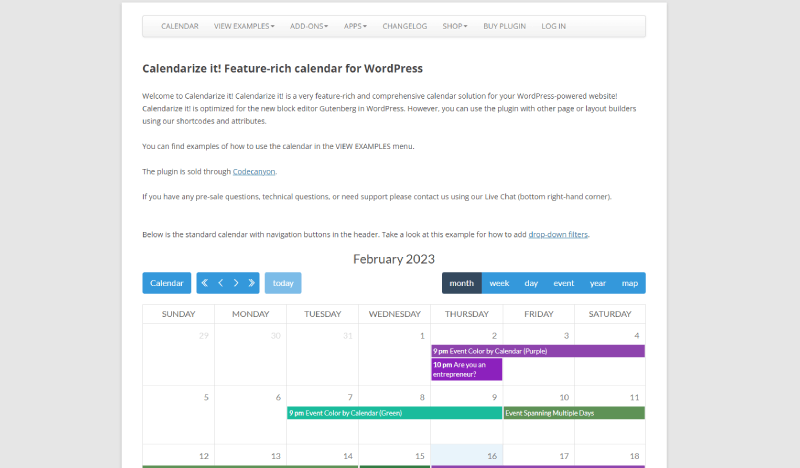
Calendarize it! is an excellent WordPress event calendar plugin that easily integrates with your WordPress website. It brings unique event widgets, different views, and custom event attributes to your event calendars.
It supports many free add-ons that add functionality and versatility. You can customize each event submission form field and enable users to submit events from the front end.
There are filtering options for easier searches by event type, event organizer, or event location. You can also get an accordion template for upcoming events, translation for multiple languages, and a map view with Google Maps.
The downside is that it has a few paid add-ons that are sold separately.
WP Event Manager
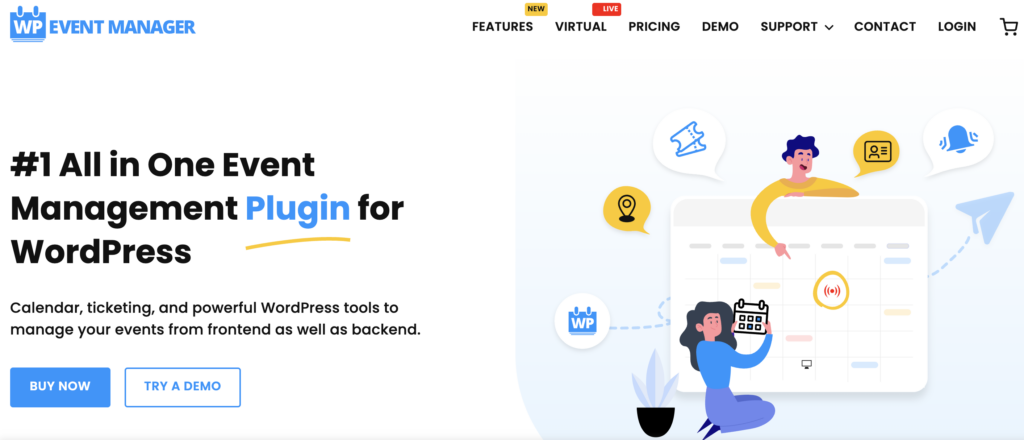
The WP Event Manager is one of the best event plugins for WordPress. It allows multiple event organizers to create and manage events.
Being a lightweight plugin, it merges seamlessly with your WordPress theme. You can set up searchable event listings for visitors to browse by event calendars, venues, or dates.
Another benefit is that it supports both in-person and online events. You can include an event preview for each occurrence.
Yet, there are some disadvantages to this plugin. Its distinctive layout does not adjust to each WordPress website. The limited design customizations also affect branding and visual consistency.
The downside is that developers aren’t allowed many alterations. Plus, this plugin comes at a high cost, with extra features increasing the annual fee.
For more details about the WP Event Manager, as well as some alternative solutions to use, check out our The Best Alternatives to WP Event Manager blog post.
EventON
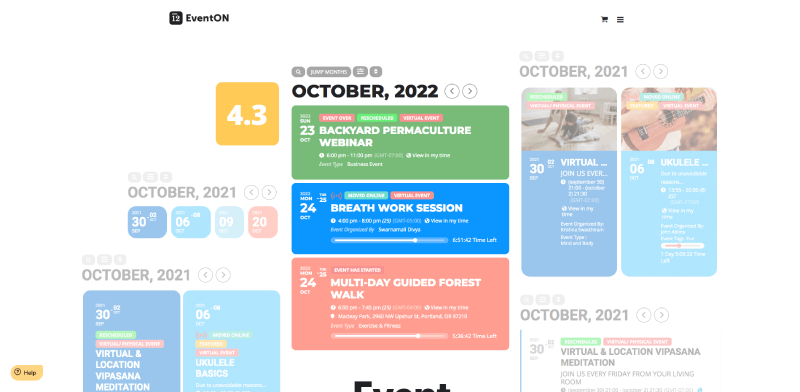
EventON is a WordPress event plugin with a distinctive design that fits every WordPress layout.
The clean schedule format for event calendars displays multiple events. Users get a preview of basic event information before accessing the single event page for each occurrence.
This WordPress event plugin also integrates with apps like Google Maps or Google Calendar. It simplifies event management by enabling you to control settings like recurring events and live events.
However, there’s no free trial – you gain access to all the key features only with the paid version. Add-ons are purchased through annual subscriptions.
Bonus: Discover 11 EventON Alternatives That Might Actually Be Better.
Event Organiser
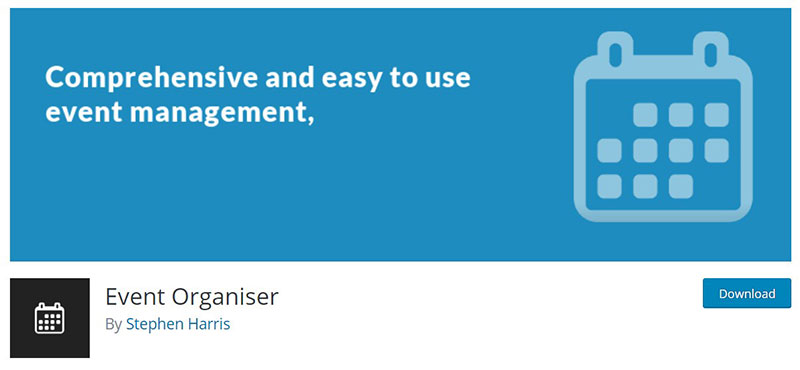
Event Organiser is a comprehensive WordPress event management plugin. With it, you can allow multi-day event registrations and create recurring events.
This free plugin enables you to manage your event venue catalog through Google Maps integration. There are also three layout widgets to display upcoming events.
Event Organiser displays event queries by date for past or future events. You can customize event organizer permissions to delete expired events or create and edit current ones.
Event Organiser has several features for developers. It also has various free and paid add-ons to configure discounts on event tickets or for visitors to submit their own events.
Are there any downsides? Users report that the interface could be more intuitive and easy to use. Also, you’ll sometimes need third-party integrations for more advanced features.
Events Schedule
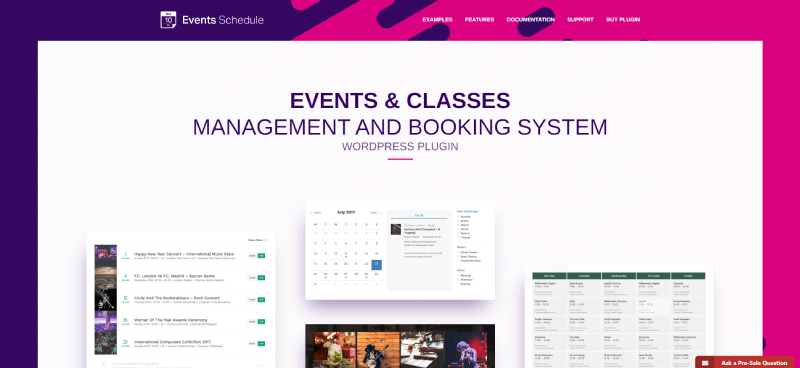
Events Schedule is a simple WordPress event management plugin that is compatible with most themes and easily adapts to your branding preferences.
It has 12 base schedule styles and extra customizations through a visual composer extension. Moreover, you can use the event dashboard to configure your calendar in a few minutes.
This WordPress events plugin is responsive and helps you grow event registration statistics.
WooCommerce integration allows visitors to browse event listings and buy event tickets.
Modern Events Calendar
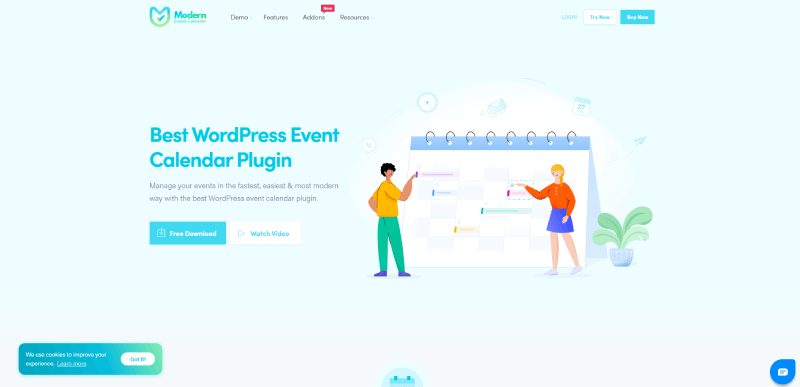
The Modern Events Calendar is another solution on our list of the best WordPress event plugins with many valuable features. Its goal is to support the needs of any event management website.
Thus, it offers over 50 display layout options to showcase events and enables you to host in different formats, such as virtually. The Modern Events Calendar lets the events manager create events for all businesses and purposes.
You can configure multi-day event registrations and recurring events. You can also import events from platforms like Google Calendar into the Modern Events Calendar.
However, the greatest disadvantage of this event plugin is that it is not as flexible and scalable as others, which makes it not a great choice for web developers.
Sugar Calendar
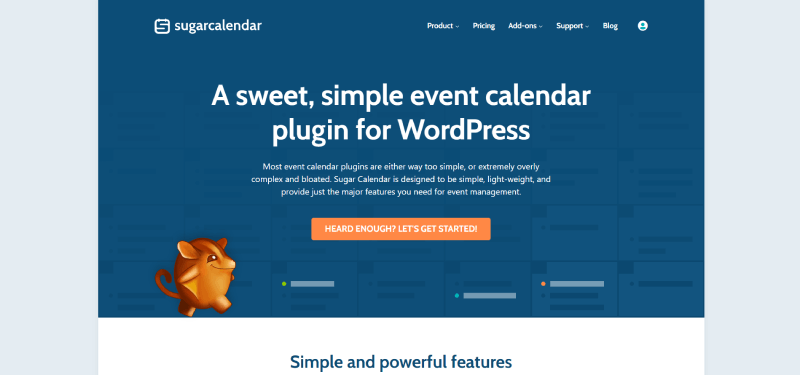
Sugar Calendar is yet another event plugin for WordPress that found itself on our list. Despite being light and user-friendly, this tool supplies all the key features for efficient event management.
Sugar Calendar syncs with Google Calendar and lets you sell your event tickets with WooCommerce Checkout. What’s more, facilitating virtual events strengthens your online community.
Besides, Sugar Calendar provides translations of eight languages and adapts to users’ time zones. It also favors all types of businesses, from event venue management to business event organizer operations.
The biggest cons are that there is no free version and that premium add-ons are available only at extra cost.
The Events Calendar
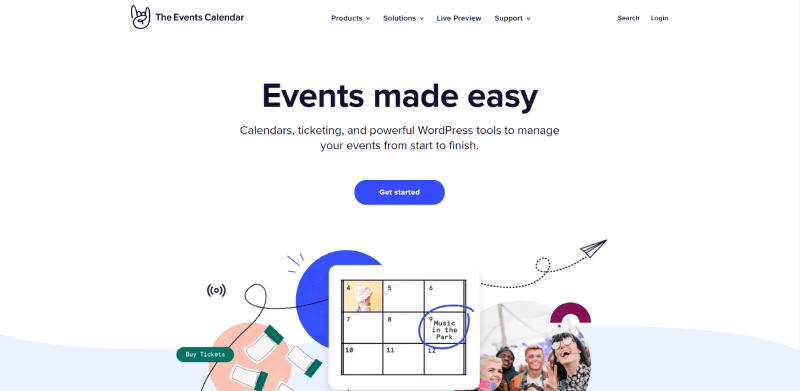
The Events Calendar eases event management with simple event listings, ticket sales, and bookings. It integrates with virtual events tools and enables search by event type, date, location, or event organizer.
This events manager plugin allows you to import events from apps like Google Calendar. Visitors can subscribe to updates from your event calendar.
The Events Calendar adapts to most website layouts. It displays upcoming events through a customizable event calendar.
There is a free version and paid annual subscription plans that will fit your business needs. Keep in mind though that the Events Calendar has several extra add-ons that might become costly.
WooCommerce Event Manager
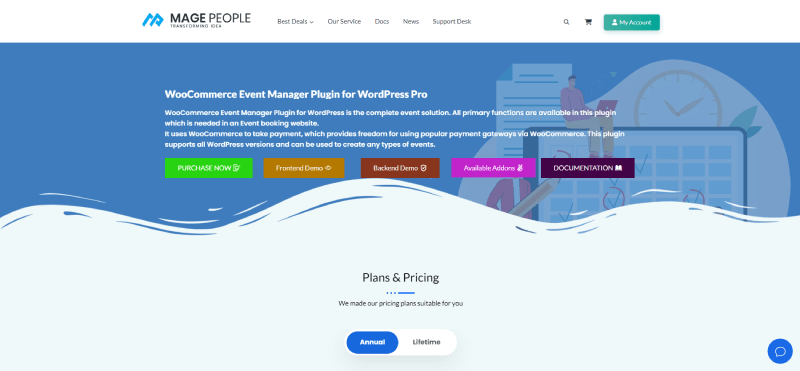
The WooCommerce Event Manager presents itself as the complete event management solution. It delivers attendee lists, insightful reports, and custom e-mail notifications.
There are custom event fields for user event registration and multilingual translation settings. You can use the Events Manager plugin to sell tickets, receive payments, and send PDFs with all the event details.
Add-ons include an event calendar, ticketing limits, and seat plans. As an event manager, you can also enable a page for customers to review and rate any past event.
Although the WooCommerce Event Manager is a free plugin, in case you have more complex business needs you’ll have to purchase the Events Manager Pro.
Tickera

Tickera is one of the best event plugins for WordPress that also has a ticketing system. This event management solution is specifically designed for event management and ticket sales. It allows event organizers, businesses, and individuals to sell and manage tickets for various types of events through their WordPress websites.
Tickera provides tools to create and customize event tickets, integrate with payment gateways, and manage attendee data. It also offers features for checking in attendees at the event, creating and printing badges, and generating reports for event analytics.
Tickera aims to make the ticketing process more convenient and efficient for those looking to host events, whether they are small gatherings, conferences, concerts, or any other type of event that requires ticketing.
However, one disadvantage of this WordPress event plugin is that you may experience some compatibility issues if you use it with other plugins.
My Calendar
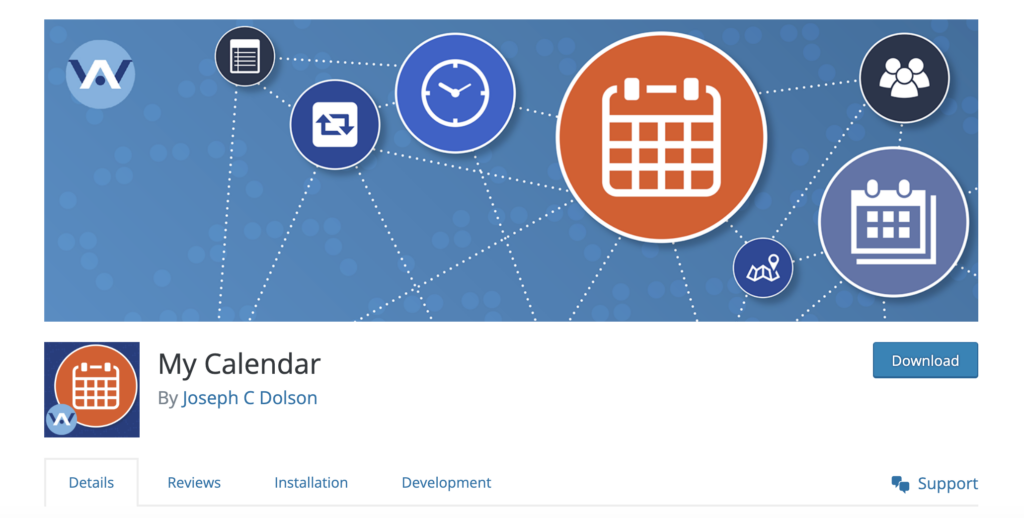
My Calendar is one of the best event plugins for WordPress designed for straightforward event management and calendar display.
It offers a range of customizable features, allowing users to showcase events in various views, including grid, list, and daily formats. Users can categorize events by location, category, author, or host, making it easy for website visitors to find and filter events of interest.
The plugin also supports recurring events and provides extensive customization options, including editable CSS styles.
However, if you want added functionality, you have to purchase the premium extension, which offers features like user-submitted events and event integration.
Events Manager
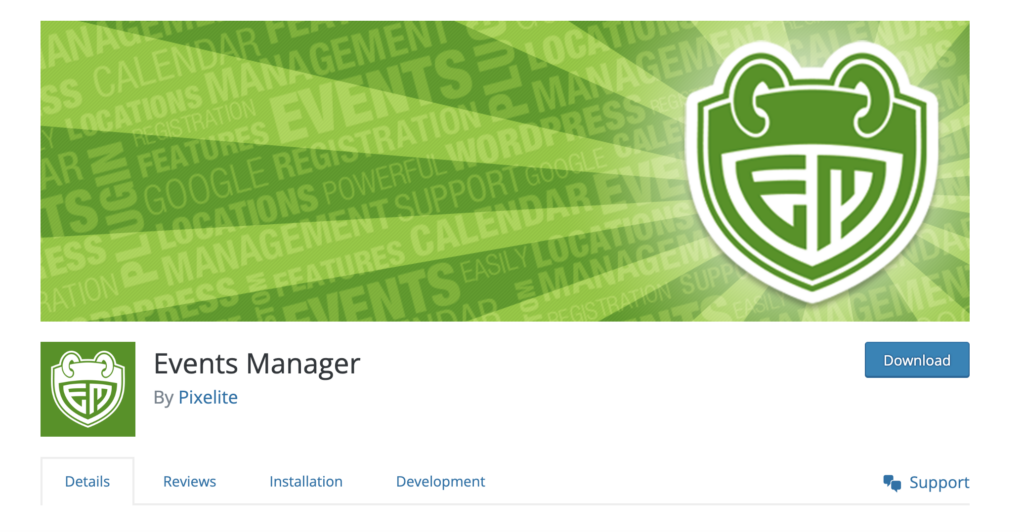
Events Manager is a highly regarded WordPress event plugin that serves as a comprehensive solution for event management and ticketing on WordPress websites. With this plugin, website owners have the capability to seamlessly create, organize, and promote a wide range of events. It simplifies the event creation process, allowing users to input crucial event details, including event titles, dates, times, locations, descriptions, and even recurring events for maximum flexibility.
One of the standout features of Events Manager is its support for event ticketing and registration. Users can efficiently sell event tickets directly through their WordPress website. The plugin offers an array of options to configure ticket pricing, availability, and more, making it a valuable tool for businesses and organizations looking to monetize their events. Additionally, event organizers can create visually appealing event calendars that integrate seamlessly with their website’s design, making it easy for visitors to explore upcoming events.
The greatest disadvantage of this event plugin is that you might need to put in some effort to customize it to match your brand.
Timely All-in-One Events Calendar
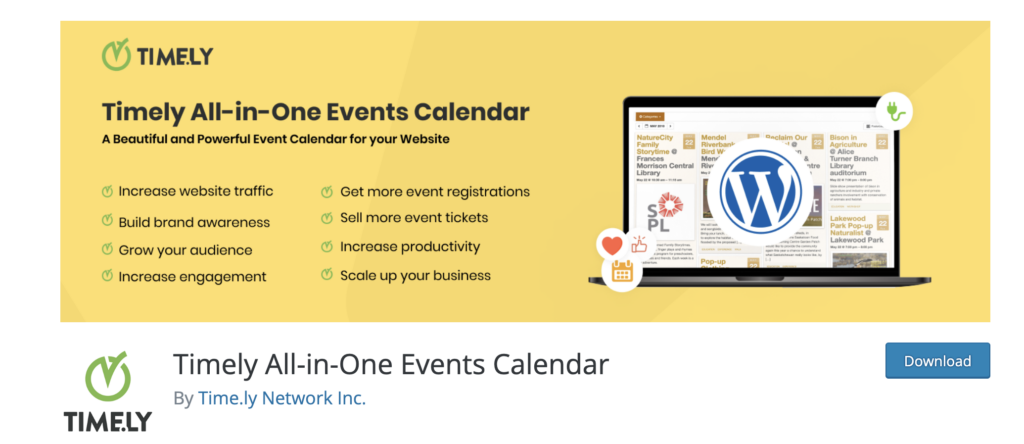
Timely All-in-One Events Calendar is another solution on our list of the best WordPress event plugins. It is specifically designed to simplify event management and enhance event presentation on WordPress websites. This plugin offers a suite of features that cater to users who wish to create, organize, and showcase events in an accessible and engaging manner.
Event management with Timely’s plugin is user-friendly and comprehensive. It allows users to input essential event details, including titles, dates, times, locations, descriptions, and imagery. The versatile calendar views include monthly, weekly, daily, and list formats, making it easy for visitors to browse and plan for upcoming events. Event organizers can make use of color coding to categorize events, providing a visual cue for event types or themes.
However, expect to invest some money in add-ons, as they do come with a price.
Bonus: 12 Plugins That Beat the Timely All-In-One Event Calendar
Stachethemes Event Calendar
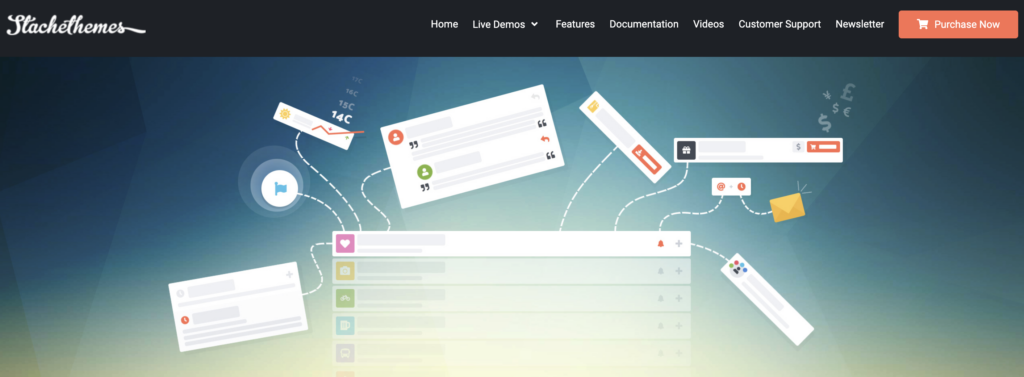
Stachethemes Event Calendar is an event plugin for WordPress designed to simplify event management and enhance the display of events on WordPress websites. This plugin provides users with a convenient way to create, organize, and present events on their websites.
Stachethemes Event Calendar offers a range of features to facilitate event management. Users can effortlessly create events by inputting essential details, including event titles, dates, times, locations, descriptions, and images. The plugin excels in the presentation of events, offering various calendar views, such as monthly, weekly, daily, and list formats. These views are designed to be visually appealing and user-friendly, allowing website visitors to explore upcoming events with ease.
To improve event organization, the plugin allows users to categorize events according to specific criteria or themes. This feature makes it simple to present events in a structured and coherent manner, especially for websites with a diverse range of event types.
The greatest disadvantage of this WordPress plugin is its complicated calendar overview and not-so-user-friendly interface.
Timetable and Event Schedule by MotoPress
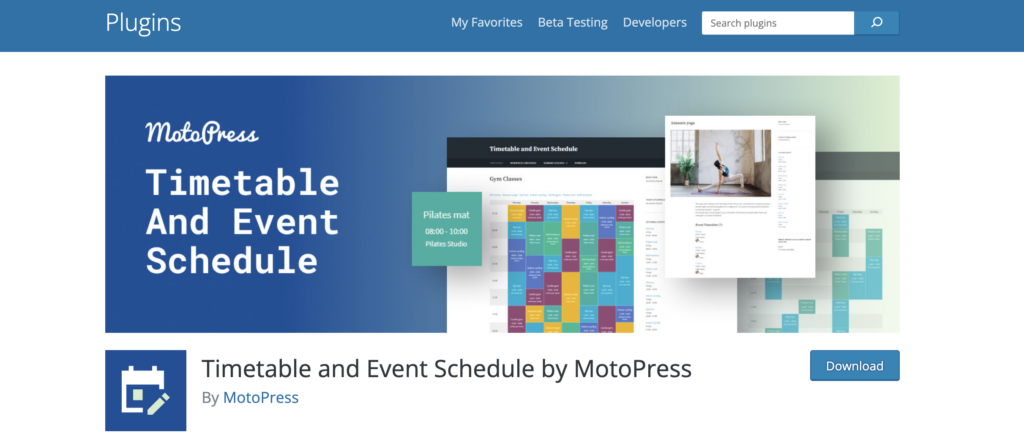
Timetable and Event Schedule by MotoPress is one of the best event plugins for WordPress designed to streamline the creation and display of event schedules and timetables on websites.
This versatile plugin is valuable for a wide range of users, including organizations, businesses, and individuals who need an effective way to showcase schedules for events, classes, workshops, conferences, or any other time-based activities.
One of the core features of the Timetable and Event Schedule plugin is its capacity to input and manage event schedules with a high degree of customization. Users can detail each event, including the event name, date, time, location, descriptions, and any additional relevant information. This allows for a comprehensive and informative schedule presentation.
However, keep in mind that the free version comes with certain limitations, so you’ll probably need to switch to a paid plan if you’re looking to expand the plugin’s functionality.
So, What’s the Best WordPress event plugin in 2024?
Finding the best way to streamline and automate event management processes efficiently is one of the greatest challenges each event manager faces.
For those who have a WordPress-powered website, there is a solution – implementing one of the WordPress event plugins featured on this list.
Although each plugin has its unique strong points, Amelia is the best choice thanks to its powerful features, sleek interface, and ease of use. However, whichever you choose, make sure to pick the one that will truly complement and elevate your business and your brand.
The post 16 Best WordPress Event Plugins in 2024 appeared first on Amelia WordPress Booking Plugin.
]]>The post How to Host a Virtual Event: The Ultimate Guide appeared first on Amelia WordPress Booking Plugin.
]]>In an era where virtual connectivity has become more crucial than ever, hosting a successful virtual event has become a valuable skill for individuals and organizations alike.
This article is your comprehensive guide to learning how to host a virtual event that will be a roaring success, offering a wealth of tips, tricks, and best practices to ensure your online gatherings leave a lasting impression. From planning and execution to maximizing audience engagement, join us as we explore the key elements that can turn your virtual event into a memorable and impactful experience for all involved.
What Is a Virtual Event?

A virtual event is a digital alternative to traditional in-person gatherings, conferences, and meetings. It takes advantage of online platforms and technology to enable engagement, interaction, and information sharing among participants, regardless of their geographic locations. This forward-thinking approach helps individuals and organizations to connect, collaborate, and host meaningful experiences without the need for physical presence.
Virtual events come in various forms, including webinars, virtual conferences, online trade shows, and virtual team-building activities. The defining feature of a virtual event is its ability to bring participants together in a shared digital space, where they can engage in discussions, presentations, and networking opportunities from the comfort of their own locations.
One of the main advantages of virtual events is their accessibility. Attendees can join from anywhere in the world, breaking down geographical barriers and expanding the reach of the event. This increased accessibility enhances inclusivity, enabling a diverse audience to participate, share insights, and contribute to the conversation.
Furthermore, virtual events often incorporate multimedia elements, interactive features, and advanced technologies to create an engaging and immersive experience. Participants can engage with speakers, ask questions in real-time, and collaborate with peers through various digital tools, fostering a sense of connection that transcends physical limitations.
How to Host a Virtual Event in 15 Simple Steps
1. Set clear goals and define the objectives
The success of a virtual event greatly depends on its specific and well-defined goals. Before starting the planning process, it is important to take the time to consider and define the objectives you wish to achieve through the virtual gathering. Clear goals not only guide the planning process but also serve as a compass for decision-making throughout the event lifecycle.
Define the purpose
To define the purpose of the virtual event, begin by asking yourself why you are hosting it. Is it to educate, inform, inspire, or connect? Clearly articulate the overarching purpose and ensure that it aligns with the broader objectives of your organization or the intent of the gathering.
Understand your audience
Understanding your audience is pivotal to the success of the virtual event. Identify the demographics, interests, and expectations of your target audience and tailor your goals to meet their needs and preferences, ensuring that the content and format resonate with them.
Ask yourself who your ideal audience is. Are they peers, existing customers, or new customers? Do you want them to interact or observe?
Establish measurable objectives
Make your goals measurable and tangible by setting specific, measurable, achievable, relevant, and time-bound (SMART) objectives. Whether it’s increasing attendance, generating leads, or fostering collaboration, this provides a clear roadmap and allows for effective post-event evaluation.
Prioritize key outcomes
Prioritize the outcomes that matter most, such as driving engagement, showcasing thought leadership, or launching a product. This focus will guide your planning efforts and help allocate resources effectively.
Align with organizational strategy
Ensure that the goals of your virtual event align with the broader organizational strategy, whether it’s reinforcing brand identity, supporting marketing initiatives, or enhancing internal communication. This cohesive alignment ensures a seamless integration of the virtual event into your overall strategy.
Communicate goals internally
Share the defined goals with your internal team, collaborators, and stakeholders to foster a collective effort towards achieving the set objectives. Clear communication ensures a unified vision and helps everyone involved understand the purpose and expected outcomes.
Setting clear goals is the crucial first step in hosting a successful virtual event. It provides a roadmap for planning and execution and serves as a benchmark for evaluating the event’s success. Each subsequent step in this guide will be informed and guided by the specific goals you’ve outlined, ensuring a purposeful and impactful virtual event experience.
2. Choose the most suitable virtual event type

Now that you have your goals in mind, the second important step in this tutorial on how to host a virtual event is to know what type of event you want to host.
There are different kinds of virtual events, so finding the right one depends on what you want to achieve and the preferences of your audience. Let’s break it down:
Webinars for information sharing
If your goal is to share knowledge or updates, a webinar might be perfect. Webinars are like online presentations where you can speak to your audience, show slides, and even ask and answer questions. They work well for educational content, product demos, or expert talks.
Virtual conferences for networking
Want people to connect and network? A virtual conference could be the answer. These events mimic in-person conferences, offering multiple sessions, panels, and opportunities for attendees to interact with each other. Great for building relationships and exchanging ideas.
Online trade shows for exhibiting
If you’re launching a product or showcasing services, consider an online trade show. This format allows exhibitors to set up virtual booths, display products, and engage with attendees. It’s a virtual version of the traditional trade show experience.
Virtual workshops for skill building
Hands-on and interactive, virtual workshops are ideal for skill-building sessions. Participants can actively engage, ask questions, and even participate in group activities. This format is effective for learning and practical training.
Hybrid events for flexibility
Hybrid events combine virtual and in-person elements. This way, you can cater to both online and offline audiences. It’s a great choice if you want to reach a wider audience while still having some physical presence.
Virtual social events for fun and team building
For a more relaxed and fun atmosphere, consider virtual social events. These could be anything from online games and team-building activities to virtual happy hours. Perfect for boosting morale and team cohesion.
When choosing the type of virtual event, think about your goals and what your audience would enjoy the most. It’s not just about what’s popular but what aligns with the purpose of your event. Each type has its unique advantages, so pick the one that fits your objectives and the preferences of your participants.
3. Decide on the right virtual event format

How to host a virtual event your audience will love? Choose the right virtual event format. Choosing the right format is like deciding the style of your gathering – it sets the tone and determines how your audience will engage. Let’s explore different virtual event formats to help you make the best choice:
-
Live vs. pre-recorded:
- Live Events: Bring a sense of immediacy and interaction. Live events allow real-time engagement, Q&A sessions, and an authentic connection with your audience.
- Pre-recorded Content: Offers precision and control. Pre-recorded sessions ensure polished presentations, minimizing the risk of technical glitches, and provide flexibility for attendees in different time zones.
-
Single vs. multi-session:
- Single Session: Ideal for shorter events or webinars focused on a specific topic. Keeps things concise and straightforward.
- Multi-session Events: Suitable for conferences or larger gatherings with diverse content. Participants can choose from different sessions based on their interests.
-
Interactive elements:
- Polls and Surveys: Engage your audience by incorporating real-time polls and surveys to gather feedback or gauge opinions.
- Live Q&A Sessions: Foster interaction by allowing participants to ask questions during live sessions, creating a dynamic and participatory atmosphere.
-
Networking opportunities:
- Breakout Rooms: Divide participants into smaller groups for discussions or activities, simulating the feel of in-person networking.
- Virtual Lounges: Create designated spaces for casual conversations and networking, allowing participants to connect on a more personal level.
-
On-demand content:
- Recorded Sessions: Provide access to recorded sessions post-event, allowing participants to revisit content or catch up on sessions they missed.
-
Engagement platforms:
- Event-specific Platforms: Utilize platforms designed for virtual events, offering features like chat, live streaming, and interactive elements.
- Social Media Integration: Leverage social media platforms for increased visibility, engagement, and real-time interaction with a broader audience.
-
Gamification:
- Virtual Challenges and Games: Incorporate gamification elements to keep participants engaged, encourage interaction, and add an element of fun to the event.
Additional event format options are:
- Single presenter: One person presents the ideas.
- Dual presenters: Two people split presenting the ideas. They can offer viewers a different perspective or engage viewers in a different way.
- Panel of experts: Several experts offer their ideas and research about specific topics.
- Questions and answers: The audience asks questions and experts answer them. The questions can be prepared ahead of time or they can be on the spot. The audience can ask them through social media, a chatbox, or other.
- Interview: Interview an expert or a guest speaker. This can increase attendance, validate your information, and interest viewers.
- Product Demonstration: Promote and showcase a product with a demonstration of how it works or with a tutorial.
- “Ask Me Anything“: Let viewers ask you anything to get to know you and your brand on a personal level.
When deciding on the virtual event format, consider the nature of your content, the preferences of your audience, and the goals you’ve set. A well-chosen format enhances the overall experience and ensures that your virtual event achieves its intended impact. Whether it’s creating an immersive live environment or providing flexibility with on-demand content, tailoring the format to your objectives is key to a successful virtual event.
4. Tell a story that resonates with your audience

When planning how to host a virtual event, it is hard to focus on anything other than the technology and all the scheduling details. However, it is important to remember the content and the story. Technology is the tool to create a larger narrative but the content is what is important.
Prioritize creating content that will teach valuable lessons and is interesting. Do not write vague talking points but instead be specific. Hone in on specific areas and offer your attendees something worthwhile.
People are busier and more distracted than ever. Virtual events compete with their guests’ children, pets, and everything else. Create a storyline that resonates with your audience and holds their attention.
Remember that virtual events are not the online equivalent of physical events. They need to have a different format to adjust to the different needs. For example, it is hard to ask someone to be at their computer eight hours a day for a whole weekend. Be realistic and adaptable so you can appeal to people despite the challenges of a virtual event.
5. Keep your audience engaged
People today have short attention spans and have to deal with more distractions at home. To combat this and hold your guests’ attention, audience engagement is key. You need to provide opportunities for engagement to get your guests involved in the event. Plan times to invite your audience to participate.
Here are some ways to do so:
- Make a pop quiz.
- Use interactive features so audience members can respond to questions or take a poll.
- Allow the guests to write questions or comments in the chatbox.
- Take requests and suggestions.
- Ask for feedback.
- Use social media to let the audience send in comments or post content with a specific hashtag.
- Use scavenger hunts, leaderboards, etc to play a game during the event.
- Use well-made videos, images, graphs, and other visuals to enthrall your guests. Additionally, you can convert your video into any kind of file by using a video converter.
These audience engagement ideas will give your guests a lasting impression of your virtual event and organization.
6. Choose the right platform for hosting your virtual event

If you want to learn how to host a virtual event as effortlessly as possible, your first step is to choose a platform that fits your needs. There are many platforms to choose from when you wish to host an event online. When deciding which one to use, try making a list of pros and cons to decide what will best suit your event.
Some important factors to consider are your budget, the number of attendees allowed, and the quality of customer service.
The platform’s features are also a factor but depend on what you need for your specific event. Do you need to share your screen, take a survey, or record the event? Write down the features you need and compare them with the features each platform offers.
Some things to consider when choosing a platform:
- Does my audience understand technology?
- What type of device will most of my audience have?
- What type of events does this platform host?
- What kind of metrics does this platform offer during or at the end of the event?
- What design options are available?
- What tools do they have so that I can engage with the audience?
- Do I need any third-party applications?
- Do they have customer service in my time zone?
Virtual event hosting platforms include:
- Zoom
- GoToMeeting
- Google Hangouts
- Adobe Connect
- ON24
- Webex
7. Set the date and time
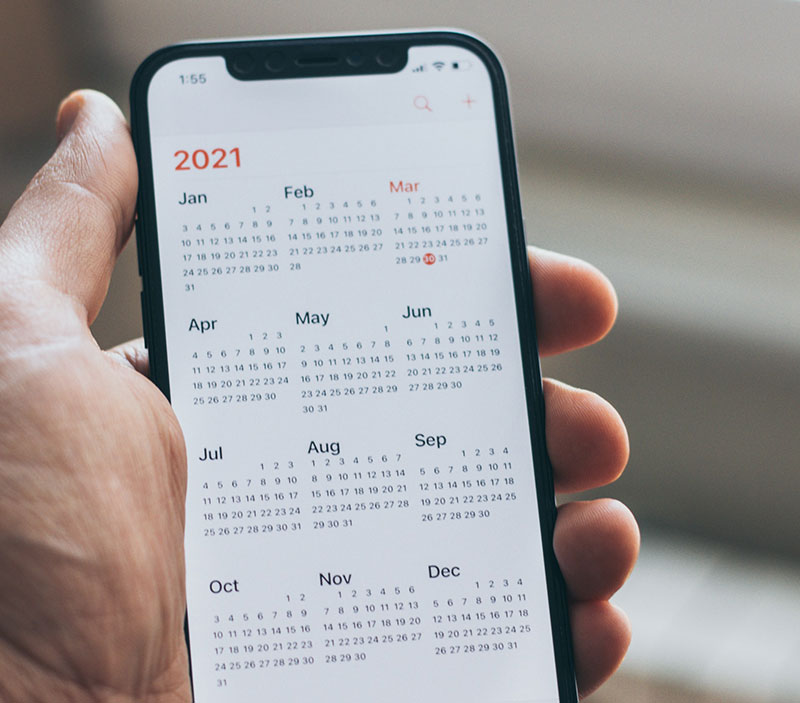
It takes a long time to plan and organize an in-person event, and it also takes a long time to plan a virtual event. So when thinking about how to host a virtual event in a timely manner, be realistic.
There is a lot to do such as promote the event, prepare the content, rehearse, and learn the virtual platform. Be patient and plan enough time to get the event well organized. A ballpark number is to give yourself about eight to ten weeks to plan and market the virtual event.
As to picking the actual date and time of the event, here are some tips:
- Do research to make sure there are no other events or holidays that would interfere with your event.
- Think about the various time zones of your attendees. This is even more important if you are hosting a global event. Try to pick a time that works for as many of your attendees as possible. Another option is to record the event or make the content available to those who were unable to attend. Or you could plan multiple events for different time zones.
8. Decide on who the speakers will be

Once you’ve determined the event type, topic, and format, the next step involves inviting speakers to participate and providing them with a comprehensive briefing.
Navigating a virtual event differs significantly from an in-person gathering, with its own unique rhythm and potential challenges associated with participants adapting to virtual platforms. When selecting speakers, it is crucial to ensure they possess the ability to adeptly manage and adapt to the nuances of the virtual setting.
Effective communication in the virtual realm requires brevity and clarity. Unlike traditional events, virtual platforms may encounter delays, and participants may still be acclimating to the digital landscape. Consider that a question-and-answer session may take longer in the virtual sphere, with attendees potentially facing difficulties with microphone activation or internet connectivity.
One solution to help you host a virtual event hassle-free is to have scripted questions. This also allows the speaker to prepare his answers. Another is to have the attendees send questions in advance, through social media, or chat. Take into account that virtual audiences are harsher because they can hide behind a screen.
Here are a few more tips for the speakers of a virtual event:
Have a rehearsal
If anyone is new to speaking at an online event they need to rehearse to get used to it. Even if someone has experience talking at an online event, it is best to rehearse to smooth out any bumps.
Experiment with the platform
Get to know the platform well and master how to manage it. The goal is to limit as many technical problems as possible. Make sure speakers know how to unmute themselves, share screens, remove filters, etc.
Seek out the best location for the virtual event
As many viral videos have shown, pets, children, and other things can interrupt speakers during a virtual event. One of the often disregarded, but imperative steps if you want to learn how to host a successful virtual event is the location. Search out in advance for a quiet place with an attractive background and minimal distractions.
Beware of gestures and mannerisms
At in-person events, the audience can see the whole body of the speaker. Video conferencing has limited what they can see to a close-up of the face. Speakers need to be careful about any eye-rolling or other distracting mannerisms. Hand gestures during a physical event make the speaker look natural but gestures on camera can look awkward or difficult. Practice speaking and gesturing to a camera. Pay attention to which gestures look appropriate and do not detract from the message.
9. Get the sponsors involved
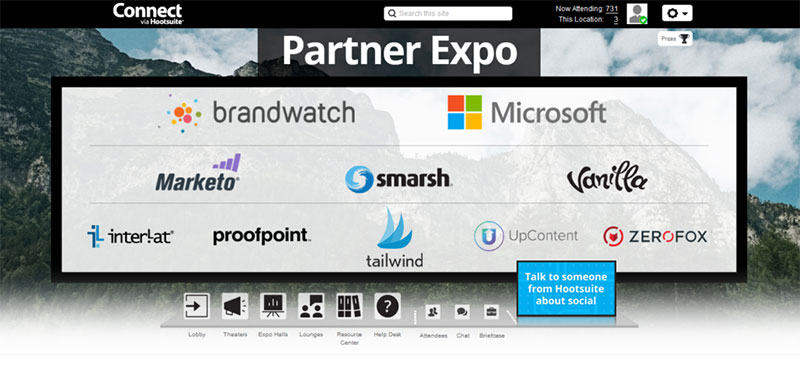
As with physical events, get sponsors involved to promote and generate capital for your virtual event. Create packages with different commitments, prices, and returns of investments. Reach out to several people to see if they want to sponsor or partner with you for this event. Packages and customized options will help you gain a wide selection of sponsors.
It is not difficult to include sponsors in your virtual event. Use videos, live streaming, social media, etc. Dedicate some of the event’s time to them so they can showcase themselves or their product. There are several options to display their logo and content that have the same impact as at an in-person event.
10. Promote your virtual event
The next step in how to host a virtual event bound to succeed is to promote it. Promoting virtual events is no different than promoting in-person events.
Here are a few ideas:
Write a blog post

Include in the blog post what inspired you to plan this event, when it will take place, and what it is about. Tell people why it is relevant to them now and how it will improve their lives.
Share the blog post on social media
Use hashtags to reach the most people. Creating your own hashtag for the event is a great idea that will allow the audience to engage during the event. They can ask questions or post their own content with the event’s hashtag. This will encourage engagement and expand the reach of the event.
Send out emails to your subscriber list
Use an email list to send out information about your event. Include the information that you would write in a blog post or send them a link to the blog post. Send a thank you message to those who have signed up to attend. A few days before the event starts, send out reminders to all the guests. After the event is over, ask for feedback to help you improve your virtual hosting skills.
Make sure that marketing emails and event materials are consistent with your brand. Use the same color scheme, font, and brand elements to provide a consistent experience and make your brand more recognizable.
Partner with influencers
To promote your virtual event, you should consider partnering with influencers. These people are authority figures in their respective niches.
When you collaborate with them to promote your event, their followers will notice it and many of them might even register for the same as they trust the recommendations of the influencers. Remember to share your digital business card with the influencers and add your event registration page link for easy access. Check online for digital business card solutions.
However, for this method to work, you need to partner with the right set of influencers. You should leverage an influencer audit tool to analyze the profiles of the influencers and check if they have any fake followers. If they do, collaborating with them may not be the best idea.
11. Use technology to help you manage and keep track of your virtual event
The success of a physical and virtual event depends on how it is managed. This means more than finding a host platform for the event and some video conferencing tools. To manage an event well, you need to display the event on your website, accept sign-ups, payments, and more.
And to do all of that, you’ll need a reliable tool. A tool like Amelia.
Transform Your Event Management with Amelia – Your Ultimate WordPress Event Plugin!
Ready to elevate your event management game? Look no further than Amelia, the leading event calendar and management plugin for WordPress! Join over 30,000 event businesses already leveraging the power of Amelia to organize virtual events, conferences, meetups, concerts, classes, and more.
Amelia stands out as a versatile and customizable WordPress event management plugin, catering to a diverse range of needs. Whether you’re an event agency, conference host, or yoga instructor conducting virtual sessions, Amelia is designed to adapt seamlessly to your requirements.
 Key features at a glance:
Key features at a glance:
- Recurring Event Options: Set up recurring events effortlessly, with options for daily, weekly, monthly, or yearly schedules. Create a custom repeat schedule to suit your unique needs.
- Booking Forms Made Easy: Use Amelia’s events manager to craft booking pages swiftly. Utilize shortcodes or integrate seamlessly with popular page builders like Divi, Elementor, or Gutenberg blocks for a hassle-free experience.
- Flexible Deposit Payments: Say goodbye to charging the whole amount upfront. Amelia lets you set deposit payments, allowing attendees to pay the rest when they arrive—ideal for on-site events.
- Multilingual Support: Hosting events in multiple languages? Amelia’s got you covered. Translate your events easily to offer a personalized booking experience for your international audience.
- Dynamic Ticketing Options: Easily set up dynamic ticketing with different prices based on attendee profiles or purchase date. Create events, sell standard and early bird tickets, or set varied prices for adults and kids—all directly from your website.
- Effortless Filtering & Sorting: Streamline navigation with event tags and color-coded types for easy sorting and filtering. Organize on the backend and let users do the same on the front-end booking form.
- Calendar Synchronization: Stay organized with direct integrations! Hosts can sync their Google and Outlook calendars, ensuring events are always on their radar. Attendees can also add events to their calendars for seamless planning.
Ready to revolutionize your event management? Explore Amelia’s capabilities, view pricing, and check out demos on our website.
Don’t miss out – make your events unforgettable with Amelia!
12. Ensure your event is accessible
Make sure your event is accessible to every attendee, including those who are visually or hearing impaired. Incorporate features that allow everyone to capture the information.
First off, consider integrating captions for pre-recorded videos using a video to text converter. This ensures that individuals with hearing impairments can follow along with the content, fostering an inclusive experience.
In addition, ensure that any text or visuals presented during the virtual event utilize a large and easily readable font. This not only benefits those with visual impairments but also enhances the overall readability for all participants.
Moreover, provide a detailed manuscript or transcript of the event after its conclusion. This document serves as a valuable resource for attendees, allowing them to review the content and information at their own pace, addressing the needs of those who may have missed certain details during the live event.
Another good idea is to implement interactive features that go beyond traditional methods, considering the diverse ways attendees may prefer to engage. This could include live chat options, interactive polls, or Q&A sessions, offering alternative channels for participation.
What’s more, any supplementary documentation, such as slideshows or handouts, should be provided in accessible formats. Consider offering these materials in text-based formats or providing alternative versions for participants who may require them.
Finally, ensure that the virtual event platform is designed with user-friendly navigation, promoting ease of use for all participants. This is particularly crucial for those using assistive technologies, ensuring they can seamlessly navigate through the event.
13. Don’t forget to send a post-event follow-up
Your engagement with participants doesn’t end when the virtual event concludes – it extends into the post-event phase. Sending out a thoughtful post-event follow-up is not only a gesture of appreciation but also an opportunity to maintain connections and set the stage for future participation. You can always opt for automated follow-ups (Amelia can help you with that as well) and save precious time.
By sending out a well-crafted post-event follow-up, you not only express gratitude but also nurture lasting connections with your audience. Providing easy access to event recordings and showcasing the value of future participation ensures that the momentum created during the event continues to flourish. Keep the communication open, inviting, and engaging, laying the foundation for a community that eagerly looks forward to your next virtual gathering.
14. Always have a backup plan
When planning how to host a virtual event, one thing you can expect is technical difficulties. This is common when hosting virtual events. It is more prevalent now because of the high demand for broadband networks. Nevertheless, you can prepare for it ahead of time and put into place a few backup plans so that the event runs without a hitch.
Here is how you can prepare for technical problems:
- Do test runs.
- Before the event, test speakers, microphones, and internet connections.
- Have a technical support person or team ready at all times to help with any issues.
- Have backups of visuals and presentations.
- Have backup speakers if someone’s internet crashes.
- Plan how the event will proceed if someone experiences technical difficulties.
- Have someone help you mute and unmute guests.
- Know the host platform well.
15. Analyze the reports

One huge benefit of virtual events is that they capture helpful data. Many virtual platforms offer built-in tools to provide reports of the event. Use these tools to capture registrations and add them to your CRM and mailing list. Use content insights to measure your ROI and optimize your KPI metrics.
Remember that the measurements of virtual events are different than those of physical events. So the virtual event results might look different. Learn to read the reports of virtual events to understand if an event was successful and how to improve. Talk to business partners about expected results to measure the success of the event with accuracy.
So, How Do You Host a Successful Virtual Event?
Online events are not going to disappear, so it is time for your business to learn how to host a virtual event. From tweeting to live streaming to video conferencing, there are many options to host a virtual event.
How can your company provide a great digital experience and encourage interaction? It takes careful planning and organizing.
Applying the tips and tricks in this guide on how to host a virtual event will maximize your online event success. Using the best software to manage it will make you an unstoppable virtual event planner.
Looking for More Resources on Virtual Events?
If you enjoyed reading this article on how to host a virtual event, you should check out these:
- The Types of Virtual Events
- The Most Interesting Virtual Event Statistics
- The Most Important Virtual Event Survey Questions to Ask
- Virtual Event Ideas
- Virtual Event Best Practices You Need to Implement
- The Virtual Events Checklist That You Didn’t Know You Needed
- Best WordPress Event Plugins
FAQ About Hosting a Virtual Event
What do I need for hosting a virtual event?
Hosting a successful virtual event requires careful planning and essential components.
Firstly, select a reliable virtual platform that aligns with your event type, ensuring it can accommodate your anticipated audience size. A stable and high-speed internet connection is imperative for smooth communication and interaction. Equip yourself with a good-quality camera and microphone to enhance the overall participant experience. Develop engaging and valuable content for your event, and structure a clear agenda. Finally, employ effective promotion strategies through social media, email, and other channels to reach and attract your target audience.
How do I host a Zoom event?
Hosting an event on Zoom is a straightforward process. Begin by creating a Zoom account, then schedule your meeting or webinar by specifying the date and time. Invite participants by sharing the meeting link or webinar details. During the event, manage participants efficiently using Zoom’s features for control and interaction. Initiate the meeting or webinar at the scheduled time, and leverage Zoom’s user-friendly interface to ensure a smooth virtual gathering.
How do I get people to attend a virtual event?
Driving attendance to your virtual event involves strategic efforts. Effective promotion through various channels, including social media and email, is crucial. Craft compelling content that provides real value to your audience and clearly communicate the event details and benefits. Incorporate interactive elements such as Q&A sessions, polls, and networking opportunities to enhance participant engagement. Consider offering incentives, such as early access, discounts, or exclusive content, to entice potential attendees.
Can you make money by hosting events?
Absolutely, hosting events can be a lucrative endeavor. There are various avenues for generating revenue, including ticket sales, sponsorships, merchandise sales, subscription models, and affiliate marketing. Charging for event attendance, securing sponsorships, selling event-related merchandise, offering premium content through subscription plans, and participating in affiliate marketing programs can contribute to a successful and financially rewarding event.
How do you create a budget for a virtual event?
Creating a budget for a virtual event involves careful consideration of both expenses and potential revenue streams. Start by listing all potential expenses, such as platform fees, marketing costs, and speaker fees. Estimate revenue from sources like ticket sales, sponsorships, and merchandise. Prioritize critical elements for a successful event and allocate budget accordingly. Throughout the planning process, track expenses closely and be prepared to make adjustments as needed.
How much does it cost to host an online event?
The cost of hosting an online event can vary based on several factors. Consider the size of your event, as larger events may incur higher platform costs. Evaluate the features you need, as advanced functionalities may have additional charges. Budget for marketing activities to promote your event effectively. Factor in potential speaker fees if applicable, and consider the level of production quality you aim to achieve, as higher quality may involve added costs.
What is the best time to host a virtual event?
Determining the best time to host a virtual event depends on understanding your target audience. Take into consideration different time zones, scheduling for convenient times in major regions. Identify when your audience is most active and available to maximize attendance. Check for conflicting events to avoid competition for audience attention. Additionally, assess whether weekdays or weekends align better with your audience’s preferences and availability.
The post How to Host a Virtual Event: The Ultimate Guide appeared first on Amelia WordPress Booking Plugin.
]]>The post How to Start an Event Planning Business? The Complete Guide appeared first on Amelia WordPress Booking Plugin.
]]>
Often, generic advice falls short of addressing the real challenges you as an aspiring event planner face. In this guide, we’ll explore a proven framework to kickstart your event management business successfully.
But let’s start with the basics and slowly build up your journey to teach you how to start an event management business.
What is an Event Management Business?
An event management business involves the planning, organizing, and execution of various events, ranging from weddings and corporate conferences to festivals and private parties. Event planners play a crucial role in ensuring that these occasions run smoothly, leaving a lasting impression on clients and attendees alike.
The Benefits of Starting an Event Management Business in 2024
As we step into 2024, the events industry is witnessing a resurgence with a growing demand for unique and personalized experiences. Here are some compelling reasons to consider starting your event planning business this year:
- The events industry is rebounding, with an increasing number of people eager to celebrate milestones and create memorable moments.
- Diverse events, from virtual experiences to in-person gatherings, offer a wide range of opportunities.
- Clients are seeking innovative and personalized event experiences, providing a platform for creative entrepreneurs to shine.
- The demand for unique themes, decor, and entertainment options is on the rise.
- Event planning allows for flexible working hours, making it an attractive option for those seeking work-life balance.
- Independence in decision-making and the ability to choose clients and projects.
How to Start an Event Management Business in 13 Steps
- Understand the event management market
- Assess and improve your event planning skills
- Market research and event planning business market fit
- Starting an event management business & choosing your niche
- Business structures to consider when starting event planning business
- Creating irresistible event planning solution
- Writing an event planning business plan
- Initial and ongoing expenses for event management business
- Figure out the booking process for your event planning business
- Set up prices with a healthy profit margin
- Promoting your event management business
- Selling your event planning services
- Growing and scaling your event planning business
Understand the Event Management Market
To truly understand the event planning market, you must immerse yourself in its dynamics. This involves staying informed about the latest trends, emerging technologies, and shifts in consumer behavior. Analyze how global and local events impact the industry, keeping an eye on event statistics and other crucial data.
Let’s see some examples of market dynamics when it comes to event planning business:
- Rise of Virtual Events
With the increasing prevalence of virtual experiences, understanding how to integrate technology into traditional event planning is crucial.
- Sustainability Trends
The growing emphasis on eco-friendly events requires an awareness of sustainable practices in event management.
Events planning challenges
Every industry has its challenges, and event management is no exception. Acknowledging these challenges is the first step in overcoming them. Challenges may include budget constraints, unexpected logistical issues, or dealing with unforeseen changes in event requirements. Anticipating and planning for these challenges will set you apart as a prepared and resilient event planner.
Trends
Trends come and go, and it’s on you to make the most out of them. Whether it’s incorporating experiential marketing, interactive elements, or thematic designs, trends influence client expectations. By understanding and leveraging these trends, you position yourself as a forward-thinking and creative event planner.
Putting insights into action
Identifying the untapped potential within the market is where strategic planning comes into play. Consider the demographics of your geographical area, the types of events in demand, and the gaps in services offered by competitors. Conduct surveys, engage in networking, and seek feedback to uncover opportunities for growth.
Assess and Improve Your Event Planning Skills
Before you start chasing new shiny ideas and dive into external avenues for skill enhancement, begin with a thorough self-assessment. Reflect on your past events, identifying both strengths and areas for improvement. Consider seeking feedback from clients, vendors, or colleagues to gain valuable insights into your performance.
Enhancing your event planning skills
Formal education and structured learning play a pivotal role in skill enhancement. What can you do to enhance your event management skills? Explore workshops, seminars, and online courses that cover various aspects of event planning. These educational opportunities can provide in-depth knowledge, from event design principles to the latest in event technology.
Another great strategy is connecting with seasoned professionals in the event planning industry who can offer invaluable mentorship. A mentor can provide guidance based on their experiences, share industry insights, and offer constructive feedback. Consider joining mentorship programs or networking events to establish mentor-mentee relationships.
While theoretical knowledge is essential, hands-on experience remains unparalleled in its ability to hone event planning skills. Actively seek opportunities to work on a diverse range of events, from weddings to corporate conferences. Practical experience not only solidifies your skills but also builds confidence in managing various event scenarios.
In 2024, proficiency in event management tools and software is a valuable skill. Familiarize yourself with event planning software, project management tools, and virtual event platforms. Technological literacy enhances efficiency in tasks ranging from guest list management to creating immersive virtual experiences.
Market Research and Event Planning Business Market Fit
Begin your market research by gaining a comprehensive understanding of the current state of the event planning industry. Analyze market trends, identify key players, and assess the demand for various types of events. Consider factors such as geographic location, demographics, and socio-economic trends that might influence the market dynamics.
What can you do?
- Explore reports from event industry associations and market research firms for a macro view of trends.
- Study the strategies, strengths, and weaknesses of established event-planning businesses.

Image by vector4stock on Freepik
The next step is to narrow down your focus by clearly defining your target audience. Consider demographic factors such as age, income level, and interests. Understanding your audience allows you to tailor your services to meet their specific needs and preferences. It’s not a one-size-fits-all approach; different demographics have distinct preferences and expectations. Conduct market research to create detailed buyer personas, encompassing factors like age, interests, and spending capacity.
Crafting buyer personas for event planning business
- Develop detailed profiles of your ideal clients.
- Consider factors like their event goals, preferred communication channels, and budget constraints.
Beyond demographics, explore the specific preferences of your target audience. Whether it’s the aesthetic choices for a wedding or the interactive elements for a corporate conference, aligning your services with what resonates with your clients ensures a more personalized and satisfying event experience.
You also need to dive deep into the needs and pain points of your potential clients. What challenges do they face when planning events, and what solutions are currently lacking in the market? By identifying these pain points, you can tailor your services to address specific gaps in the industry.
Crafting your Unique Selling Proposition (USP)
Once you’ve identified all these aspects, it’s time to craft your unique selling proposition. Armed with insights from your market research, articulate a unique value proposition that sets your event planning business apart. Your value proposition should communicate the specific benefits and advantages clients gain by choosing your services over competitors.
Let’s see the key components of a value proposition for an event planning business:
- Highlight any specialized skills, certifications, or expertise that distinguish your business.
- Emphasize unique solutions or approaches that address specific market needs.
- Communicate a commitment to exceptional customer service and personalized experiences.
Is there something else you can do? Well, of course!
Analyze competitor strategies
Evaluate the strategies employed by competitors to gain insights into how competitive the event planning industry is. Identify areas where competitors may be falling short or where you can differentiate your business. This analysis informs your positioning within the market. This leads us to the next step you should take when starting an event planning business:
Complete SWOT analysis
Conducting a SWOT analysis—a comprehensive examination of your business’s internal and external factors—provides a roadmap for making informed decisions and optimizing your chances of success.
Strengths
Identify the internal factors that give your event planning business a competitive edge. These are the attributes and capabilities that set you apart and contribute to your success in the market.
Examples:
- Expertise and Skills
Highlight any specialized event planning skills or certifications you possess.
- Creativity
Emphasize your creative approach to designing and executing events.
- Industry Connections
Showcase relationships with reliable vendors, venues, and other industry professionals.
- Technology Adoption
If you leverage event planning software or technology, consider it a strength.
Weaknesses
Examine the internal factors that may pose challenges or limitations to your event planning business. Recognizing and addressing weaknesses is crucial for sustainable growth.
Examples:
- Limited Experience
If you’re new to event planning, acknowledge the learning curve and outline plans for skill enhancement.
- Resource Constraints
Lack of financial resources, staff, or equipment may be a weakness.
- Niche Limitations
If your expertise is limited to specific event types, address plans for diversification.
Opportunities
Explore external factors in the market that can be advantageous for your event planning business. These are areas where your business can grow and thrive.
Examples:
- Growing Demand
Identify emerging trends or increasing demand for certain types of events.
- Collaborations
Explore opportunities to collaborate with other businesses or professionals in the events industry.
- Technological Advancements
Leverage new event planning tools or technology trends to enhance your services.
- Market Gaps
Identify gaps in the market that your business can fill.
Threats
Evaluate external factors that could potentially pose challenges or threats to your event planning business. Being aware of these threats allows you to proactively mitigate risks.
Examples:
- Economic Downturn
Economic challenges may impact clients’ budgets for events.
- Intense Competition
A saturated market with numerous competitors may pose a threat.
- Changing Regulations
Stay informed about any legal or regulatory changes affecting the events industry.
- Seasonal Fluctuations
If your business is impacted by seasonal demand, plan for potential idle periods.
Starting an Event Management Business & Choosing Your Niche
Starting your event management business is scary, but exciting. Choosing your niche is crucial. You can always pivot to another niche, but getting it right on the first try will give you the headstart you need for successfully starting your event planning business.
Defining your niche is like setting the stage for your business, allowing you to tailor your services to meet the unique demands of a specific market segment. Here’s a guide on how to navigate this crucial aspect of launching your event management business.
- The first step in choosing your niche is to identify the type of events that genuinely excite and inspire you. Whether it’s the romance of weddings, the sophistication of corporate gatherings, or the vibrant energy of social events, aligning your business with your passion sets the foundation for long-term success.
- While passion is paramount, it’s essential to evaluate the market demand for your chosen niche. Research the local and global trends to understand the current and future needs of potential clients. A niche with a growing demand ensures a steady stream of opportunities for your business.
- Evaluate your skills, expertise, and previous experiences in event planning. Your professional background and knowledge can influence the type of events you’re well-equipped to handle. Leverage your strengths to carve a niche that showcases your unique capabilities.
- Analyze the level of competition in different event planning niches. While a saturated market may present challenges, it also indicates a viable demand. Assessing the competitive landscape helps you identify gaps or opportunities for differentiation.
- Once you’ve chosen your niche, tailor your services to cater specifically to the needs and preferences of that market segment. This involves customizing your approach, packages, and offerings to align with the unique requirements of the events within your chosen niche.
- Craft a brand identity that resonates with your chosen niche. This includes developing a compelling brand story, creating a visually appealing brand image, and adopting a tone of voice that connects with your target audience.
Business Structures to Consider When Starting an Event Planning Business
When starting an event planning business, the crucial decision you’ll need to make is determining the legal structure of your venture. The choice of business structure significantly impacts various aspects, including taxation, liability, and the overall management of your business. But what options do you have?
Sole Proprietorship
A sole proprietorship is the simplest and most common form of business structure. In this setup, you are the sole owner and operator of the event planning business. It’s an ideal choice for solo entrepreneurs or small businesses with minimal anticipated risks.
Limited Liability Company (LLC)
An LLC combines elements of both a sole proprietorship and a corporation. It provides a degree of personal liability protection while maintaining simplicity in terms of operation. LLCs are a popular choice for small to medium-sized event-planning businesses.
Partnership
A partnership involves two or more individuals sharing ownership and responsibilities. There are two primary types: general partnerships (equal sharing of responsibilities and liabilities) and limited partnerships (one general partner with unlimited liability and limited partners with liability restricted to their investment).
Corporation
A corporation is a separate legal entity from its owners. It is owned by shareholders, managed by a board of directors, and operated by officers. Corporations are suitable for businesses with significant growth ambitions.
Creating an Irresistible Event Planning Solution
Before you start an event planning business you need to understand that the key to success lies in offering a solution that not only meets but exceeds the expectations of your target audience. Consider the following aspects and thoroughly go through them to create an irresistible event-planning solution for your clients:
- Your event planning solution should not only meet industry standards but surpass them. Clearly articulate and showcase what sets your services apart from competitors. Whether it’s a signature planning process, exclusive vendor partnerships, or a track record of delivering extraordinary experiences, emphasize these unique selling propositions in your marketing materials.
- Leveraging technology can elevate your event planning solution. From online event management platforms and event management plugins to virtual planning tools and social media integration for real-time updates, embracing technology enhances both the planning process and the overall event experience.
- Clear and effective communication is the backbone of successful event planning. Ensure that your solution includes robust communication channels to keep clients informed and involved. Additionally, fostering strong collaborations with vendors, venues, and other stakeholders contributes to a seamless and well-coordinated event execution.
- One size rarely fits all in the world of events. Offering personalized and customizable solutions allows clients to feel a sense of ownership and involvement in the planning process. Whether it’s custom décor, unique entertainment options, or personalized event timelines, the ability to tailor your services adds a distinctive touch.
- Consider how you can infuse creativity into your event planning services. This could involve staying updated on the latest trends, incorporating unique themes, or introducing innovative technologies to enhance the overall event experience.
- No two events are alike, and recognizing this fact is crucial in creating a solution that resonates with your clients. Tailor your services to cater to the specific needs of your chosen niche. Whether it’s weddings, corporate events, or social gatherings, having specialized packages or customized offerings adds a personal touch that clients appreciate.
Writing an Event Planning Business Plan

Image by storyset on Freepik
A comprehensive business plan is the foundation of a successful event planning business. It serves as your roadmap, guiding your business toward its goals while providing a clear and strategic direction. Here’s how to develop an effective event planning business plan that outlines your vision, target market, marketing strategy, and financial projections.
Vision and goals
Begin by articulating your business’s vision and mission. What do you aim to achieve with your event planning services? Outline short-term and long-term goals that provide a clear trajectory for your business. Whether it’s becoming a prominent wedding planner in your region or specializing in large corporate events, defining your goals sets the tone for the entire plan.
Target market
Understanding your target market is fundamental to the success of your event planning business. Define your ideal clients, considering factors such as demographics, preferences, and spending capacity. Tailor your services to meet the specific needs and expectations of your identified market segments.
Marketing strategy
Your marketing strategy is the bridge between your event planning services and your target market. Clearly outline how you intend to promote your business. This may include digital marketing efforts such as social media campaigns, website optimization, and content marketing. Traditional methods like networking, partnerships, and attending industry events should also be considered.
Service packages
Detail the range of services your event planning business will offer. Whether it’s full-service event coordination, day-of coordination, or specialized service packages for weddings, corporate events, or social gatherings, clearly articulate what sets your services apart. Highlight any unique features or value additions that distinguish your offerings.
Competitive analysis
Analyze the competitiveness of the event planning industry in your target area. Identify key competitors, their strengths and weaknesses, and the unique selling propositions that set them apart. Use this information to refine your own strategy and identify opportunities for differentiation.
Financial planning
Create detailed financial projections for your event planning business. This should include startup costs, operational expenses, and revenue forecasts. Outline your pricing strategy and justify your rates based on market research and the value you provide. A realistic and well-researched financial plan instills confidence in potential investors and serves as a guide for your financial management.
Risk analysis and mitigation
Anticipate potential challenges and risks that your event planning business may encounter. This could include market fluctuations, unexpected expenses, or industry-specific challenges. Develop strategies to mitigate these risks and ensure your business remains resilient in the face of uncertainties.
Operational plan
Detail the day-to-day operations of your event planning business. This includes staffing requirements, vendor management processes, client communication protocols, and any technology or tools you plan to leverage. A well-structured operational plan ensures efficiency and consistency in service delivery.
Executive summary
Summarize the key components of your business plan in an executive summary. This concise overview provides readers with a snapshot of your business, making it an essential part of any business plan presentation or proposal.
Initial and Ongoing Expenses for an Event Management Business
How much does it cost to start an event planning business? Estimating both initial and ongoing expenses is crucial for ensuring the financial sustainability of your event planning business. Let’s see the key areas you need to consider when planning your budget.
Initial expenses for starting an event management business
- Evaluate rental costs for office space. This could be a dedicated office, a co-working space, or even a home office setup.
Pro tip: Start modestly and scale up as your business grows
- Factor in the cost of essential equipment like computers, printers, and office supplies.
Pro tip: Consider second-hand equipment initially to manage costs.
- Allocate funds for website development, business cards, and initial marketing efforts.
Pro tip: Leverage cost-effective digital marketing channels initially, such as social media and content marketing.
- Budget for workshops, courses, or certifications to enhance your event planning skills.
- Account for fees related to business registration, permits, and licensing.
Ongoing expenses for event planning business
- Explore event management software and tools to streamline your operations.
Pro tip: Start with essential tools, such as an event management plugin, and scale up based on your business needs.
- Include ongoing expenses like electricity, internet, and office maintenance.
- Allocate a portion of your budget for ongoing marketing efforts to promote your services.
- Budget for insurance coverage to protect your business from unforeseen circumstances.
- Set aside funds for attending industry events, networking, and collaborating with other professionals.
- Dedicate funds for continuous learning and staying abreast of industry trends.
Remember: Always include a contingency fund to address unexpected expenses.
Figure Out the Booking Process for Your Event Planning Business
A streamlined booking process is not just a convenience it’s a key component of delivering a stellar client experience. Here’s a comprehensive guide to help you figure out the booking process for your event planning business and ensure a seamless journey for your clients. A professional event management plugin can be a game-changer for your business. Here’s how:
- Efficient Workflow
Streamline your workflow with features like automated appointment scheduling, invoice generation, and client communication.
- Customization
Tailor the plugin to match your unique services, ensuring a personalized booking experience for clients.
- Data Security
Ensure the security of client information and transactions with a reliable plugin.
- Time-Saving
Free up time by automating repetitive tasks, allowing you to focus on delivering high-quality services.
Investing in a professional event management plugin not only modernizes your booking process but also positions your business as tech-savvy and client-focused.
What else can you do to make the booking process smooth for your new event planning business?
- Utilize the customization features of the plugin to tailor the booking process to your specific services and client requirements.
- Offer free initial consultations to understand clients’ needs and preferences.
- Tailor your services based on the insights gained during consultations.
- Invest in an efficient booking system that allows clients to easily select services, choose dates, and make payments.
- Provide a transparent pricing structure for your services. Consider creating tiered packages or customizable options.
Set up Prices With a Healthy Profit Margin
Setting up prices with a healthy profit margin is a crucial aspect of running a successful event-planning business. Your pricing not only needs to cover expenses but should also reflect the unique value and expertise you bring to your clients. Let’s explore effective strategies to help you determine prices that ensure financial sustainability and growth.
The first thing you need to do is to consider the unique value proposition that sets your event planning business apart from competitors. This could be your expertise in handling specific types of events, personalized services, or innovative event concepts. Price your services based on the perceived value you offer to clients. If your services are known for exceptional quality, creativity, or attention to detail, clients are likely to be willing to pay a premium.
The next step is to research and analyze the pricing strategies of competitors in your area. Understand the average pricing for similar services and assess whether your offerings align with, exceed, or differentiate from the competition.
Once you’re done with that, it’s time to clearly define your profit margin goals. Determine the percentage of profit you aim to achieve for each event. This goal should not only cover your expenses but also contribute to business growth and development.
Remember: Strive for a balance between competitiveness and profitability. While it’s essential to remain competitive in the market, undervaluing your services can lead to long-term financial challenges.
Start Promoting Your Event Management Business
Promoting your event management business effectively is essential to attract clients and establish a strong market presence. Let’s see the strategic approaches to develop a robust online presence and leverage digital marketing to reach a wider audience.
First impressions matter
Your website serves as the digital face of your event management business. Invest in a professionally designed website that reflects your brand identity and showcases your portfolio of successful events.
Blog content
Establish a blog on your website to regularly publish informative and engaging content related to event planning. Share insights, trends, and success stories to position your business as an industry authority.
Visual portfolio
Create a visually appealing portfolio featuring highlights from your previous events. Include high-quality images and detailed descriptions to showcase your capabilities and style.
Choose relevant platforms
Identify the social media platforms most frequented by your target audience. Whether it’s Instagram, Facebook, Twitter, or LinkedIn, maintain active and engaging profiles on these platforms.
Visual storytelling
Utilize the visual nature of social media to tell compelling stories about your events. Share behind-the-scenes glimpses, client testimonials, and updates about upcoming projects.
Keyword optimization
Incorporate relevant keywords throughout your website content to enhance its visibility on search engines. Identify and target keywords specific to event planning and your niche.
Local SEO
Optimize your online presence for local searches by including location-specific keywords. This is crucial for attracting clients in your geographical area. This is crucial for attracting clients in your geographical area, so make sure to take your time learning local ranking factors to ensure your business stands out in local search results.
Claim your business
Claim and optimize your Google My Business listing. Ensure that all information, including your business hours, contact details, and photos, is accurate and up-to-date.
Client reviews
Encourage satisfied clients to leave positive reviews on your GMB profile. Positive reviews enhance your credibility and attract potential clients.
Build a subscriber list
Create a mailing list by encouraging website visitors to subscribe to your newsletters. Use incentives such as exclusive event planning tips, industry insights, or promotional offers.
Targeted campaigns
Develop targeted email campaigns to reach different segments of your audience. For example, send newsletters with wedding planning tips to engaged couples and corporate event ideas to businesses.
Start Selling Your Event Planning Services
Selling event planning services involves more than just showcasing your skills; it’s about telling a compelling story that resonates with potential clients. Let’s explore effective strategies to sell your event planning services, emphasizing expertise, success stories, and the power of testimonials.
Portfolio
Your portfolio is a visual narrative of your expertise. Showcase a diverse range of events you’ve successfully planned, including weddings, corporate functions, and social gatherings.
Testimonials
Request feedback from satisfied clients and showcase their testimonials prominently on your website. Include specific details about their experience, the success of the event, and your role in making it happen.
Case studies
Develop in-depth case studies for select events. Provide a comprehensive overview, detailing the challenges you faced, innovative solutions implemented, and the overall success achieved.
Industry expertise showcase
Establish yourself as a thought leader in the event planning industry. Share your insights, trends, and best practices through blog posts, articles, and participation in industry forums.
Personalized client engagement
When pitching your services to potential clients, customize your presentations to address their specific needs and expectations. Show them that you’ve thoroughly researched and understand their requirements.
Develop client relationships
After successfully executing an event, follow up with clients to gather feedback and express your appreciation. This not only helps in refining your services but also strengthens the client relationship.
Growing and Scaling Your Event Planning Business
As your business matures, consider diversifying the types of events you plan. If you’ve primarily focused on weddings, explore opportunities in corporate events, conferences, or specialized gatherings. This not only broadens your market reach but also mitigates risks associated with reliance on a single event category.
- Evaluate your current operational processes and identify areas for improvement. Implement efficient workflows and leverage technology to automate repetitive tasks. By streamlining operations, you can handle increased demand without compromising on quality.
- As your business expands, building a capable team becomes essential. Hire skilled professionals, including event planners, coordinators, and administrative staff. A diverse and talented team contributes to the overall success and efficiency of your operations.
- Entrust responsibilities to capable team members and empower them to take ownership of specific tasks. Delegating effectively not only lightens your workload but also fosters a collaborative and motivated work environment.
- Develop comprehensive standard operating procedures (SOPs) for various aspects of event planning. Clearly document processes related to client communication, vendor management, and onsite coordination. Standardized procedures ensure consistency and quality across all events.
- Identify opportunities for strategic partnerships with businesses that complement your services. This could include collaborating with catering companies, floral designers, or audio-visual experts. Such partnerships enhance your service offering and can lead to mutual referrals.
- Attend industry conferences and networking events to connect with other professionals and stay informed about industry trends. Networking provides valuable insights, potential collaborations, and opportunities for business growth.
- Actively seek feedback from clients after each event. Use this feedback to identify areas for improvement and address any concerns. Demonstrating a commitment to continuous improvement reinforces your dedication to client satisfaction.
Invest in a Top-Notch Event Management Plugin
Meet Amelia, the WordPress Event Calendar and Event Management Plugin that transforms the way you organize virtual and offline events, conferences, meetups, and more.
Why choose Amelia as your event planning plugin?
Let’s see the key features of Amelia that will help you kickstart a successful event-planning business:
Responsive and customizable
Amelia is a responsive and customizable WordPress event management plugin designed for various event types. Whether you’re an event agency or conference host, Amelia caters to your specific needs.
Recurring events made easy
One standout feature is the ability to set recurring events with various options. Whether it’s a weekly meeting, monthly conference, or an annual gala, Amelia’s clear calendar view helps you manage them effortlessly.
Seamless booking pages
Create booking pages effortlessly using shortcodes or popular page builders like Divi, Elementor, or Gutenberg blocks. With Amelia, your event booking page can be ready in minutes.
Flexible deposit payments
Amelia allows you to set up deposit payments, enabling attendees to pay a partial amount upfront and the rest upon arrival. This flexibility is especially beneficial for on-site events.
Multilingual support
Hosting events in different languages? Amelia has you covered with its translation option, providing a seamless booking experience for your international audience.
Dynamic ticketing
Set different ticket prices based on attendees’ profiles or the date of purchase. Offer early bird tickets, special prices for adults and kids, and control when sales open and close.
Filter and sort with ease
Create event tags and use different colors to distinguish event types, facilitating easy navigation for both organizers and attendees.
Calendar integration
Amelia integrates with Google Calendar and Outlook, ensuring hosts stay organized, and attendees can add events to their calendars with ease.
Which key features of Amelia simplify event hosting?
Virtual Sessions and Online Events
Amelia caters to the modern trend of hosting events online. With native integrations with Zoom and Google Meet, organizing virtual conferences becomes a breeze.
SMS and Email Reminders
Ensure a high attendance rate with SMS and email reminders, keeping both organizers and attendees in the loop.
Customer and Employee Panels
Manage all aspects of your event, from attendees to venues, with comprehensive customer and employee panels.
Insightful Admin Dashboard
Get real-time insights into key performance indicators with an admin dashboard that streamlines event management.
Fully Customizable Design
Tailor Amelia to your brand with fully customizable design options for seamless integration with your website.
Custom Fields for Booking Forms
Collect specific information by adding custom fields to your booking forms, enhancing the overall booking experience.
Try Amelia Today
Join the ranks of over 30,000 event businesses that trust Amelia for their events calendar. Explore pricing options and see demos to discover how Amelia can elevate your event planning experience!
The post How to Start an Event Planning Business? The Complete Guide appeared first on Amelia WordPress Booking Plugin.
]]>The post How to Reduce Last-Minute Appointment Cancellations: Tips & Tricks appeared first on Amelia WordPress Booking Plugin.
]]>This guide is your tailored solution, filled with expert strategies and innovative tips & tricks you can use to minimize appointment cancellations. Get ready to transform your approach to appointments and reclaim control of your schedule!
1. Use Reminder Systems to Minimize Last-Minute Cancellations
Reminder systems are the secret weapon in the battle against forgotten appointments. They’re the friendly nudge that keeps your clients on track and your schedule running smoothly. These systems use automated messages – whether through appointment emails or reminder texts – to jog your clients’ memories and ensure they remember their upcoming appointments. They’re a game-changer for service business owners seeking to minimize no-shows and last-minute cancellations.
Identify clients who regularly miss appointments
There are some clients that, despite regular appointment reminders, fail to show up. This can be very frustrating since business owners are losing money with these appointment cancellations.
What can they do to solve this problem?
The first thing is to track appointments. Identify which clients consistently do not show or cancel appointments. Then, direct specific efforts towards these clients to prevent further loss of income. Experiment a bit and try to determine a winning reminder tactic for each case.
Send them additional appointment reminders
To make sure such a client shows up, business owners can send them additional reminders. You can send two reminders before the appointment – an email reminder and a text reminder (cover all the bases). Notify them the day before and the day of the appointment.
Apart from this, call them on the phone on the same day as the scheduled appointment. Ask them if they are going to make it, and if not, you can schedule someone from the waitlist for that time slot.
Pro tip: Amelia is a WordPress booking plugin whose automated reminder feature can become your trusty sidekick in reducing canceled appointments. With customizable and automated reminders sent via email or SMS, Amelia ensures that your clients stay informed and remember their scheduled appointments. This not only reduces the likelihood of missed appointments due to forgetfulness but also maintains a level of engagement that encourages clients to commit to their bookings.
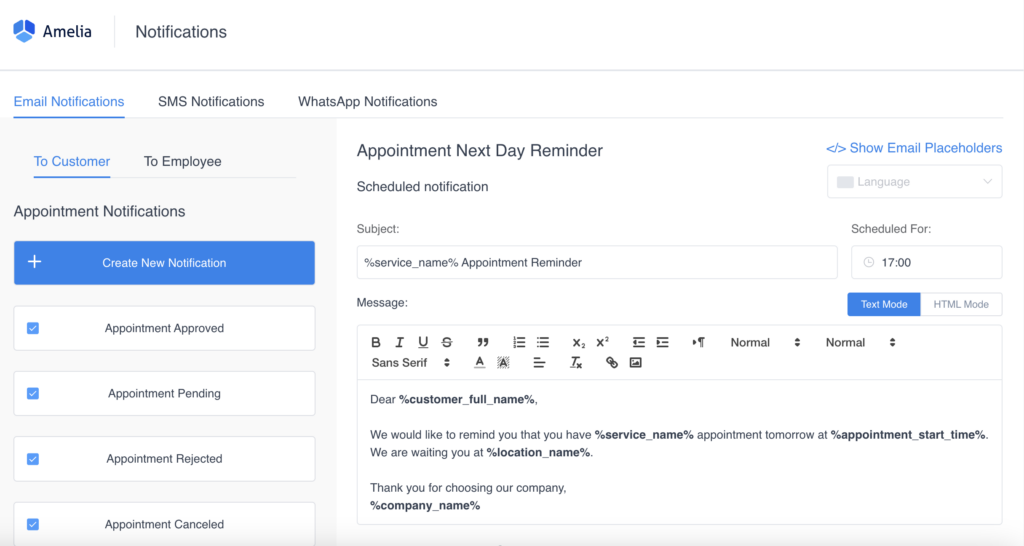
2. Craft Crystal-Clear Appointment Cancellation Policies
Crafting a clear cancellation policy isn’t just about rules; it’s the backbone of a smooth-running appointment system. It’s like a guideline that ensures both you and your clients are on the same page when it comes to cancellations, rescheduling, and commitment. This policy isn’t about locking anyone in; it’s about ensuring everyone’s on board with the appointment game plan.
By laying down these policies, service business owners create a supportive framework that builds trust, fosters reliability, and sidesteps misunderstandings.
3. Provide Flexible Scheduling Options to Prevent Canceled Appointments
Flexible scheduling options are the golden ticket in today’s busy world. They’re the key to accommodating diverse schedules and preferences, empowering your clients to manage their appointments with ease. For service business owners, offering flexible scheduling options translates to increased customer satisfaction and reduced appointment cancellations due to appointment scheduling mistakes.
Pro tip: Amelia’s user-centric interface puts the power of scheduling in the hands of your clients. With a range of options for rescheduling or modifying appointments, clients can effortlessly find alternative slots that suit their needs. This streamlined process not only caters to their convenience but also significantly reduces the chances of cancellations arising from conflicting schedules and double bookings.
4. Prevent Last-Minute Cancellations with Appointment Confirmations
Appointment confirmations are the secret sauce in ensuring clients are fully committed to their appointments. They’re the final handshake that seals the deal, ensuring that both parties are on board and ready to honor the scheduled time. Both email and text appointment confirmations have the role of a safety net that minimizes uncertainties, making last-minute cancellations as rare as possible.
Pro tip: Amelia’s appointment confirmation feature works its magic by gently nudging your clients to high-five their appointments. How? By asking for that “Yes, I’m ready!” click or tap. This action is not just about ticking boxes; it’s like a handshake between your clients and their commitments. Think of it as Amelia’s secret weapon against canceled appointments.
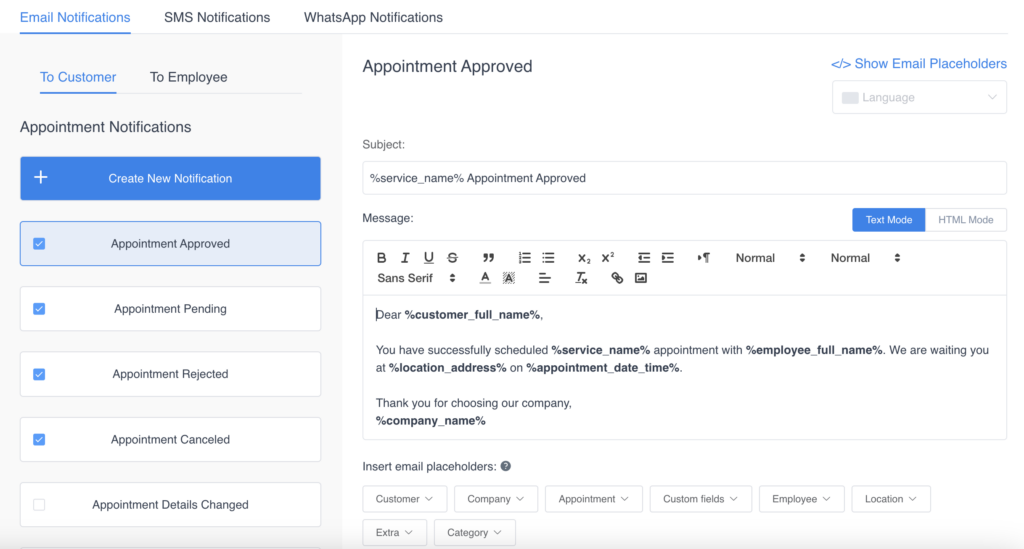
5. Discourage Last-Minute Appointment Cancellations with Deposits
Prebooking payments or deposits are the cornerstone of commitment in the world of appointments. They’re the financial pledges that clients make, indicating their serious intent to show up for their scheduled appointments. For service business owners, prepaid systems significantly reduce the occurrences of no-shows and canceled appointments.
Pro tip: Amelia’s integrated payment system facilitates the collection of deposits or prepayments during the booking process. This financial commitment makes the dreaded canceled appointments a thing of the past, as clients are more inclined to show up for appointments when they’ve paid for them (fully or partially). Amelia’s seamless payment setup ensures a hassle-free process for both clients and businesses, reinforcing commitment and reducing cancellations.
6. Master Waitlist Juggling
A waitlist isn’t just about jotting down names; it’s your proactive strategy for seamless operations. When appointment cancellations strike (as they inevitably do), an efficiently managed waitlist steps up to swiftly fill those vacant slots. It’s your tool to ensure that your schedule stays optimized, gaps are instantly filled, and your business doesn’t miss a beat.
For service business owners, especially those aiming to maximize their booking capacity, mastering the art of waitlist management is crucial. It’s like having a backup plan that keeps your operations at full throttle, ensuring that no potential appointment goes to waste.
How to manage your waitlist effectively?
Effective waitlist management involves a few key steps to ensure it serves as a valuable asset for your business:
1. Seamless Integration with Booking System: Ensure your waitlist seamlessly integrates with your booking system. This integration allows for automatic updates, ensuring that as cancellations occur, the waitlisted clients are promptly notified about available slots.
2. Clear Communication with Waitlisted Clients: Transparently communicate with clients on the waitlist. Notify them about their status, informing them that they’re next in line. Clear communication sets expectations and fosters trust.
3. Timely Notifications and Alerts: Implement a system that sends out real-time notifications or alerts to clients on the waitlist when an appointment becomes available due to a cancellation. This promptness ensures quick responses and efficient scheduling.
4. Priority and Fairness: Establish a fair and structured system for prioritizing clients on the waitlist. It could be based on the order of sign-up or any specific criteria you deem suitable for your business.
5. Optimize Waitlist Capacity: Regularly assess and optimize your waitlist capacity. If it’s consistently long, consider adjusting your scheduling practices or finding ways to accommodate more clients without overburdening your resources.
6. Regular Follow-ups and Updates: Maintain regular communication with clients on the waitlist even if they haven’t secured an appointment yet. Update them on their status, express gratitude for their patience, and assure them that you’re working diligently to accommodate them.
7. Data and Analytics Utilization: Leverage data and analytics from your waitlist. Analyze patterns to understand popular time slots, and the most common reasons for cancellations, and optimize your scheduling strategy accordingly.
8. Flexibility and Adaptability: Stay flexible and adaptable. Sometimes, clients might be unavailable when an appointment opens up. Having a system that allows for quick adjustments and rescheduling ensures maximum utilization of waitlist opportunities.
7. Double Down on Communication
Ever heard of the power of communication? It’s not just about words; it’s your service business’s secret weapon! It’s the art of conveying why appointments are more than mere time slots – they’re the backbone of your business’s success. Picture this: painting a vivid picture for your clients, showcasing how a last-minute cancellation affects not just your schedule but the entire experience for everyone involved.
Pro tip: Consider leveraging booking plugins like Amelia – its automated notifications aren’t just a luxury; they’re your service business’s way to connect with clients. Craft messages that resonate, illustrating why their appointments matter while gently nudging about the ripple effect of cancellations. These aren’t just reminders; they’re your business’s friendly nudge, expressing, “Your time’s precious, just like ours“. It’s about fostering a relationship of trust and reliability.
8. Combat Canceled Appointments with Incentives
Incentives are like magnets that pull clients toward honoring their commitments. They’re not just rewards; they’re your ace in keeping the appointment calendar full and vibrant. Here’s a closer look at why and how they work:
1. Motivating Commitment: Incentives serve as enticing rewards for clients who stick to their appointments. They act as motivators, making clients more inclined to keep their scheduled bookings. It’s the promise of a bonus or a reward that encourages clients to prioritize and honor their appointments.
2. Strengthening Client Loyalty: Offering incentives isn’t just about securing one appointment; it’s about fostering a long-term relationship. When clients receive benefits or rewards for their commitment, they feel valued and appreciated. This builds loyalty, making them more likely to return for future appointments.
3. Reducing Cancellations: By providing incentives, you create a tangible value for keeping appointments. Clients are less inclined to cancel when they know they’ll miss out on a beneficial reward or perk associated with their visit. It acts as a deterrent against last-minute cancellations.
4. Types of Incentives: Incentives can take various forms—discounts on future services, complimentary add-ons, loyalty points, exclusive offers, or even small gifts. Tailoring incentives to match your clients’ preferences and your business model maximizes their effectiveness.
5. Creating a Win-Win Situation: Incentives aren’t just about benefiting clients; they also benefit your business. They encourage repeat business, help in filling appointment slots consistently, and contribute to a positive client experience.
6. Promoting Positive Word-of-Mouth: Satisfied clients who receive incentives are more likely to share their positive experiences with others. This word-of-mouth marketing can attract new clients, further amplifying the benefits of your incentive program.
9. Optimize the Booking Experience
An optimized booking system is the heart of a seamless appointment experience. It’s a user-friendly interface that simplifies scheduling, reduces friction, and ensures a hassle-free process for both clients and service providers. For service business owners, an optimized booking system translates to improved client satisfaction and reduced chances of canceled appointments.
Pro tip: Amelia’s intuitive and customizable booking interface ensures a smooth and stress-free experience for clients. By optimizing the booking process, Amelia minimizes the likelihood of last-minute cancellations stemming from scheduling issues or difficulties navigating the system. This user-centric approach enhances client satisfaction and significantly reduces appointment disruptions.
10. Follow Up Like a Pro
Regular follow-ups are the key to maintaining a lasting connection with your clients beyond their appointments. They’re the thoughtful gestures that show appreciation, gather feedback, and nurture relationships, fostering a sense of loyalty and commitment to future bookings.
Pro tip: Amelia’s post-appointment follow-up feature facilitates automated communication to sustain engagement with clients. By sending personalized follow-up messages, Amelia allows service business owners to express gratitude, gather feedback, and address any concerns clients may have had during their appointments. This continual engagement not only builds rapport but also encourages clients to remain committed to future appointments.
No-Shows vs. Last-Minute Cancellations
Both no-shows and last-minute cancellations are challenges service businesses face, but they differ in their timing and impact:
No-shows
- Timing: No-shows occur when clients fail to appear for their scheduled appointments without prior notice.
- Impact: No-shows disrupt schedules significantly, leaving service providers with empty slots that could have been filled by other clients.
How do you handle a no-show?
- Send appointment reminders.
- Implement pre-paid appointments.
- Identify clients who regularly miss appointments and send them additional reminders.
Last-minute cancellations:
- Timing: Last-minute cancellations happen when clients cancel their appointments close to the scheduled time, often leaving little opportunity for the service provider to fill the slot.
- Impact: While last-minute cancellations allow some time for rescheduling or attempting to fill the slot, they can still disrupt the schedule and may result in lost revenue if the slot remains unfilled.
How do you deal with last-minute cancellations?
- Create a cancellation policy and inform your clients about it.
- Collect a deposit on confirmed bookings.
- Try to reschedule immediately.
How to Reduce Last-Minute Cancellations with Amelia?
Canceled appointments can disrupt schedules, impact revenue, and challenge client relationships. However, armed with a robust set of strategies and the innovative features of Amelia, service business owners can navigate these challenges with confidence.
From implementing reminder systems that keep appointments top of mind to establishing clear policies that foster commitment, each strategy plays a vital role in reducing cancellations and no-shows.
Amelia, with its suite of features and functionalities, acts as a trusted ally, enhancing and complementing these strategies. Through automated reminders, streamlined booking processes, and proactive waitlist management, Amelia empowers service business owners to maintain a reliable and efficient appointment system. The ability to secure commitments through prepayments, reinforce value communication, and sustain engagement via regular follow-ups elevates the client-business relationship and encourages a culture of commitment.
Amelia isn’t just an appointment booking solution – it’s a game-changer for service business owners seeking to minimize cancellations, maximize efficiency, and foster stronger client relationships. By leveraging the power of Amelia alongside these strategic approaches, service-based businesses can create a seamless, reliable, and client-centric appointment management system that propels their success in a competitive landscape.
Canceled Appointments FAQ
How do you handle a last-minute cancellation?
When handling a canceled appointment, promptly acknowledge the cancellation, express understanding, and offer to reschedule the appointment at a convenient time.
What is an appointment cancellation?
Appointment cancellation refers to the act of informing a service provider about the decision not to attend a scheduled appointment or event.
Can you charge for a canceled appointment?
Some businesses have cancellation policies that may include charging a fee for canceled appointments. However, these policies should be communicated clearly and fairly to clients beforehand.
What is the best way to handle a cancellation?
The best approach to handling a cancellation is to respond promptly, express understanding, offer flexibility for rescheduling, and maintain professionalism in communication.
What is a polite business response to clients who cancel appointments?
A polite business response to clients who cancel appointments acknowledges the cancellation, expresses understanding, offers assistance in rescheduling, and maintains a professional and courteous tone.
How do I stop people from canceling my appointments?
While it’s impossible to prevent all appointment cancellations, setting clear and fair appointment policies, sending reminders, offering incentives for commitment, and maintaining open communication can help minimize cancellations.
The post How to Reduce Last-Minute Appointment Cancellations: Tips & Tricks appeared first on Amelia WordPress Booking Plugin.
]]>The post Appointment Confirmation Text: Tips, Examples & Templates appeared first on Amelia WordPress Booking Plugin.
]]>
From ensuring client attendance to reducing no-shows, these messages play a pivotal role. An appointment confirmation text is particularly important if you have a beauty salon, healthcare center, or business that provides any service requiring an appointment. Sending such text helps optimize resources and save time.
In this comprehensive guide, we delve into invaluable tips, real-life examples, and customizable appointment confirmation text templates aimed at perfecting your confirmation text messages, empowering you to foster reliability, efficiency, and a seamless client experience.
What Is an Appointment Confirmation Text?
An appointment confirmation text is a brief message sent to remind clients or employees about meetings, appointments, or events. Its primary purpose is to confirm the details of the upcoming arrangement.
These texts typically include essential information such as the date, time, location, and any specific instructions related to the appointment. They ensure both you and your clients are on the same page, which in turn minimizes the risk of misunderstandings, appointment scheduling mistakes, double bookings, or canceled appointments.
One of the ways to minimize the no-show rate and prevent last-minute appointment cancellations is to learn how to properly utilize confirmation and reminder SMS messages through bulk text messaging, which allows you to reach multiple clients at once. These are sent a few days or even hours before an appointment so that the person can confirm, cancel, or reschedule. All they have to do is follow a link, which saves you a lot of trouble.
Is there any difference between an appointment confirmation text and a meeting confirmation text?
The primary purpose of both an appointment confirmation text and a meeting confirmation text is to confirm the details of an upcoming arrangement. However, there can be slight differences in how they are used:
Appointment confirmation text:
- Often used in healthcare, service industries (like salons, spas, dental offices, etc.), or any scenario where an individual schedules a specific service or consultation.
- Usually involves a one-on-one interaction between a service provider and a client/patient.
- Focuses on confirming the time, date, location, and any specific instructions related to the service.
Meeting confirmation text:
- Commonly used in professional settings, businesses, or corporate environments.
- Typically involves gatherings involving multiple participants, such as team meetings, conferences, or client meetings.
- Besides confirming the time, date, and location, it might also include an agenda, topics to be discussed, or any necessary preparation for the meeting.
While the end goal of both is confirmation, a meeting confirmation text might entail more organizational or logistical details, aiming to ensure that all attendees are prepared and informed about the meeting’s agenda or objectives.
The wording and level of formality might also differ slightly based on the context. However, the core objective of confirming the details and ensuring clarity remains consistent between both types of messages.
How to Write an Effective Appointment Confirmation Text: Tips & Tricks

Image by Freepik
Here are some appointment confirmation text tips that can be useful when creating your own.
Personalize your appointment confirmation text: add the customer’s name
SMS texting is more personal than a phone call or email, as this is how people communicate with friends and family. Hence, we recommend starting with “Hi, John,” if your business is informal. If you want to go for a more formal approach you can always choose “Hello, John Smith”.
The tone should not be the same for a beauty salon, a doctor’s office, or a financial firm. Yet in each case, you should address the client by his or her name. This provides a personalized touch that will help you keep your attendance rate at its best. Also, such an approach will help you customize your appointment confirmation text messages to stay consistent with the tone of your brand.
Then it’s time for the rest of the information. What you will add to your confirmation text and how to do it are described in the next sections.
Introduce yourself properly
Even if a person has booked your service, it doesn’t mean that they know who you are from the text alone. They might not have your number registered among their contacts. Also, they might have appointments with other providers.
Therefore, it’s not a waste of time to add your company’s name to your appointment confirmation text. Thus, the client can recognize you easily and is less likely to dismiss your message.
Collect an opt-in
Before sending appointment confirmation messages, make sure that the person has given you consent. You can collect opt-ins to receive text messages in various ways; clients can fill out a digital form or a printed one in person. Usually, there is an opt-in checkbox available at the time of registration.
Also, make sure that you are complying with the confidentiality regulations in place, and don’t send information to or from third parties or other companies.
Include all the information in your appointment confirmation text: date, time and place
Every appointment confirmation text has the same goal: to remind customers about the place, time, and date of their appointment.
Although this was surely agreed on at the time of booking, we don’t know whether the person has kept all the data. So, it’s a good idea to include at least this information about the upcoming appointment. The following confirmation text speaks for itself:
“Hi, John. This is to remind you of your appointment tomorrow at 2 p.m. with Doctor Hopeson at the General Hospital, located at 1267 24th Street, second floor.”
Confirm important details
At this point, you have to be careful. You don’t want to burden clients with unnecessary details, but you have to give them the basic information.
For example, let them know if they must arrive 10 minutes early if they need to register at the reception, or if they need to bring any important documents with them.
Make sure your SMS appointment confirmation is concise yet informative.
Encourage your customers to confirm appointments
Besides the confirmation option, customers should be able to cancel or reschedule easily. Include a link in your appointment reminders so that they can do this hassle-free, avoiding tiresome phone calls and emails.
For instance, “Dear Mary, this message is to confirm your massage appointment on Wednesday, June 8th at our Hartford branch. To cancel or reschedule, please click here. Otherwise, press ‘A’ to confirm.”
Include an unsubscribe button
While appointment confirmation text messages are useful, not everyone prefers this method. Make sure customers have the option to unsubscribe if they don’t wish to receive any more texts from you.
Include customer support contacts
Don’t forget to include a phone number for client support. Even if they can reply directly to the appointment confirmation text you sent, some customers may feel more comfortable having someone to call if they need help. The following example illustrates this well.
“Dear Mary, you have an appointment on Wednesday, June 8 at the ‘Healthy and Happy’ Hartford branch. Reply to respond or reschedule by calling our office: (111) 456-7890.”
In case you’d like to learn how to create effective email confirmations, read our guide on creating awesome appointment confirmation emails for your clients.
Appointment Confirmation Text Templates and Examples
Here are a few appointment confirmation text templates and examples tailored for various scenarios:
Template 1: Medical appointment confirmation text messages
Here are some appointment confirmation texts to use if you have a medical practice:
“Hi, Julian. This message is to confirm your appointment on June 9th at 2 p.m. This consultation is specially booked for you and Dr. Hopeson. If you need to cancel, please do so 48 hours in advance by texting or calling this number.”
“Hi, Mary. You have been invited to an interview at our ‘Healthy and Happy’ center at 350024th Street. If you have any questions, please call (1111) 567-890. Patricia.”
“Hi, Susan. This is to confirm your appointment with Doctor Hopeson at the Memorial Hospital on June 10th at 2 p.m. Text CONFIRM or CANCEL, and STOP to end.”
“Just confirming your appointment with Dr. [last name] on [date and time] at [place]. Please let us know in advance if you wish to cancel or reschedule. [Business name and contact details].”
“This is [receptionist name] from [clinic’s name] writing to confirm your appointment for a [procedure] with Dr. [last name] on [date and time] at [address].”
“Your appointment with Dr. [last name] is tomorrow at [time]. Please make sure to arrive 10 minutes early. Reschedule or cancel by texting [keyword/digit].”
Template 2: Dentist confirmation texts
In case you’re a dentist, appointment confirmations you could use are:
“Hi, Sarah! Your appointment with our dental hygienist is tomorrow at 2 p.m. at our Woodbury Lane branch. To reschedule, just click here [link].”
“Dear Mary, congratulations on choosing a white and bright smile for this season! We will be expecting you on June 15th at 3 p.m. at our Rangerly branch at 3500 24th Street. Feel free to cancel or reschedule your appointment by calling or texting this number.”
“Dear Mary Johnson. You have an appointment at the Lincoln Dentist Center for a whitening procedure. We will be expecting you on June 13th at 2 p.m. If you cannot make it, please call us at (111) 567-890 to change the date and time of your visit.”
Template 3: Beauty salon appointment confirmation text templates
For beauty salons, a perfect appointment confirmation text could be:
“Hi, Julia! This is Tiffany from the Beauty for the Soul Center. I have received your request for a massage on the 10th of June at 5 p.m. We are really looking forward to your visit! To avoid any no-show fees, make sure to let us know if you need to reschedule. Call this number to reschedule or cancel.”
“Hi, Josephine. You are booked for a haircut at the Beauty for the Soul salon on June 14th at 10 a.m. Need to reschedule? Call (111) 567-890 and let us know a more suitable time for you!”
“Natalia, thank you for booking a haircut at our Beauty for the Soul salon. You are scheduled for 06.06.22 at 2 p.m. Text CANCEL or CONFIRM. To reschedule, call our office at (111) 555-55555. Text STOP to end.”
“Are you ready to look prettier? You are booked for a laser hair removal session tomorrow at 3 p.m. See you tomorrow!”
“Good morning, Kate Miller. This is Sarah Michelle from the Beauty for the Soul salon. You are scheduled for a haircut with Natalia Coleman on June 16th at 3 p.m. If you have any questions regarding this appointment, please reply to this message.”
Template 4: Confirmation SMS for veterinarian practice
Veterinarians should use the following confirmation text examples:
“Dear [name], [pet’s name] has an appointment scheduled with Dr. [last name] on [date and time] on [address]. Please confirm your attendance!”
“Hi, there! [Pet’s name] is scheduled for [his/her] surgery follow-up tomorrow at 2 p.m. We’ll see you there. Call if you want to reschedule and avoid no-show fines!”
“Cookie has a surgery appointment at Willbourg Veterinarians on June 10th at 10 a.m. Reply Yes to confirm or HELP for more options.”
“Hi, Sarah! We are expecting you and Frido tomorrow for his bath! The appointment is at 11 a.m. Do you need to make any changes? Please call us at (111) 444-4444. See you both tomorrow!”
Template 5: Bank confirmation message
Some of the most useful appointment confirmation text templates for banks include:
“Mr. Brooks, this is a message regarding your appointment at Central Bank on July 1st,9 a.m. If you wish to reschedule or cancel, please call this number. Type STOP to end.”
“Good morning, Katherine! This is a quick reminder of your financial consultation at Central Bank at 3478 24th Street. Your appointment is on July 1st at 10 a.m. Text YES to confirm, or call this number to reschedule.”
“Hi, Jason. You have an appointment with our investment advisor, John Smith, on June 24th at 9 a.m. He’ll be expecting you at his office in the Central branch, on the second floor. Please reply to reschedule or cancel.”
“Good Morning, [first name]! You have an appointment on [date and time] at our [branch name] at [address]. Text YES to confirm or call this number to reschedule.”
Template 6: Fitness centers appointment confirmations
Appointment confirmation texts great to use if you are a gym owner are:
“Hello, [first name]! You have a two-hour workout session scheduled for tomorrow at 5 p.m. Call me if you have any questions! [Personal trainer’s name].”
“Hello, [name], this is [personal trainer’s name] at [gym name]. Text YES to confirm your appointment on [date and time]. See you then!”
Template 7: Business meeting confirmation text
For business purposes, a confirmation text should be more formal:
“Dear [Attendee’s Name], this is a reminder of our meeting on [Date] at [Time] at [Location]. The agenda includes [brief overview]. If any changes or queries, please let us know. Reply ‘CONFIRM’ to acknowledge. Thank you!”
“Hi [Client’s Name], Just a quick note to confirm our presentation meeting on [Date] at [Time] at [Location]. We’re excited to showcase our latest project updates and address any queries or concerns you might have. If there’s anything specific you’d like us to cover, feel free to let us know beforehand. Looking forward to a fruitful discussion! Regards, [Your Name/Your Company]”
“Hey Team, Our team collaboration meeting is scheduled for [Date] at [Time] in [Location]. We’ll be discussing upcoming initiatives and brainstorming ideas. Your contributions are vital, so make sure to come prepared. If there’s anything specific you’d like to bring up, feel free to shoot me a message. See you there! Cheers, [Your Name/Team Lead]”
Template 8: Retail businesses confirmation text
If you’re in a retail business, you can go always with a friendly appointment confirmation text:
“Hey, Laura! We received your RSVP for our major sale on June 18th at 5 p.m. at our main branch! We hope you’ll find everything you need, and we’ll see you there!”
“Mary Rivero is scheduled for a dress fitting with [company name] on [date and time]. We’ll be expecting you at our main branch located at [address]. Please don’t leave us hanging! Reply to this message for any changes in your reservation.”
Template 9: Generic confirmation message
If you are looking for a more universal appointment confirmation text, check these out:
“Hello, [client name]. Please text YES to confirm your driving lesson appointment on [date and time]. To cancel, please reply NO. To reschedule, click [link].”
“[Company name] has received your request for full vehicle maintenance. The maintenance will last [duration] and is scheduled for [date and time] at [address]. Reply CONFIRM if you can attend this appointment or HELP if you need to reschedule.”
“Hi, Sophia! We have you booked for a property evaluation appointment on July 2nd at 1 p.m. Text YES to confirm. Phone: (111) 444-4444. Julia Thompson.”
“Hello, [first name], your appointment with [company name] on [date and time] is confirmed under the number [registration number]. You can cancel this appointment through our website. Text STOP to unsubscribe.”
How to Send Appointment Confirmation Text Messages?
While a simple text message confirmation might seem trivial, its impact on enhancing your business is noteworthy. Thoughtfully crafted appointment confirmation texts can make a remarkable difference.
Yet, composing and sending these messages can consume a substantial chunk of your workday. And that’s exactly where automation comes in. Automating appointment confirmation texts is a game-changer for businesses.
First off, it saves heaps of time. Instead of manually sending each confirmation, a system does it for you – quick, efficient, and without the hassle.
Then there’s reliability. Automated texts are consistent. They don’t forget or get busy; they’re always on time. This reliability strengthens trust with clients. They appreciate the prompt reminders and feel assured that you’ve got everything in order.
Reducing no-shows is a big win too. People are more likely to remember and show up when they get a friendly nudge. Fewer no-shows mean better use of your resources and fewer gaps in your schedule.
Plus, it frees up your team to focus on other important tasks. Instead of spending hours typing messages, they can channel their energy into delivering top-notch service or improving your business.
Looking for a seamless way to handle appointment confirmations hassle-free? Meet Amelia.
Keep Your Appointment Confirmation Texts in Check With Amelia
Amelia is a robust WordPress booking plugin built to revolutionize your scheduling process. Say goodbye to the tedium of managing appointment confirmation texts manually. Amelia takes charge of these repetitive tasks, ensuring seamless communication without the hassle.
Its powerful automation capabilities liberate your time, letting you focus on what truly matters – delivering exceptional service and growing your business.
Your clients will never forget about their appointment bookings thanks to Amelia’s easy-to-use email notifications and SMS notifications. Once set up, these notifications will streamline and optimize your appointment confirmation processes, saving you both time and money.
Curious to learn more? Explore Amelia’s impressive array of features to uncover what you’ve been missing. Better yet, witness Amelia in action by visiting the demo page.
So, why wait? Experience the convenience firsthand. Try Amelia today and stay on top of your appointments hassle-free!
Why Should You Automate Your Appointment Confirmations?
Automating appointment confirmation text messages brings several benefits:
- Time Efficiency: Saves significant time by automating the process, freeing up staff to focus on other essential tasks.
- Consistency: Ensures consistent and timely delivery of confirmation messages without human oversight or potential forgetfulness.
- Reduced No-Shows: Reminder messages decrease no-show rates as they serve as gentle prompts for clients to remember their appointments.
- Enhanced Client Communication: Builds trust and reliability with clients by providing timely and consistent communication.
- Streamlined Operations: Automation leads to more organized schedules and smoother operations, reducing the risk of errors.
- Improved Staff Productivity: Allows staff to concentrate on delivering quality service rather than spending time on repetitive administrative tasks.
- Convenience for Clients: Offers clients the convenience of timely confirmations, making their experience smoother and more enjoyable.
- Tracking and Analytics: Provides the opportunity to track responses, gather data, and analyze confirmation rates for better insights into client behavior.
So, Can Appointment Confirmation Texts Elevate Your Business?
Appointment confirmation texts are a crucial step in ensuring that the upcoming appointment really takes place.
By writing text messages to confirm the upcoming appointment, you optimize your workflow and make better use of your resources. Although sending appointment reminders is no guarantee of 100% attendance, they surely reduce absenteeism rates.
Also, automating appointment confirmation messages is a game-changer for businesses seeking efficiency and reliability in their scheduling processes. By leveraging automation, businesses save time, reduce no-shows, and ensure consistent communication with clients.
And that’s exactly what every appointment-based business needs!
FAQ About Appointment Confirmation Text
How do you write an appointment confirmation text?
An effective appointment confirmation text should include essential details like the date, time, location, and any specific instructions. Keep it concise, friendly, and professional. Always personalize when possible, and include a clear call-to-action for confirmation or any necessary actions.
What is a confirmation text message example?
An example of a confirmation text could be: “Hi [Recipient’s Name], just confirming your appointment on [Date] at [Time] at [Location]. Reply ‘YES’ to confirm or ‘REPLY’ with any questions. Thanks!”
How do you announce an appointment?
To announce an appointment, send a brief, informative message including the date, time, location, and any pertinent instructions. Ensure the message is clear and friendly and prompts the recipient for acknowledgment or any necessary actions.
How do I confirm my appointment via text?
Simply reply to the text message you received with the appointment confirmation to confirm your appointment by text. Usually, you’ll be prompted to respond with a particular phrase, such as “YES” or “CONFIRM.” To guarantee that your appointment is successfully confirmed, follow the instructions in the message.
Bonus: Check out these guides as well and amp up your expertise in managing appointments smoothly:
- Automated Email Response: Examples, Templates & Writing Tips
- How to Write an Appointment Confirmation Email + 25 Templates
- Appointment Reminder Text: Tips, Examples & Templates
- The Best Appointment Email Templates You Should Use
- The Most Useful Appointment Excel Templates You Can Use
The post Appointment Confirmation Text: Tips, Examples & Templates appeared first on Amelia WordPress Booking Plugin.
]]>The post Appointment Reminder Text: Tips, Examples & Templates appeared first on Amelia WordPress Booking Plugin.
]]>
Sending appointment reminder text messages to keep clients informed about their scheduled appointments is a practice that is especially important in the service business industry. As almost 90% of people today own a smartphone, companies are learning how to leverage the benefits of technology. They are adopting new technology to perform most of their tasks, including notifying their clients about upcoming appointments with a text message reminder.
In this comprehensive guide, we’ll delve into the art of crafting an effective appointment reminder text. There’s nothing as easy as sending an SMS, so read our brief guide on how to write a perfect text reminder (templates included) and discover the benefits of switching to an automated text message reminder system.
What Is an Appointment Reminder Text?
An appointment reminder text is a concise and timely message sent via SMS or text messaging platforms to individuals scheduled for appointments, meetings, or events. Its primary purpose is to serve as a gentle prompt or notification, reminding recipients of their upcoming commitment.
These texts typically include essential details such as the date, time, location, and any specific instructions related to the appointment. They aim to reduce no-shows, cancellations, or lateness by providing recipients with a convenient and easily accessible reminder, often enhancing overall communication and organization between service providers and their clients.
Is an appointment reminder text the same as a meeting reminder text?
Appointment reminder texts and meeting reminder texts serve similar purposes but are tailored to different contexts.
Appointment reminder texts remind people about their scheduled appointments at places like the doctor’s office, salons, or other services. They help them remember when and where they’re supposed to go and sometimes include what they need to do before the appointment.
Meeting reminder texts remind everyone about upcoming group gatherings, or, more precisely, work meetings. They tell people when and where the meeting is happening, what they’ll talk about, and if there’s anything they need to prepare beforehand.
Both basically help make sure everyone shows up on time and ready for whatever they’ve got planned, whether it’s a personal appointment or a work meeting.
How to Create an Effective Appointment Reminder Text: Tips & Tricks

Image by pch.vector on Freepik
1. Be clear and concise
Keep the reminder brief and to the point. Include essential details such as the date, time, location, and any specific instructions or preparations required. Clarity reduces confusion and ensures the recipient understands the appointment specifics at a glance.
2. Use a friendly tone (when appropriate)
Infuse warmth and friendliness into your message. A welcoming tone helps the recipient feel comfortable and appreciated rather than pressured by the reminder. Politeness goes a long way in fostering a positive relationship. Of course, if you’re writing a meeting reminder text, you should stick to a more formal tone.
Remember, adjust the tone and vocabulary to the type of a reminder text message you’re writing and be mindful of who the recipient is.
3. Include contact information
Provide a contact number or a means to reach out in case of questions, changes, or if the recipient needs to reschedule. Accessibility encourages communication and allows for easy clarification if needed.
4. Personalize when possible
If feasible, personalize your appointment reminder text message by addressing the recipient by name or including specific details about their appointment. Personalization adds a touch of familiarity, making the reminder feel more tailored and relevant.
5. End with a clear call to action
Conclude the text reminder with a straightforward call to action. Encourage the recipient to confirm the appointment by replying to the message or taking any necessary action. A clear directive prompts engagement and reaffirms the appointment.
6. Send timely reminders
Schedule your text reminders appropriately in advance. Ensure the recipient receives the reminder with enough notice to prepare without sending it so early that the appointment slips their mind.
7. Consider timing
Be mindful of the frequency and timing of your appointment or meeting reminders. Sending too many text message reminders can be overwhelming, while infrequent reminders might lead to forgotten appointments. Strike a balance to gently prompt without inundating the recipient.
8. Use a sentence case capitalization
Some companies write their text message reminders in capital letters only. This is not only aesthetically unpleasing but also unprofessional. Keep in mind that even the way you type the message can be a sign of how professional your company is or what tone the customer perceives from your brand.
Capital letters are often perceived as shouting in the online environment. So, it would be best to use a sentence case for your text reminders.
9. Include a no-show policy
Don’t forget to include the no-show policy in your appointment reminder text. This policy is different from one company to another. In some cases, the appointment is simply canceled if the person doesn’t show up. In other cases, financial compensation might be required if a no-show or a late cancellation occurs. Depending on what’s your case, you need to include it in the body of your text message reminder.
Also, include the information on how early the client can come. Usually, the clients should show up at least 5 minutes before the appointment is scheduled.
10. Use of emojis
Don’t be afraid to get a little bit personal and use emojis in your text reminder. Emojis are usually not appropriate for the business world, so avoid them in your meeting reminder texts. However, a simple smiley face will definitely change the tone of that appointment reminder text you are sending.
Only do that if you know you can be a bit friendlier with your customers. If your company is a very professional one, you might want to stay away from emojis in your text reminder messages.
In case you prefer emails, we’ve got you covered – check out this comprehensive guide on how to craft some effective meeting reminder emails and send them to your clients or employees.
Appointment Reminder Text Templates
Here are a few appointment reminder text templates that you can customize to suit various scenarios:
Template 1: Basic Appointment Reminder Text
“Hi [Name], this is a friendly reminder about your appointment with us on [Date] at [Time]. Please remember to [any specific instructions]. If you have any questions or need to reschedule, feel free to reach out to us at [Contact Number]. We look forward to seeing you!”
Template 2: Personalized Text Message Reminder
“Hello [Name], just a quick note to remind you of your upcoming appointment on [Date] at [Time]. Your [service/procedure] is scheduled, and we’re excited to see you! If you need to make any changes or have queries, please contact us at [Contact Number]. Thank you!”
Template 3: Follow-Up Reminder Text
“Hey [Name], hope you’re doing well! We wanted to remind you of your appointment on [Date] at [Time]. Don’t forget to [preparation/task]. Need to adjust the appointment or have any questions? Reach out to us at [Contact Number]. See you soon!”
Template 4: Confirmation Request
“Hi [Name], just a gentle reminder about your appointment with us on [Date] at [Time]. Could you please confirm your attendance by replying ‘Yes’ or calling us at [Contact Number]? Let us know if you need any assistance. Thanks!”
Template 5: Last-Minute Text Reminder
“Hello [Name], this is a last-minute reminder about your appointment tomorrow at [Time]. We’re looking forward to seeing you! In case of any changes or if you need to reschedule, please contact us at [Contact Number]. See you soon!”
How to Send an Appointment Reminder Text Message?
Even though a simple text message might not seem so important at first glance, the fact that a carefully crafted text message reminder can significantly elevate your business will make you look twice.
By using text reminders, you strengthen the bond you have with your customers and make your brand more trustworthy. You reduce no-show rates and cut your losses significantly. Your employees are more efficient because they know they can rely on their schedules.
However, creating and sending appointment reminder texts by yourself has a major drawback: it occupies a significant portion of your working day.
That’s why you need a way to automate the entire appointment reminder process – and Amelia is the perfect solution.
Keep Your Text Reminders in Check With Amelia
Amelia is a powerful booking plugin designed to handle text message reminders flawlessly. It’s designed to keep your appointment reminders on track, ensuring your clients stay informed without overwhelming them.
The best part? You don’t need an extra appointment reminder app. The SMS appointment reminder feature is already integrated so you can set an automatic text message reminder. Whether it’s setting up automated reminders for specific time intervals before appointments or tailoring messages for different types of appointments, Amelia simplifies the process.
The even better part? Amelia is a straightforward, no-nonsense booking calendar plugin that helps you manage your business (and your time).
With its minimal, yet powerful appointment booking interface designed to ease your workflow, automate repetitive tasks, and eliminate double bookings, Amelia makes appointment scheduling a breeze for your customers.
If you are looking for an around-the-clock solution for your WordPress site, check out all the amazing features Amelia has to offer.
So, why wait? Try Amelia today and stay on top of your appointments hassle-free!
The Benefits of Using a Text Reminder
Text reminders have many benefits, and they are not limited to one industry only. Having an automated system that sends text message appointment reminders can be a business savior when used right.
Here are some of the benefits of SMS appointment reminders:
Clients prefer receiving text messages to being called
In a world where technology evolved, and smartphones are no longer used just for calling, people definitely prefer texting over voice calls. The reason behind that is the lack of time or simply the comfort of just reading a text.
That’s why you should opt for sending a simple text reminder to notify your client about the appointment instead of calling them. You will keep the client updated without interrupting them from what they are doing.
You will save time
Another drawback of voice calls is that they take a lot of time, both for you and the client. In business, time is money, as the saying goes. There is no better option to save time than having an automated system for sending appointment reminder text messages.
This way, you will drastically reduce missed appointments and last-moment cancellations, which means you will have more time to focus on other tasks instead of wasting a couple of hours.
Your business will look more professional
Professionalism is one of the key features that people seek when selecting a company. Sending an appointment reminder text is that tiny little detail that makes people think well of your company. Sending such a signal is proof that your company keeps things organized and that you mean serious business.
So, Does Sending Appointment Reminder Texts Benefits Your Business?
Absolutely!
Effective appointment reminder texts are a simple yet powerful tool for ensuring attendance and fostering positive communication. By striking the right balance between clarity, courtesy, and conciseness, these reminders play a crucial role in reducing no-shows and facilitating smoother interactions between you and your clients.
Crafting these messages involves a blend of warmth and professionalism, offering clear information while maintaining a friendly tone. Personalization, appropriate timing, and a clear call-to-action enhance the effectiveness of these reminders, ensuring recipients feel valued and informed.
When composing your text message reminder, the key is to get creative and find the one that goes best with your company’s needs.
Finally, consider switching to a scheduling system that will automate the entire appointment process for you, just like Amelia does – you’ll thank us later.
FAQ About Meeting and Appointment Reminder Texts
How do I text an appointment reminder?
Texting an appointment reminder can be done through various platforms or services designed for business communication. You can use SMS features in customer relationship management (CRM) tools or specific appointment management software or plugin that offers automated text reminders.
Typically, you’ll enter the recipient’s number, compose a concise reminder message, and schedule it for delivery at a suitable time before the appointment.
How do you write a good text reminder?
A good text reminder is clear, concise, and considerate. Include essential details like the date, time, and location of the appointment. Maintain a friendly tone, provide contact information for queries or changes, and always end with a clear call-to-action, such as confirming the appointment or reaching out for assistance.
What is an example of an appointment reminder text?
“Hi [Name], This is a reminder about your appointment with us on [Date] at [Time]. Please remember to [any specific instructions]. If you need to reschedule or have any questions, feel free to reach out at [Contact Number]. We’re looking forward to seeing you!”
How do you write a short appointment reminder text?
Keep a short appointment reminder succinct by including only vital details: date, time, location, and any necessary instructions. For instance: “Hi [Name], Don’t forget your appointment on [Date] at [Time]! See you then!”
How do you politely remind someone about an appointment?
Polite reminders about appointments involve maintaining a friendly and respectful tone in your message. Start with a warm greeting, mention the appointment details briefly, and express your anticipation to meet them. End the message with a courteous closing.
For instance: “Hi [Name], Just a friendly reminder about our appointment tomorrow at [Time]. Looking forward to seeing you then! Best regards.”
What is an example of a gentle reminder message?
“Hi [Name], Just a gentle reminder about our meeting tomorrow at [Time]. Looking forward to catching up!”
What is a friendly text reminder?
A friendly text reminder is one that conveys important information in a warm, approachable manner. It maintains a tone that is welcoming and considerate, ensuring the recipient feels respected and valued. An example could be: “Hello [Name], Just wanted to remind you about our appointment on [Date] at [Time]. See you soon!”
Bonus: Check out these guides as well and amp up your expertise in managing appointments smoothly:
- Automated Email Response: Examples, Templates & Writing Tips
- How to Write an Appointment Confirmation Email + 25 Templates
- Appointment Confirmation Text Examples and Tips
- The Best Appointment Email Templates You Should Use
- The Most Useful Appointment Excel Templates You Can Use
The post Appointment Reminder Text: Tips, Examples & Templates appeared first on Amelia WordPress Booking Plugin.
]]>The post How to Write a Meeting Reminder Email + Templates appeared first on Amelia WordPress Booking Plugin.
]]>To simplify this process and help you create an impactful meeting reminder email, this article will first give you a detailed how-to writing guide, followed by some meeting reminder email template examples that you can adapt to suit your specific needs. They have been designed to provide a clear and concise overview of the meeting’s purpose, agenda, and relevant details, while also conveying a friendly and professional tone.
With the help of these meeting reminder templates, you can streamline your communication process, increase meeting attendance rates, and create a more productive and collaborative work environment.
So, let’s dive in and discover the power of effective meeting reminders to enhance your team’s efficiency and overall success!
What Is a Meeting Reminder?
A meeting reminder is a notification or message that is sent to participants of a scheduled meeting to alert them about the upcoming meeting, its date, time, location (physical or virtual), and any other important details. They have several purposes:
- Time Management: Meeting reminders help participants manage their schedules and allocate time for the upcoming event. This can be especially useful for people with busy calendars or those who have multiple meetings in a day.
- Preparation: A meeting reminder often includes an agenda or a list of topics to be discussed during the meeting. This gives you an opportunity to prepare for the meeting, gather necessary documents or materials, and contribute effectively to the discussion.
- Attendance: Reminders help ensure that participants do not forget about the meeting. In other words, they’re reminded to show up on time. And this is crucial for the productivity of the meeting and to prevent delays caused by late arrivals.
- Virtual Meetings: In the context of virtual meetings conducted through video conferencing tools, a meeting reminder email typically includes links or access details for the virtual meeting platform. This ensures that participants can easily join the meeting online.
- Courtesy: Sending an email reminder is considered a courteous and professional practice, as it demonstrates respect for participants’ time and commitments.
Meeting reminders can be delivered through various means, including email, calendar notifications, SMS (text messages), mobile app notifications, or even automated calendar scheduling tools. The timing of the reminder can vary, but it is usually sent out a day or a few hours before the scheduled meeting time to give participants a heads-up and time to prepare.
Yes, in many cases, the terms “meeting reminder email” and “appointment reminder email” can be used interchangeably. Both types of emails serve the purpose of reminding participants of a scheduled meeting or appointment, providing essential details such as date, time, location, or virtual platform information.
Whether the event is referred to as a meeting or an appointment often depends on the context and the nature of the engagement. Meetings typically refer to business-related discussions, while appointments may include various types of scheduled interactions, such as interviews, consultations, or personal engagements.
In essence, the content and structure of a meeting reminder email and an appointment reminder email are likely to be quite similar, with the primary goal of ensuring that participants are aware of and prepared for the upcoming scheduled interaction.
How to Write a Meeting Reminder Email
Writing an effective and gentle reminder email requires careful consideration of key elements to ensure clarity, professionalism, and engagement. Here are some guidelines you should follow in order to craft the perfect meeting reminder email:
1. Creaft a clear and concise subject line
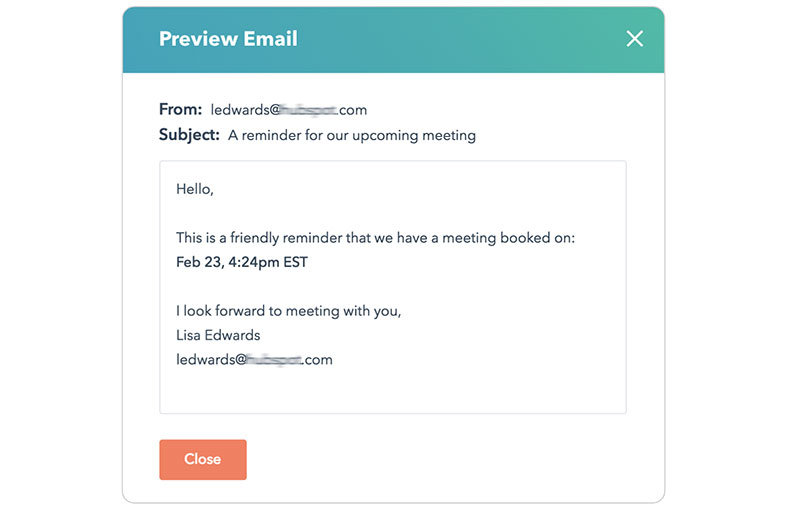
Start your appointment reminder email with a subject line that clearly conveys the purpose of the email. This helps your message stand out in crowded inboxes and increases the likelihood of it being read and acted upon.
Also, keep in mind that recipients probably have more than one upcoming meeting, so you’ll need to be specific. Avoid vague or generic subject lines and instead opt for something specific and informative, such as:
- “Appointment Reminder: [Client Name] – [Date] at [Time]“
- “Don’t Forget: Your [Service] Appointment Tomorrow at [Time]“
- “Important Reminder: [Business Name] Appointment Confirmation Needed“
- “Reminder: [Date] is Your Consultation with [Professional Name]“
- “Last Call: Confirm Your [Service] Appointment by [Deadline]“
- “Reminder: Weekly Team Meeting – Agenda Attached“
2. Include a brief and informative introduction
Begin your reminder email with a friendly greeting and a concise introduction that reminds recipients of the meeting’s purpose. Next, clearly state the date, time, and duration of the meeting to provide a quick overview.
3. Provide a reminder outline
After you’ve greeted the recipient, the meeting reminder email should be short and to the point. That’s why the person is reading it in the first place.
So make sure to outline to the recipient what the meeting is about, even if they already know. After all, this is the point of the reminder – to remind.
4. Recap the agenda
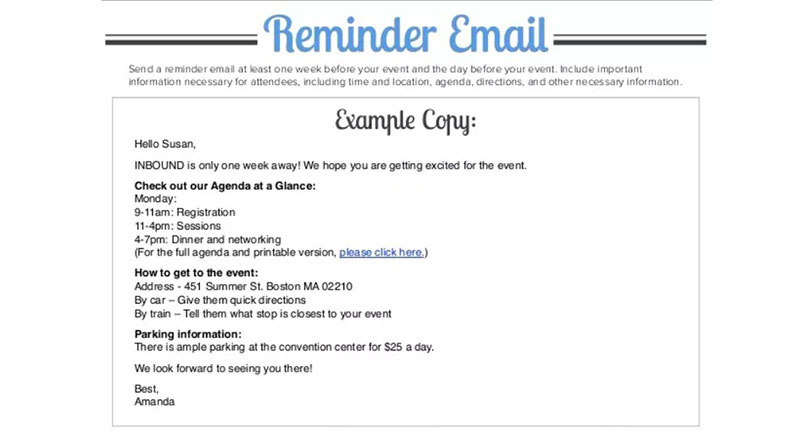
Image source: slideshare
Provide a brief recap of the meeting agenda and highlight the main topics or discussion points that will be covered. This allows participants to mentally prepare. In case there is no agenda set in place, just include the most relevant meeting details.
5. Include any necessary attachments
If there are any relevant materials, documents, or presentations that participants need to review or prepare in advance, attach them to the meeting reminder email. Just ensure the attachments are clearly labeled and easily accessible.
6. Specify the location or virtual platform
If the meeting is held in person, mention the exact location and any relevant instructions or directions. In the case of virtual meetings, include the link or log in details for the online platform you decided to use. The most widely used platforms for online meetings are Google Meet and Zoom.
7. Provide a clear call-to-action
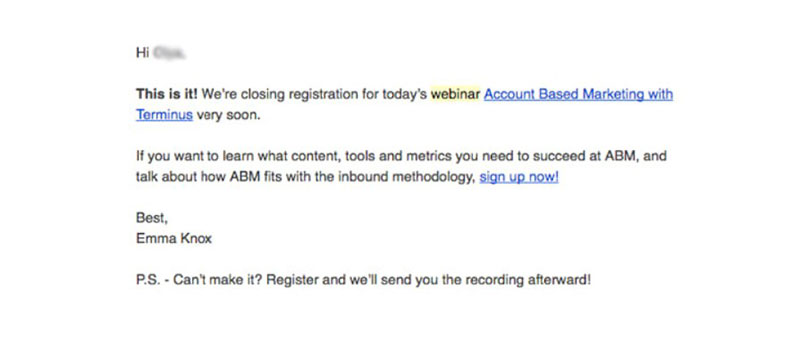
Every meeting reminder template should include a concise and immediately visible CTA.
Clearly state the expected actions from participants, such as reviewing specific documents, preparing reports, or bringing necessary materials to the meeting. You could also encourage recipients to notify you if they are unable to attend rather than just be a no-show.
8. Use a friendly and professional tone
You need to strike a balance between professionalism and friendliness in your tone. That’s why you should use polite language and avoid jargon or technical terms that may confuse recipients. In addition, maintain a positive and approachable attitude throughout the email.
The tone would depend on the circumstance. A business meeting would require a more formal email than an informal gathering, for instance.
9. Include bullet points or numbered lists
Organize the meeting details and important information using bullet points or numbered lists. This helps recipients quickly scan the email and grasp the essential details without feeling overwhelmed by lengthy paragraphs.
10. Personalize when possible
If appropriate, personalize your meeting reminder email template by addressing each recipient by name. This adds a personal touch and shows that you value them.
11. Proofread and edit
Before sending your appointment reminder email, take the time to proofread and edit the content. Check for any grammatical errors, typos, or formatting issues with the help of an AI grammar checker. Ensure that the email is visually appealing and easy to read.
In addition, consider sending a follow-up email after the event occurs.
Meeting Reminder Email Templates and Samples You Could Use
Short meeting reminder email template
Subject: Reminder about Meeting on Marketing Strategy – 11 am on Nov 3
Hi Alex,
I want to remind you about the meeting we have coming up on Wednesday, November 3 at 11am. It will be held in meeting room C (1st floor). We will be going over our marketing strategy for the year. If you have any questions, please let me know.
All the best,
Ralph
This short and simple meeting reminder email is straight to the point, clear, and succinct. It aims to provide a quick refresher, ensuring that participants are aware of the meeting and can plan their schedules accordingly.
Keeping the reminder brief and to the point saves time for both the sender and the recipients. This enables efficient communication and minimizes the risk of overlooking or forgetting important meetings.
Meeting reminder notice
SOCIAL ACTIVITIES COMMITTEE MEETING REMINDER NOTICE
January 30, 2020
To: SAC Members
From: RachelTopp, Head, SAC
Re: Meeting Reminder Notice
The next meeting of the Social Activities Committee will be on: Monday, January 20, 2020, 8am – 9am Court Industries Meeting Room B 88 Bank Road, San Diego, CA 92315. We will go over the upcoming events on the calendar and start planning new events. We will also discuss new applications for our committee and discuss how to obtain funding.
If you have any questions about this meeting, please don’t hesitate to call me at 575.021.6925
This is a more friendly meeting reminder email sample. It includes the date, the subject, the reminder and a meeting agenda.
Scheme meeting reminder email
Level 16, Grand Plaza 2 Beach Rd, Perth WA 6001 GPO Box A3098, Perth WA 6001
Australia T: +61 (0)8 9210 8735 F: +61 (0)8 9210 8734 ABN 18155 619 294
info@pictureentertainment.com.au
www.pictureentertainment.com.au
ASX ANNOUNCEMENT / MEDIA RELEASE 14 February 2019 Scheme Meeting Reminder
As per the ASX announcement released by Picture Entertainment Limited (“Picture” or “the Company”) on 2 January 2019 regarding updates to the Scheme timetable, the Company wishes to remind stakeholders that the meeting which was originally agreed to take place on Thursday 23 February 2019 at 9am AWST at the Picture offices will now take place on Friday 24 February 2019 at 11am AWST at the Picture offices.
You will find the meeting agenda as well as changes to the date and proxy deadline within the Notice of Meeting which will be sent to shareholders after the adjournment of the Scheme Meeting on 24 February 2019.
If you have any questions about these changes, please contact us at shareholders@pictureentertainment.com.au or call us on 1498 002 870 (Australia) or +61 1498 002 870 (outside Australia).
Brad McCormack Personal Assistant to the Director
Essentially, a scheme is an action plan for a policy or company. If a meeting is about an upcoming scheme, then employees receive a scheme reminder email. The format for this is the same as a normal reminder email, except, it mentions the scheme.
Appointment reminder email template with an attachment
From: Brown, Eric
Sent: Friday, November 12, 2017,2:41 PM
Subject: Reminder: BOOM BOX SOUNDS Stakeholder Meeting, December 1, 2017
Attachments: December 1 Logistics.pdf; Dec Imaging Draft Agenda_Updated.pdf
You are receiving this message because you are a stakeholder of BOOM BOX SOUNDS.
Dear BOOM BOX SOUNDS Stakeholder:
This message is a reminder of the BOOM BOX SOUNDS stakeholder meeting on December 1, 2017, at 10:00am in New York.
You will find attached a draft meeting agenda for your review. Please find attached also the summary of logistics. This includes the location of the meeting as well as nearby hotels, train stations, and airports.
By the end of next week, we will send you the other documents. These include the stakeholder comments on the first draft of the Yearly Plan and a confirmed meeting agenda. It is hoped that this will update all stakeholders on the Yearly Plan status even if you cannot attend the meeting in person.
Those who would like to attend the December 1 meeting via web link are requested to contact Eric Brown, BOOM BOX SOUNDS, at ericb@boombox.com or at +3-454-6879-2328 no later than November 19. Stakeholders who wish to link into the meeting online will be sent the instructions to do so.
If you have already confirmed that you will attend in person, no action is required from you.
Thank you!
Eric
This email meeting reminder template has information concerning a meeting update. The subject and the body of the email both include the date and time details. The message maintains a friendly but professional tone so that recipients know what they need to do.
Also, this template gives clear instructions on what to do if you decide to join the web conference virtually.
Simple meeting reminder email example
Subject: Upcoming Meeting Reminder
Dear [NAME, ex. Elenore Archibald],
This email is to remind you that the next [MEETING] is on [DATE] at [TIME] in the [MEETING ROOM OR PLACE AND ADDRESS].
If you can no longer attend this meeting, please let me know. If you would like further information or have any questions for me, please get in touch prior to the meeting.
Kind Regards,
[YOUR NAME, ex. Tanya Peck]
One more short and simple meeting reminder email template that you could use for many different meetings. It has all the necessary details, including the purpose of the meeting and where it’s going to be held.
Formal meeting reminder email
Subject: Reminder: [Meeting Name] on [Date] at [Time]
Dear [Recipient’s Name],
I hope this email finds you well. This is a friendly reminder about our upcoming meeting, [Meeting Name], scheduled for [Date] at [Time]. Please note the meeting location is [Location], and we anticipate it lasting approximately [Duration].
Agenda:
- [Agenda Item 1]
- [Agenda Item 2]
- [Agenda Item 3]
Your participation and input are highly valued. If you have any additional agenda items or require any materials for the meeting, please let us know in advance.
Thank you for your attention, and we look forward to your presence at the meeting.
Best regards,
[Your Name]
[Your Title]
[Your Contact Information]
Virtual appointment reminder email
Subject: Join Our Virtual Meeting: [Meeting Name] on [Date] at [Time]
Hello [Recipient’s Name],
As we prepare for our upcoming virtual meeting, here are the details you need:
Meeting: [Meeting Name] Date: [Date] Time: [Time] Virtual Platform: [Platform Name] Meeting Link: [Link]
Agenda:
- [Agenda Item 1]
- [Agenda Item 2]
- [Agenda Item 3]
Please make sure you have the necessary access to the virtual meeting platform and any relevant documents ready.
Looking forward to a productive online meeting!
Best regards,
[Your Name]
[Your Title]
Team meeting reminder email
Subject: Team Meeting Tomorrow – Let’s Sync Up!
Hi Team,
Just a friendly reminder that our team meeting is scheduled for tomorrow at [Time]. We’ll be gathering in [Location/Virtual Platform] to discuss:
- [Agenda Item 1]
- [Agenda Item 2]
- [Agenda Item 3]
Your active participation and insights are key to our success. If you have any updates or items to add to the agenda, please share them with me before the meeting.
See you there, and let’s have a productive session!
Best regards,
[Your Name]
Client meeting reminder email template
Subject: Important Client Meeting on [Date] at [Time]
Dear [Client’s Name],
I hope you’re doing well. We’re looking forward to our upcoming meeting scheduled for [Date] at [Time]. The meeting will be held at [Location/Virtual Platform] and will cover:
- [Agenda Item 1]
- [Agenda Item 2]
- [Agenda Item 3]
Your insights are invaluable to us, and we’re eager to discuss the agenda items and your expectations.
If there’s anything specific you’d like to address or if you need any additional information, please don’t hesitate to reach out.
Best regards,
[Your Name]
[Your Title]
[Your Contact Information]
Monthly review meeting reminder email
Subject: Monthly Review Meeting – [Date] at [Time]
Hi Team,
Our monthly review meeting is just around the corner on [Date] at [Time]. We’ll gather at [Location/Virtual Platform] to go over:
- [Agenda Item 1]
- [Agenda Item 2]
- [Agenda Item 3]
This meeting helps us reflect on our progress and make improvements. Please come prepared with your insights and suggestions.
Let’s make this month’s meeting a valuable one!
Best regards,
[Your Name]
Why Is It a Good Idea to Use a Tool to Automatize Sending Your Meeting Reminder Emails?
Using tools to automate email reminders offers numerous advantages and can greatly streamline your communication processes.
Firstly, it saves time and effort by eliminating the need to manually send individual reminders. With automation, you can schedule reminders in advance, and the software takes care of sending them at the specified time, ensuring prompt and consistent delivery.
Moreover, sending automated appointment reminder emails reduces the risk of human error, such as forgetting to send reminders or sending them to the wrong recipients. The automation tools and systems can also track and manage responses to your meeting reminder email, making it easier to keep tabs on attendance and follow-up actions.
Finally, automated reminders can be customized with personalized fields, allowing you to address recipients by name and tailor the content based on specific details.
Say goodbye to missed appointments with Amelia
Discover the power of the Amelia booking plugin – your go-to tool for automating meeting reminders and simplifying the entire appointment booking process!
Here’s why Amelia stands out:
 Automated scheduling: Set up seamless booking workflows on your website, allowing clients to schedule appointments effortlessly. Once booked, Amelia automatically dispatches confirmation emails with vital meeting details like date, time, and location.
Automated scheduling: Set up seamless booking workflows on your website, allowing clients to schedule appointments effortlessly. Once booked, Amelia automatically dispatches confirmation emails with vital meeting details like date, time, and location.
 Reminder notifications: Customize automated reminders to go out before scheduled meetings, ensuring participants are always in the loop. Choose the timing that suits you – be it a 24-hour heads-up or a nudge just an hour before the appointment.
Reminder notifications: Customize automated reminders to go out before scheduled meetings, ensuring participants are always in the loop. Choose the timing that suits you – be it a 24-hour heads-up or a nudge just an hour before the appointment.
 Five event notifications: Stay on top of events with Amelia’s five notification types – from bookings and reschedules to cancellations by attendees or admins, and handy next-day reminders.
Five event notifications: Stay on top of events with Amelia’s five notification types – from bookings and reschedules to cancellations by attendees or admins, and handy next-day reminders.
 Personalization: Elevate customer experience by personalizing meeting reminder emails. Amelia’s dynamic fields let you tailor information for each meeting and participant, making communication more engaging and customer-centric.
Personalization: Elevate customer experience by personalizing meeting reminder emails. Amelia’s dynamic fields let you tailor information for each meeting and participant, making communication more engaging and customer-centric.
 Rescheduling and cancellations: Seamlessly handle changes with Amelia. It automates rescheduling notifications, updates calendars, and even suggests alternative time slots. No confusion, just clear communication.
Rescheduling and cancellations: Seamlessly handle changes with Amelia. It automates rescheduling notifications, updates calendars, and even suggests alternative time slots. No confusion, just clear communication.
 Centralized management: Amelia brings all your appointments, reminders, and client details into one organized dashboard. Stay on top of your schedule, track attendance, and manage your appointments with ease.
Centralized management: Amelia brings all your appointments, reminders, and client details into one organized dashboard. Stay on top of your schedule, track attendance, and manage your appointments with ease.
Ready to say goodbye to appointment hassles? Try Amelia today and streamline your booking process effortlessly!
FAQs About Meeting Reminder Emails
1. What information should be included in a meeting reminder email?
A meeting reminder should include the date, time, location, or virtual platform details, agenda, and any relevant documents or materials.
2. When should I send an appointment reminder email?
You should send a meeting reminder email 1-2 days before the scheduled meeting to ensure participants have ample time to prepare.
3. Is it necessary to send a reminder for virtual meetings?
Yes, it’s essential to send appointment reminder emails for virtual meetings to ensure participants are aware of the online platform, have the necessary technology, and are prepared for the virtual format.
4. What should I do if someone doesn’t confirm attendance after receiving the meeting reminder email?
Follow up with the individual directly through email or a quick call to confirm their attendance or address any concerns they may have.
5. Should I send meeting reminders for internal team meetings?
Yes, meeting reminders are valuable for internal team meetings as they help maintain attendance, keep everyone on the same page, and ensure effective collaboration.
6. How can I personalize appointment reminder emails for different recipients?
Personalize appointment reminder emails by addressing recipients by name, acknowledging their specific role or contribution, and tailoring any additional information based on their involvement in the meeting.
7. What is the best format for a meeting reminder email?
A clear and concise format is best, including bulleted key information, a friendly tone, and any relevant attachments or links. Also, use a professional email template for consistency.
8. How do I handle rescheduling in a meeting reminder email?
Clearly communicate the change, provide the new date and time, and apologize for any inconvenience. Moreover, ensure participants confirm their availability for the rescheduled meeting.
9. Is it appropriate to include an agenda in a meeting reminder email?
Yes, including an agenda in the meeting reminder email helps participants prepare for the discussion, sets expectations, and allows them to contribute more effectively during the meeting.
10. Can I customize the message or tone of the appointment reminder email?
You can tailor the message or tone of the meeting reminder using a number of meeting and calendar tools. Also, you can always customize the wording, tone, or format of your meeting reminder template message.
If you enjoyed reading this article and find these meeting reminder email templates useful, you should check out this one on creating a meeting checklist.
We also wrote about a few related subjects:
- Automated Email Response: Examples, Templates & Writing Tips
- A Text Message Reminder: Benefits & Templates
- The Best Appointment Email Templates You Should Use
- The Most Useful Appointment Appointment Excel Templates
- Appointment Confirmation Text Examples and Tips for Writing One
- How to Write an Appointment Confirmation Email
- The Best Meeting Scheduler Apps
The post How to Write a Meeting Reminder Email + Templates appeared first on Amelia WordPress Booking Plugin.
]]>